By KELLY GARCIA 16



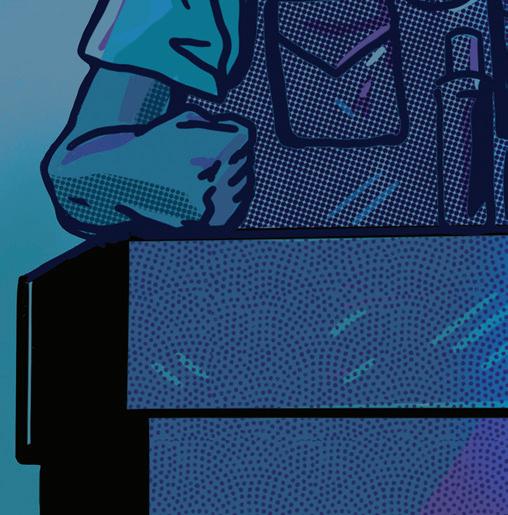







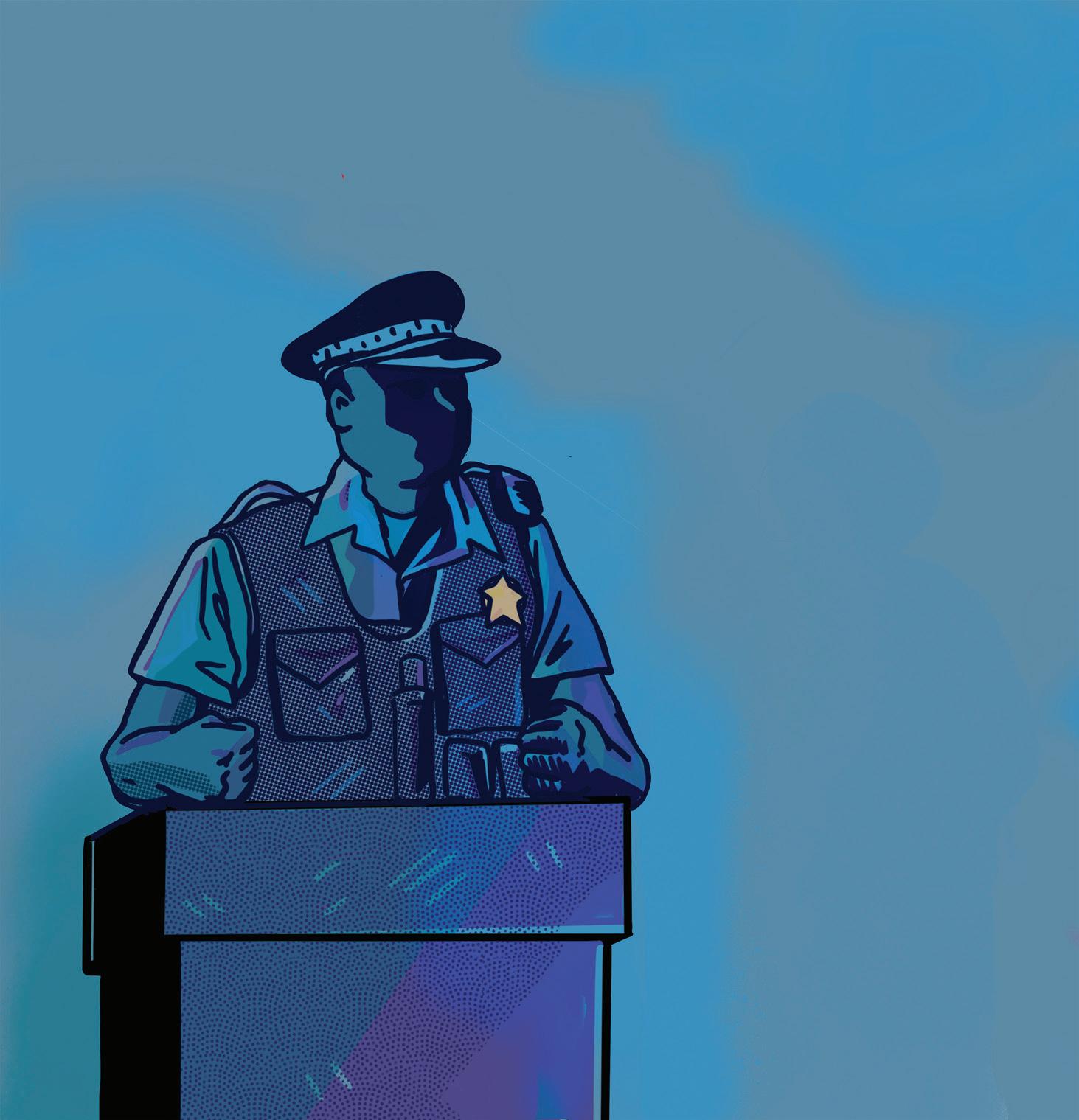 CPD officer and mayoral candidate Frederick Collins has over 40 misconduct complaints in his record.
CPD officer and mayoral candidate Frederick Collins has over 40 misconduct complaints in his record.
FREE AND FREAKY SINCE 1971 | SEPTEMBER 1, 2022 THE COP THE COP MAYOR MAYOR MAYOR who would be who would be WINDY CITY TIMES Quarterly insert inside! A History of Guaranteed Income 14 | Sandra Cisneros 20 | Chicago Jazz Fest 30
CITY LIFE
04 People A long-established Chicago martial arts school is run by a uniquely experienced grandmaster.
18 Garcia | Police CPD officer and mayoral candidate Frederick Collins has over 40 misconduct complaints on his record.
overachiever angst, and Blank Theatre revives Jazz Age homage The Wild Party
FILM
28 Movies of Note Funny Pages is an earnest ode to the obsessives, Honk for Jesus. Save Your Soul. implicates everyone in a Southern Baptist church, and Me Time just ends up wasting yours.
CHICAGO READER | SEPTEMBER 1, 2022 | VOLUME 51, NUMBER 24
TO CONTACT ANY READER EMPLOYEE, EMAIL: (FIRST INITIAL)(LAST NAME) @CHICAGOREADER.COM
42 Shows and Records of Note Previews of concerts including Sidi Wacho, Yola, and the Scorched Tundra festival, plus reviews of releases by Santigold, Dorothy Carlos, Born Under a Rhyming Planet, and more
46 Early Warnings New concerts and other updated listings
PUBLISHER AND PRESIDENT TRACY BAIM
MANAGING EDITOR SALEM COLLO-JULIN
PRODUCTION MANAGER KIRK WILLIAMSON
SENIOR GRAPHIC DESIGNER AMBER HUFF STORY EDITOR SUJAY KUMAR NEWS EDITOR JIM DALEY
THEATER AND DANCE EDITOR KERRY REID MUSIC EDITOR PHILIP MONTORO
CULTURE EDITOR WITH FOCUS ON MEDIA, FOOD, AND DRINK TARYN ALLEN ASSOCIATE EDITOR AND BRANDED
CONTENT SPECIALIST JAMIE LUDWIG
SENIOR WRITERS LEOR GALIL, DEANNA ISAACS, BEN JORAVSKY, MIKE SULA
STAFF WRITERS DEBBIE-MARIE BROWN, KELLY GARCIA, KATIE PROUT
AUDIENCE ENGAGEMENT MANAGER YASMIN ZACARIA MIKHAIEL
ARTS & CULTURE
19 Books Printers Row Lit Fest embraces Chicago’s writers.

20 Poetry Sandra Cisneros feels the love of the universe.
THEATER
22 Preview Disability takes center stage in Babes With Blades’s Richard III
FOOD & DRINK

08 Sula | Feature Pastry chef Ollyvia Putri’s 20-layer cakes are legit.
COMMENTARY
12 Joravsky | Politics All the usual TIF lies come out on both sides in the debate for and against the Red Line extension.
NEWS & POLITICS
14 City Bureau The push to solve poverty through guaranteed income is nearly a century old.
24 Stage Pictures James Sherman talks about the historical inspirations for his newest play.
26 Plays of Note Girlfriend hits the (Matthew) Sweet spot, BoHo’s National Merit taps into
MUSIC & NIGHTLIFE

30 Guide A er two pandemic years off, the Chicago Jazz Festival returns to Millennium Park with a bill full of crowd-pleasers and chance-takers.
34 Jukebox New and upcoming records by Chicago acts booked at this weekend’s Jazz Festival
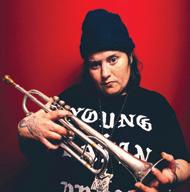
36 Obit Jazz trumpeter Jaimie Branch’s tragically early death has deprived the world of a generous, good-humored soul and decades of her thrilling and powerful music.
38 Priorities How parenthood and the 2020 uprisings impacted Tiara Déshané’s approach to music
40 Chicagoans of Note Anna-Michal Paul, chalk artist extraordinaire
46 Gossip Wolf Siul Reynoso of Los Gold Fires drops a supremely summery new single as Gabacho, the second annual Rockwell Street Stroll brings top-shelf blues and jazz to Burning Bush Brewery, and art-rock duo So and Dumb celebrate a new self-titled album.
SAVAGE LOVE
49 Boyfriends Dan Savage reminds a reader that you can’t always smother romantic feelings.
CLASSIFIEDS
Jobs
ON THE COVER: ILLUSTRATION BY DAVID ALVARADO. FOR MORE OF ALVARADO’S WORK, GO TO @TUFFASAURUS ON INSTAGRAM.
A NOTE FROM AN EDITOR
WE’RE CLOSE TO the end of “Volume 51” in a few issues. Yes, that means that we have survived nearly 51 years of publication, a feat that perhaps no one imagined might happen when we first started in 1971.
For someone like me, a native Chicagoan who is themselves headed to just shy of 50 (all right, 48) this month, it’s so improbable that something like the Reader still exists. It’s a forum for intelligent writing, covering the important stu like government shenanigans, battles between police and citizenry, new worlds of music, cinema, and theater, all wrapped up in a totally free to read package. Très 70s of us, no? Our coverage is an attempt to show you the soul of what Chicago really is.
We often find that the issues we write about (like income woes, wrongful convictions, a lack of equity within our neighborhoods, health care) are issues that someone writing for the Reader in the past also tackled. But we are hopeful for new solutions to these old problems.


The guaranteed income program described on page 14 is one such possibility. And sometimes we echo our past. Kelly Garcia’s cover story on a mayoral candidate with an unsavory record could time travel into countless past election cycles. Unfortunately, people who want to assert unnecessary amounts of power in their public and personal lives are still attracted to our City Hall—go figure.
When contributor Isa Giallorenzo pitched a story on Hyun’s Hapkido School in Bucktown, I was plagued with the thought, “why do I know these people?” It turns out that my Uncle Rob trained with Grandmaster Hyun in the 80s, alongside his friend Michael Kiefer, who wrote about Hyun and his school for the Reader in 1982. I remember as a kid hearing from Uncle Rob, “I’ve got this friend Kiefer, he’s a writer, he even wrote for the Chicago Reader!” As we all get older, it’s nice to see that some of these legacies still thrive.
—SALEM COLLO-JULIN, MANAGING EDITOR
LISTINGS COORDINATOR MICCO CAPORALE
VICE PRESIDENT OF OPERATIONS ANN SCHOLHAMER
DIRECTOR OF DIGITAL JOHN DUNLEVY
DIRECTOR OF MARKETING VIVIAN GONZALEZ MARKETING PROJECT STRATEGIST SHAWNEE DAY
DIRECTORS OF CIMA SAVANNAH HUGUELEY, YAZMIN DOMINGUEZ
EXECUTIVE ASSISTANT SANDRA L. KLEIN
ADVERTISING 312-392-2970, ADS@CHICAGOREADER.COM
CLASSIFIEDS: CLASSIFIED-ADS@CHICAGOREADER.COM
VICE PRESIDENT OF SALES AND BUSINESS DEVELOPMENT AMBER NETTLES
VICE PRESIDENT OF SALES AMY MATHENY SALES TEAM VANESSA FLEMING, TIM OGDEN, TED PIEKARZ, WILL ROGERS DIGITAL SALES ASSOCIATE AYANA ROLLING
NATIONAL ADVERTISING VOICE MEDIA GROUP 1-888-278-9866 VMGADVERTISING.COM JOE LARKIN AND SUE BELAIR
DISTRIBUTION CONCERNS distributionissues@chicagoreader.com 312-392-2970
READER INSTITUTE FOR COMMUNITY JOURNALISM, INC. CHAIRWOMAN EILEEN RHODES
ACTING SECRETARY KIM L. HUNT DIRECTORS ALISON CUDDY, VANESSA FERNANDEZ, ROBERT REITER
READER (ISSN 1096-6919) IS PUBLISHED BIWEEKLY BY THE READER INSTITUTE FOR COMMUNITY JOURNALISM 2930 S. MICHIGAN, SUITE 102 CHICAGO, IL 60616 312-392-2934, CHICAGOREADER.COM
COPYRIGHT © 2022 CHICAGO READER
PERIODICAL POSTAGE PAID AT CHICAGO, IL
ALL RIGHTS RESERVED. CHICAGO READER, READER, AND REVERSED R: REGISTERED TRADEMARKS ®
2 CHICAGO READER - SEPTEMBER 1, 2022 ll
48
THIS WEEK
IN THIS ISSUE

SEPTEMBER 1, 2022 - CHICAGO READER 3
CITY LIFE
People













Strong and steady
A long-established Chicago martial arts school is run by a uniquely experienced grandmaster.

 By ISA GIALLORENZO
By ISA GIALLORENZO


Modernity and tradition. Relaxation and tension. Chaos and order. Yin and yang—roughly speaking. These are complementary universal forces that can easily lose balance and therefore create trouble. But not at Hyun’s Hapkido, Tae Kwon Do, and Self-Defense School, a Bucktown martial arts storefront rooted in the same location for over 50 years; an unexpected harmony permeates the air in the school’s children-filled, sundrenched, and action-packed quarters. That is thanks to Hyun’s owner and founder Grandmaster Kwang Seek Hyun, 77, who manages his business and its culture with a firm yet gentle hand. Anyone who needs some respite from a world saturated with screens and populated by people with bad manners will benefit from the old-school approach promoted by Grandmaster Hyun and his disciples. “In class, I always say that in order for you to become a martial artist, you must first have humility, righteousness, etiquette, wisdom, and sincerity. You need these five qualities to become the perfect martial artist or self-defender,” says Grandmaster Hyun, who values the mental aspects of his training as much as the physical ones. “Without confidence and alertness, there’s no self-defense,” he says.







That confidence is practiced early on, as soon as Hyun addresses his prospective young students. When Hyun asks a question,
SCHOOL


2743 N. Western, 773 252 8300, hyunshapkido.com
he encourages kids to look straight into his eyes, speak loud and clear, and add a “sir” right after their answer. That is his fi rst lesson right there, and it sets the tone for an environment where elders and instructors are thoroughly respected. There’s no place for improper behavior at Hyun’s school; kids who don’t follow the rules are simply not allowed in the classroom.
Respecting and loving oneself is also highly encouraged: it is actually Hyun’s fi rst rule. “If you can’t love yourself, you can’t follow any of the other rules,” he says. With that kind of assertive posture, it is much easier to command respect and keep the bullies away.
Hyun also teaches his students to stay alert and avoid trouble whenever possible: “Once you have confidence, you can see clearly they cannot hurt you, so you can walk away very easily and not feel bad about it. On the other hand, people who are not confident enough want to fi ght back. For example, if a five-yearold boy bothers you, you simply move away. But if someone your age bothers you, you want to fight back because your confidence level dropped,” Hyun explains.
Calm confidence is exactly what Hyun conveys, but that might come naturally for someone who is a tenth-degree black belt in hapkido. According to Hyun, he’s the only one in the world to have achieved that degree.
Hapkido loosely translates to “the art of coordinated power,” and is a Korean martial art specifically designed for self-defense. Hence Hyun’s school’s motto (as seen on a well-loved sign that hung for years outside the school’s Western Avenue location): “martial art . . . not sport.” In Hapkido, a fi ghter will do whatever he can to subdue his opponent—nothing is out of bounds. Hyun informs me that hapkido “seeks not to overpower an attacker with strength, but with
4 CHICAGO READER - SEPTEMBER 1, 2022 ll
HYUN’S HAPKIDO, TAE KWON DO, AND SELFDEFENSE
Grandmaster Hyun was photographed in this pose for the Reader 40 years ago. ISA GIALLORENZO

SEPTEMBER 1, 2022 - CHICAGO READER 5
continued from 4
techniques that turn an attacker’s force back on himself.” It includes elements from other martial arts such as kicks and punches from karate, joint-locking techniques like aikido, and throws like the ones used in jiujitsu and judo, making it the original mixed martial art.
“It focuses on the psychology of the street fighter, making it a practical martial art for city dwellers,” Hyun advertises in his brochure. It is also great for self-defense for women, and for police and correction o cers, of whom Hyun has trained plenty.
Hyun still teaches hapkido to the teens and adults who attend his school (along with other instructors), but children go to a different area to learn tae kwon do with 46-year-old Kenneth Jeffries. Hyun likes to keep the two groups fairly separate to give the adults some rest. Tae kwon do means “the art of foot and hand techniques,” and lends itself to a safer practice for the little ones. A no-nonsense kind of person, Jeffries keeps his students in line and busy throughout the class. According to him, besides kicking, blocking, and punching, students also learn respect, courtesy, and self-control.

Grandmaster Hyun himself started studying hapkido early on, back in Korea when he was 13 years old. At 13, he also met his wife Joanne Hyun, now 77. The Hyuns have two children, one of whom is a law professor. He later went on to study music at the Seoul National University and served in the Republic of Korea Air Force as a self-defense instructor before coming to the States in 1969.
Hyun was invited here to teach martial arts at Carroll University in Wisconsin, but soon found his way to Chicago: “I’d been working [at Carroll] for about a year, but I really wanted to train the police department in Cook County. So I got a good recommendation letter from the dean, but during my interview with the police department, they said they didn’t have a budget for me. I told them I’d teach for free for a year, and I did. Once they had a budget they hired me, and I trained the Cook County Sheriff’s Police Academy Department for about 15 years. I always say that criminals never get old, but police o cers do. So they’d better be in good shape,” Hyun prescribes.
In 1971 Hyun opened his fi rst school, in the same location he’s still at. His walls are covered with memorabilia from various honors he’s received from so many years of service. His promotional materials include multiple newspaper and magazine articles he’s been featured in, including two from the Reader in the early 80s. In one of them, reporter Michael Kiefer perfectly defines the object of martial arts: “[It] is not breaking bricks and is not intimidating others. The object is self-confidence and self-control, physical conditioning, and relaxation. The object is to be alert, to be ready without being paranoid, to learn how to take the crap the world has to o er without striking out before you have to.” Or, as Grandmaster Hyun wisely put it: “I avoid dog poop not because I’m afraid of it, but because it stinks.” v

6 CHICAGO READER - SEPTEMBER 1, 2022 ll
@chicagolooks CITY LIFE BACK AGAIN SUMMER 2022! RSVP FOR Fr TODAY! LoopChicago.com/Sundays #SundaysOnState SCAN ME “Best New Event of the Year” — Time Out Chicago, 2021 SEPTEMBER 4 EVENT SPONSORS SUPPORTING SPONSORS PARTNERS A PROJECT OF:
his offi ce door,
with a
of him
Hyun
at
decorated
1980 photo
mid-fi ght.
ISA GIALLORENZO
Hyun proudly shows off his hapkido tenth-degree black belt certifi cate. ISA GIALLORENZO



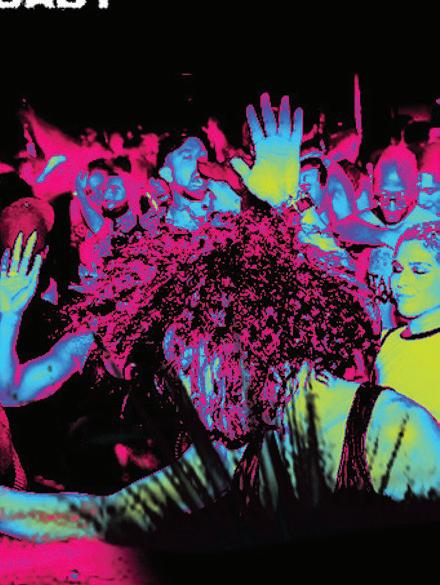


SEPTEMBER 1, 2022 - CHICAGO READER 7 Visit Ravinia.org SATURDAY, SEPTEMBER 17, 2022 SATURDAY, SEPTEMBER 17, 2022 SATURDAY, SEPTEMBER 17, 2022
FEATURE
Pastry chef Ollyvia Putri’s 20-layer cakes are legit
Her Lapis312 is the go-to U.S. supplier of labor-intensive cakes and cookies to Indonesian expats.

 By MIKE SULA
By MIKE SULA
Ollyvia Putri insists on only canned Wijsman sweetcream salted butter for her bacon cake.
“I cannot change that,” she says of the imported Dutch butter. “My grandma would kill me.”
“For problem-free use in tropical countries,” the distinctive red cans of Wijsman can run up to $10 for less than half a pound. But that’s not the only reason Putri’s buttery 20layer kue lapis legit, aka “dense layers cake,” aka spekeok, aka “bacon cake,” sells for $88 apiece. Each one requires about four hours to build, its successive batter strata spread thinly and baked individually, pulled from the oven,
and pressed with melted butter, all on repeat until the result is something the Dutch colonial housewives in Jakarta—in their attempts to recreate cylindrical baumkuchen, or spit cake—thought looked like slabs of pork belly.
“They say it’s the layers, but I think it’s because of the amount of fat in it,” says Putri, who makes the cakes four at a time out of a Naperville shared kitchen. These she sells mostly online in four flavors—along with a variety of Indonesian cookies—under the handle Lapis312.
Given the volume she moves—she ships to all 50 states—Putri is arguably the queen of kue lapis legit in America. Her sister Marcella,
with whom she opened a pastry shop in Singapore, is her southeast Asian analogue. But they owe it all to their late grandmother who passed the recipe on to them. “My grandma was a great cook,” says Putri. But “growing up I did not care much about cooking or baking. I was just an eater.”
It wasn’t until she was a junior engineering student at the University of Michigan that she caught a fever for pastry, eating exam stress by baking cupcakes and tiramisu for friends. “I was very fortunate to have my parents’ support,” she says. “I guess being the youngest I didn’t have any burdens or anything, and they allowed me to go to pastry school.”
That’s how she wound up in Chicago studying under Sébastien Canone and Jacquy Pfei er at the French Pastry School. “I didn’t really know any fancy technique like chocolate work or sugar work,” she says. “Going to school really opened up my eyes.” After graduating she worked for a year under another instructor at the Peninsula—then-executive pastry chef Dimitri Fayard—and then landed a two-month stage in Paris at the pinnacle of French pastry and chocolate: Pierre Hermé, rotating through all the kitchen stations in the renowned patisserie.
In 2015 she returned to Singapore where she opened Ollella with her sister, specializing in French choux pastry and kue lapis legit (not to be confused with the multicolored steamed rice flour kue lapis sagu, which Marcella now o ers). “My sister really wanted to incorporate Indonesian pastries and my grandma’s legacy,” she says. “Other than us no one would have continued making kue lapis because it’s such a crazy cake to make,” she says. “I think the process is a dying tradition. The younger generation doesn’t have the time nor patience to make traditional cakes. And given how labor intensive kue lapis is, it is not a common cake to be made at home to begin with.”
They sold traditional kue lapis legit, spiced with cardamom, cinnamon, cloves, and a “secret” fourth—popular with the old folks— along with the unspiced “butter” variety for the youngsters; and another common variety made with prunes, each layer of the latter two misted with dark rum. But they wanted to make a mark. “At that point in time there weren’t many funky flavors of kue lapis. It’s quite an expensive cake to play with. We definitely wanted to make a chocolate version, but everyone loves Nutella and I thought it will make for prettier layers. It was a huge hit; our second bestseller behind butter.”
In 2018 Putri married and returned to Chicago where her husband worked. “It’s been awhile since I worked for someone else, so I decided to start something on my own. I saw there was a need for good lapis in the U.S.”
She tested the recipes in her home kitchen, adjusted to North American ingredients, but realized there was no substitute for the 82 percent butterfat Wijsman. “When you open it it kind of smells like a very mild cheese,” she
8 CHICAGO READER - SEPTEMBER 1, 2022 ll FOOD & DRINK
Ollyvia Putri and her kue lapis legit JEFF MARINI
Find more one-of-a-kind Chicago food and drink content at chicagoreader.com/food.
says. “But it’s not as oily as a normal European butter.”

She posted her cakes for sale on expat Facebook groups and set up a table at the annual consulate-sponsored Indonesian Independence celebration. Word quickly spread among Indonesian, Singaporean, and Malaysian communities across the country. Before long more than half her online orders were coming from the coasts, LA, San Francisco, Seattle, New York, and Philadelphia. Her business exploded after COVID hit, when folks couldn’t travel home to get their kue lapis legit fix. Today more than 80 percent of her orders come from out of state.
Putri also introduced sweet and savory cookies typically eaten on holidays like Chinese New Year and Eid. Nastar are orbs of crumbly shortbread-like dough encrusting deposits of pineapple jam spiced with clove and cinnamon. Sagu keju are savory gluten-free rosettes made with cassava flour roasted with fragrant pandan leaf and mixed with cheddar cheese. She recently introduced a favorite: her grandmother’s kastengel, fingers of short-
FOOD & DRINK

The Cats Renounce Their Origin

Our cats no longer want to be called Russian Blues since Russia’s invaded Ukraine for over one-hundred days & counting. They sense my love & I are no czar & czarina & they feel no lineage to their native land.

What if we dub them Ukrainian Blues as an act of solidarity like Ukrainian flags hanging out from American apartment windows & businesses & churches?
Do cats even need a country of origin as labels? What if we just called them Graybacks or Kind-of-Blues? Our cats: a pair of American blurs of fur who renounce Mother Russia & pounce on mouses stuffed w/catnip.
They meow Free Brittney Griner! whom we saw live & in-person playing in the WNBA Finals & we cheered when her team lost to the Chicago Sky, our hometown team. It was the last time BG played on a WNBA court before she flew to Russia to play for a team which pays her more than American soil courts despite the rise in league ratings & attendance & sponsorships & before she was detained for over one-hundred days & counting & sentenced to nine years in a penal colony for allegedly smuggling hashish oil. They meow Bring BG home!
They meow F*ck Putin! after puking up a clump of wet gray hairs & chunks of dry food on hardwood floors then sniff & lick their buttholes from the comfort of our bed.
bread baked with edam cheese.
“That one’s personal to me because when we grew up she used to make nastar and kastengel a lot, especially for Chinese New Year. It’s really something you can keep popping in your mouth.”
Putri recently offered her whole line of treats at a Monday Night Foodball pop-up, the Reader ’s weekly guest chef series at the Kedzie Inn in Irving Park. You can always order online, but the only regular local retail outlet that stocks them is the Indonesian market Waroeng in Schaumburg, where she also sells her kaya: pandan-infused coconut jam, typically eaten on toast for breakfast.

When you consider that she simmers coconut, eggs, and caramelized sugar for more than three hours to achieve its exact custardy consistency, a drive to the western suburbs doesn’t seem too much of a burden. “You have to cook it low and slow and keep stirring it,” she says. “But everything good is always labor-intensive.” v
@MikeSula
 By Jacob Saenz
By Jacob Saenz
One rubs on my leg as I write this while a commercial plane soars overhead. Meanwhile, in Ukraine, a warplane launches more bombs & missiles down on buildings & civilians cast as collateral damage by state-sponsored messaging. The cat plops on the floor & yowls w/its belly up, ready for a rubdown.

SEPTEMBER 1, 2022 - CHICAGO READER 9 R TK INFOBOXHED | $$$ TK infoboxbody
A variety of Lapis312 treats JEFF MARINI
Jacob Saenz is the author of Throwing the Crown, winner of the APR/Honickman First Book Prize. His poetry has appeared in American Poetry Review, Memorious, PANK, RHINO, Tammy and other journals. A CantoMundo fellow, he’s been the recipient of a Letras Latinas Residency, a Ruth Lilly Poetry Fellowship and a Latinx Scholarship from the Frost Place.
A biweekly series curated by the Chicago Reader and sponsored by the Poetry Foundation.
Free Programming from the Poetry Foundation! Learn more at PoetryFoundation.org Hours Wednesday, Friday, and Saturday: 11:00 AM–4:00 PM Thursday: 11:00 AM–8:00 PM Open Door Reading: Jared Brown, Stevie Cisneros Hanley, Briana Lynn & Mila Methvin The Open Door series highlights creative relationships in Chicago, including mentorship and collaboration. Thursday, September 8, 7:00 PM
Chicago Performs is a new annual event hosted by the Museum of Contemporary Art that spotlights exciting local artists while showcasing the city’s rich and vital creative landscape. Envisioned as a way to provide a national platform to Chicago artists as they reach the next phase of their careers, the inaugural edition of the two-day event (which takes place September 15 and 16) welcomes three artists from across the city: theater art ist Derek Lee McPhatter, visual and performance artist Bimbola Akinbola, and choreographer Erin Kilmurray. In her curator’s note, the MCA’s Tara Aisha Willis says that while Akinbola, McPhatter, and Kilmurray create using different mediums, their Chicago Performs works all address questions that face us all in the complicat ed, post-pandemic world of 2022: “What is resilience and what are strategies for creating it—in the moment amongst each other when we gather, and when we imagine potential futures?” But while each performance touches on challenges and hardships, they are also unit ed in their fearless embrace of joy and community.
To that extent, Chicago Performs offers all who attend a chance to feel the joy themselves. Along with immers ing in each artist’s temporary universe—McPhatter’s futuristic rock opera, Kilmurray’s world-building dance performance, and Akinbola’s seven-hour Electric Slide marathon—attendees are invited to attend an artist panel discussion moderated by Tempestt Hazel, take their time exploring the MCA’s galleries (including “Nick Cave: Forothermore”, a career-spanning retrospective of the Chicago artist), enjoy a special happy hour at Marisol Restaurant & Bar, and get their groove on in an explosive closing-night dance party with DJ Sadie Woods.
Read on to meet the talented local artists of Chicago Performs. For more about the festivities, or to purchase a two-day pass for $30 or a single-day pass for $20, visit visit.mcachicago.org/chicago-performs-2022.
Derek Lee McPhatter
When Chicago theater artist Derek Lee McPhatter looked for inspiration for his new rock opera Water Riot in Beta, he gravitated toward the lakefront park just blocks from his home in Bronzeville. “My project is about water scarcity, and thinking of Lake Michigan as a body of water we need to be connected to in the future, so I [came] out to connect to it as I [wrote].” Along with the lake, the park also offers views of Chicago from its largely white north side to its largely Black south side—a visual reminder of the precarious relationship between man and nature, and the city’s ongoing struggles with

Those themes converge in Water Riot, the first instal lation of a triptych of works called Nightqueen, which McPhatter began developing as a 2021 Creative Capital Awardee. “[It’s] taking the question of the water crisis and communities of color, and fascism, and social-media networks, and kind of combining all of those to tell an epic, multi-universe kind of story,” he says.
The Ohio native has become known for creating epic storylines, and more specifically, for making work that engages diverse communities while focusing on the intersection of race, class, gender, sexuality, and tech nology. He’s brought that perspective to theatrical, television, and digital projects from New York to Los Angeles. In Chicago, he’s written five musicals for the Lyric Opera of Chicago’s Lyric Unlimited division, served as a 2020 resident playwright with Chicago Dramatists, and received awards from the Chicago Digital Media Production Fund and the Chicago Department of Cul tural Affairs and Special Events (DCASE), among other organizations.
Despite its heavy subject matter, Water Riot in Beta (which debuts in the MCA’s Edlis Neeson Theater on the evening of September 16) offers a chance for catharsis and celebration. McPhatter taps into a mix of rock, punk, and jazz influences to weave a futuristic tale about Chi cago activists who occupy a dam when their access to Lake Michigan is cut off. “From there, we’re going to do a whole bunch of protest songs, a whole lot of rock-band interpersonal drama, and we’re going to have a whole lot of fun,” he says. For McPhatter, “we” is the most import ant part. “I believe experiencing art in community is one of the most transformative ways to do so,” McPhatter says. “So yes, I’m a writer. Yes, I write things that people can read on their own, but my work works best when we’re experiencing it together.”

Erin Kilmurray
Over the past decade, Avondale dance artist, choreog rapher, and producer Erin Kilmurray has become a pil lar of the local dance and performance community. The Columbia College graduate and founder of the popular Fly Honey Show merges her classical training with a DIY aesthetic honed through years of performing in uncon ventional spaces such as living rooms, rock venues, and nightclubs. Her works center women and queer people, and celebrate freedom, movement, and transgression in a society that o en tries to dictate what bodies and gen der presentation “should” look like. “I’m quite focused on performance that gives agency, and platform, and space, and empowers women and queer folk,” she says. “I’m always curious about taking that space up, and what we want to do once we have it.”
Kilmurray’s latest work, “The Function,” which she’s pre senting at Chicago Performs in a matinee and an eve ning performance at the MCA’s Edlis Neeson Theater on September 15, directly speaks to that question. She researched and developed the project for more than a year and a half, with the intention to “empower and give agency to the performers to operate the stagecra tools while also performing their work.” To do so, she collaborated with sound designers, lighting designers, stagecra professionals, and fellow dancers to refine the concept, and arrived at something that embrac es joy, creativity, and self-expression while making the most of any space in which it is performed. “The dancers themselves have huge amounts of freedom to play in side of the terms of the work, so each performance will be slightly different,” she says. “And the way in which the audience gives and receives energy from us will also greatly impact how the dancers decide to execute their performance as well.”
10 CHICAGO READER - SEPTEMBER 1, 2022 ll
Joy and community reign at the MCA’s new celebration of local arts, Chicago Performs
Derek Lee McPhatter. Photo courtesy Museum of Contemporary Art Erin Kilmurray. Photo courtesy Museum of Contemporary Art
Paid Sponsored Content
This sponsored content is paid for by the Museum of Contemporary Art
Bimbola Akinbola


The Electric Slide is a staple of celebration and together ness. Rooted in Black culture, the dance is known to get people of all ages up moving together in the spirit of joy and fun. Inspired by a short performance of the dance at a Black performing arts symposium she attended in Ari zona, Chicago artist Bimbola Akinbola wondered about the possibilities of extending the dance beyond the few minutes of a single song to a period of several hours. That led her to create You Gotta Know It: A Duration al Moving Meditation on (Black) Collectivity, Labor, and Joy. “It’s really motivated by questions around ‘how can we use a shared choreography?’” she says. “You can get a bunch of strangers in a room who all know this dance, especially in Black space. What can it tell us about being together and about being in community?”
The Rogers Park artist, who is also an assistant professor of performance studies at Northwestern Univeristy, is o en motivated to make performance pieces to explore her innate curiosity about the world, as well as concepts of queerness, identity, and belonging. “I have too many questions and curiosities for them to be contained in one medium,” she explains.
Those elements coalesce in You Gotta Know It. Taking place in the MCA Commons, Bimbola and her ensemble of Black woman dancers will dance the Electric Slide for seven hours accompanied by a soundtrack by Elise Her nandez that includes a mix of music, poetry, and ambient sound. “I’m really thinking about disorientation and ori entation in this piece, and being together, and being in community as a labor. [And] joy as a jumping off point for thinking about grief and frustration and all of the other things that come from being in community.” That idea of community extends to the audience as well—like all the best dance parties, everyone is welcome to participate.
Chicago Performs
September Thu. 15 - Fri. 16 2022
mcachicago.org/chicagoperforms

is

SEPTEMBER 1, 2022 - CHICAGO READER 11
This sponsored content
paid for by the Museum of Contemporary Art
Bimbola Akinbola. Photo courtesy Museum of Contemporary Art
Paid Sponsored Content
POLITICS
Hocus-pocus
All the usual TIF lies come out on both sides in the debate for and against the Red Line extension.
By BEN JORAVSKY
As the years roll by, mayors and alderpeople come and go but the great Tax Increment Financing scam stays forever.
Oh, TIFs, TIFs, TIFs. Haven’t written about them in awhile. But they’re always on my mind, to paraphrase the great Willie Nelson. They’re particularly on my mind as I follow the falsehoods advanced by both sides in regards to the proposed Red Line TIF district, which would help pay for extending the Red Line south from 95th to 130th.
For what it’s worth, I support extending the Red Line—the city should have done it decades ago. Might have helped fortify the south side and stave o the disinvestment of the last 30 or so years. Guess we’ll never know.
Anyway, back to the untruths in the debate over the TIF district. Let’s start with this nugget from a CTA spokeswoman, who told the Sun-Times , “One’s property taxes will not change because their property is in a
Transit TIF [because it] is not an additional tax levy.”
I realize the CTA is trying to neutralize opposition, but this statement is flat-out wrong. Property taxes will most definitely change because of that TIF. They’ll go up. And that’s because TIFs raise your property taxes. As soon as a TIF district is created, your property taxes go up.
TIFs are essentially a surcharge the mayor and alderpeople slap on your property tax— only they don’t tell you they’re slapping it on your property tax. ’Cause they don’t want you to know you’re paying it. Otherwise, you might stir from your slumber and object.
They just let you pay it. And you do pay it. Even renters, who may never even see a property tax bill. Their landlords generally pass on the tax hikes in the form of higher rents.
Most importantly—it’s not just property owners in a specific TIF district who pay the
increase. Every Chicago property owner pays more in taxes when a TIF district is created, even if they live outside the district being created.
So, yes, constituents of Alderpeople Pat Dowell and Brian Hopkins—who’ve been bellyaching the most about the Red Line extension—will pay more in taxes to extend the Red Line. But so will constituents in Beverly and Rogers Park and Austin and Little Village and so on and so forth.
A TIF limits the amount of property in a TIF district that the taxing bodies—the park district, CPS, the city, the county, etc.—can tax.
As a result, tax rates rise citywide to compensate for the tax dollars the schools, city, parks, etc. aren’t getting from property in TIF districts.
How much more in property taxes have we paid for the dozens of TIF districts our mayors and alderpeople have created over the years? I don’t know—the city keeps that information a secret.
Now, it is true that the south-side transit TIF is not an “additional tax levy,” as the CTA spokeswoman puts it. But so what? That statement is classic misdirection, intended to confuse you. There is more than one way to hike your property taxes. The government can budget to spend more money—i.e., raise the tax levy. Or they can increase the tax rate.
And, again, that’s what TIFs do: they raise the property tax rate throughout the city.
Now let’s deal with the untruth o ered by Alderpeople Dowell, Hopkins, and Anthony Beale, who are making a major deal out of the fact that “the money for this project will be generated between Madison and Pershing . . . and it will all be spent at 130th. That wouldn’t have been allowed previously,” as Hopkins told the Sun-Times
Their outrage over TIF dollars being spent outside a specific TIF district is laughable given that it happens all the time. It’s called porting. Dowell, of all people, should know about porting. TIF money intended to be spent building Wintrust Arena in her near-southside ward wound up being spent at Navy Pier.

Many schools all over the city and Millenni-
um Park were built with property tax dollars ported in from adjacent TIF districts. Mayor Daley was planning to pay for his Olympics with TIF money ported in from all over town.
Funny, I never heard Dowell or Beale or Hopkins (formerly an aide to Cook County Commissioner John Daley, Mayor Daley’s brother) complain about that.
Because TIFs are citywide tax hikes, Chicagoans routinely pay for TIF-funded projects that are nowhere near where they live.
So, no, the property tax used to fund the Red Line extension will not be “generated between Madison and Pershing,” as Hopkins claims.
Instead, it would be generated throughout the city. Because—one more time—TIFs raise everyone’s property taxes.
I hate to say it, but the lament about people in the Loop paying for the Red Line sounds like Ronald Reagan talking about welfare recipients using food stamps to buy booze. It’s a way to inflame the middle class into thinking they’re carrying the burden for the poor.
When, in fact, it’s the other way around with Chicago’s TIF program—it generally favors rich neighborhoods over poor ones. As I’ve written many times.
Thus, residents from Beale’s Roseland-based ward pay more in property taxes to fund the Lincoln Yards project in Hopkins’s ward.
Maybe it’s time taxpayers in gentrifying neighborhoods return the favor, so to speak. And spend a little extra property tax dollars to help Roseland, which needs the investment a lot more than Lincoln Yards. That’s for sure.
The real question is—are residents willing to raise their property taxes to promote development by extending the Red Line?
That question probably won’t be asked. Just as residents weren’t asked whether they wanted to raise their property taxes to help pay for Lincoln Yards.
Instead, the city and the CTA will pretend TIFs don’t raise your property taxes. They’ve gotten away with this hocus-pocus for over 30 years—no need for them to stop it now. v
12 CHICAGO READER - SEPTEMBER 1, 2022
@bennyjshow
COMMENTARY
The south terminal entrance at the CTA’s 95th/ Dan Ryan Red Line stop CHICAGO TRANSIT AUTHORITY LICENSED UNDER CC BY-NC-ND 2.0
Get our free daily newsletter delivered straight to your inbox Monday through Friday! Dive into our most recent stories and exclusive insights from our co-publishers, editors, and staff writers.




























chicagoreader.com/newsletters


The Daily
SEPTEMBER 1, 2022 - CHICAGO READER 13
Aperforming arts visual arts and other arts categories
HISTORY
A century of guaranteed income
The push to solve poverty through government-backed cash grants is nearly 100 years old.
By SKY PATTERSON, CITY BUREAU
Chicago just launched one of the largest guaranteed-income programs in the country. But how long have Americans been pushing for government-backed income as a solution to entrenched poverty and inequality?
The push to solve economic inequality and widespread poverty through a government-backed minimum level of income is nearly a century old, starting after the Great Depression. In the 1930s, populist Louisiana senator Huey Long, who blamed capitalism for the country’s poverty at the time, proposed giving every American a minimum income of $2,000. However, Long was assassinated in 1935 and his plan never came to fruition.
That same year, a physician and political
advocate in Long Beach, California, named Francis Everett Townsend wanted the federal government to establish a guaranteed income program of $200 a month for retired citizens aged 60 or older. The program garnered popular support, and 8,000 “Townsend clubs” across the country lobbied for his program. While President Franklin D. Roosevelt ultimately dismissed Townsend’s pension plan and Congress rejected it in 1939, Townsend’s ideas influenced the Social Security Act adopted as part of Roosevelt’s New Deal.
The idea of guaranteed income surfaced again during the rise of the civil rights movement and the Black Power era that emerged in the 1960s. Reverend Dr. Martin Luther King Jr. saw guaranteed income as a path
to national justice and equality. In 1966, the Black Panther Party, one of the most active Black political organizations of the era, stated that in an unjust economic system, the federal government owes guaranteed income or guaranteed jobs to its citizens.
Calls for guaranteed income also came from libertarians and conservatives. In 1962, free market capitalist Milton Friedman proposed giving free money to everyone in the form of negative income tax to reduce the bureaucracy of state welfare programs and further enable free markets. In 1969, President Richard Nixon advocated for the elimination of welfare programs and the creation of a “basic federal minimum,” or a negative income tax. The amount of assistance would decline as incomes rose. However, his idea never came to fruition due to political opposition in Congress.
President Gerald Ford later brought about the earned income tax credit as part of the Tax Reduction Act of 1975, which was further expanded under President Ronald Reagan. The tax credit, which is still in existence today, is similar to a negative income tax but requires that participants work, because the credit is a fi xed percentage of their income. The fi gure fluctuates based on the number of children listed as dependents and whether people fi le taxes with a partner.
Where have we seen guaranteed income in the U.S.?
The federal government tested negative income tax programs between 1968 and 1980 in areas including Seattle, Denver, New Jersey, and Gary, Indiana. The results showed the cash grants were beneficial overall—some children attended more school, parents pursued continuing education opportunities, and families purchased more nutritious food. Some people, however, worked less and earned less money, a point that opponents of guaranteed income use as evidence that it doesn’t work. Proponents argue that these negative income tax experiments may have underreported earnings and didn’t fully account for the people who forwent shortterm income in order to pursue educational opportunities.

Alaska established the nation’s only largescale permanent universal basic income (UBI) for nearly all residents, regardless
of age, in 1976. Today, Alaskans typically receive about $1,000 to $2,000 annually as a dividend of oil revenues through the Alaska Permanent Fund. Since 1997, the Eastern Band of Cherokees’ casino dividend program has provided around $4,000 per person per year in North Carolina from casino profits. Outside of Alaska, there have been no guaranteed income programs implemented at the state level, and there’s no federal program on the horizon, so counties and municipalities are experimenting with pilot programs.
Stockton, California, offered one of the fi rst city-led cash assistance programs to its residents. In 2020, Michael D. Tubbs, who was Stockton’s then-mayor, helped found Mayors for a Guaranteed Income, a coalition of dozens of current and former mayors from across the country advocating for guaranteed income policy. Starting in 2018, the Magnolia Mother’s Trust provided 20 Black mothers experiencing extreme poverty $1,000 a month in Jackson, Mississippi. Since then, the program has expanded to 110 moms. Last year, Equity and Transformation, a west-side nonprofit in Chicago, launched an 18-month cash assistance program for 30 people who have been incarcerated.
As of this summer, at least 30 cities have launched guaranteed-income pilots, including Chicago. Separately, Cook County joined the list of counties with programs. The county’s application will launch in September, and the fi rst payment will go out in December.
What’s the history of guaranteed income in Chicago?
The modern-day push for guaranteed income in Chicago can be traced back to former alderperson Ameya Pawar, who in June 2018 introduced a resolution to create a task force to study how Chicago could implement a universal basic income pilot. He wanted to expand and modernize the Earned Income Tax Credit, create a task force to study a guaranteed income pilot program, and eventually give 1,000 families $500 a month as part of a pilot program.
Most alderpeople supported Pawar’s resolution, and in September of that year Mayor Rahm Emanuel announced the creation of the task force, rendering a vote on the legislation moot. Pawar said that years of advocacy built the political will necessary for it to happen.
In February 2019, the Chicago Resilient Families Task Force released a report recommending the city create a pilot for 1,000 Chi-
14 CHICAGO READER - SEPTEMBER 1, 2022 ll
NEWS & POLITICS DAVID ALVARADO FOR CITY BUREAU
NEWS & POLITICS
cagoans to receive $1,000 a month to reduce poverty and increase well-being among the city’s lowest income residents. It was a positive sign since then-candidate Lori Lightfoot, who would start her term as mayor in May that year, supported the idea.
But in early 2020 at the mayor’s Solutions Toward Ending Poverty Summit, Lightfoot appeared to reverse her position, raising concerns about whether universal basic income was sustainable.

“I’m teaching people to fish so that they can feed themselves for a lifetime,” Lightfoot said at the summit.
Proponents of guaranteed income in Chicago say that the economic impact of the pandemic and the influx of cash assistance programs, such as the city’s Emergency Rental Assistance Program, shifted public opinion and paved the way for the pilot.
In 2021, alderpeople Gilbert Villegas, Maria Hadden, and Sophia King called for the creation of a guaranteed income pilot program to aid 5,000 families with $500 per month. Villegas wanted the city to use some of its $1.9 billion in federal COVID relief funds
to fund the project, estimating that the program would cost the city some $30 million per year. In the end, Lightfoot championed the one-time pilot during the 2022 budget cycle using $31.5 million in temporary federal grants to fund it.
Asked why the mayor changed her mind, again, her office didn’t directly answer. A spokesperson said the mayor understands that flexible cash assistance is a powerful tool to alleviate fi nancial hardship and combat poverty. And he added that the federal dollars o ered an opportunity to create the pilot program and “put hard-hit residents at the center of our economic recovery from the pandemic.”
Sky Patterson is a 2022 Summer Civic Reporting Fellow, along with Francisco Saúl Ramírez Pinedo, who contributed to this report. Sarah Conway, City Bureau’s senior reporter covering jobs and the economy of survival in Chicago, also contributed. You can reach her with tips at sarah@citybureau.org. v

SEPTEMBER 1, 2022 - CHICAGO READER 15
@SkyPattersonFC
POLICE
The cop who would be mayor
CPD officer and mayoral candidate Frederick Collins has over 40 misconduct complaints on his record.
 By KELLY GARCIA
By KELLY GARCIA
Frederick Collins is not shy about his troubling record as a Chicago police officer. The 53-year-old second-time mayoral candidate flaunts his nearly 30 years on the force and publicly embraces the decades-long list of complaints on his file. They’re merely accusations to him.
According to records obtained by the Reader, 42 complaints have been fi led against Collins with police oversight agencies since 1995. Collins, however, denies all the allegations.
“I certainly wasn’t found guilty of anything because I still carry my star,” Collins said. He flatly denied that any of the accusations against him have even been sustained. “No, they were not sustained,” he told the Reader when asked. According to CPD records, 20 percent of the allegations against Collins were sustained, meaning investigators found enough evidence to warrant discipline.
The records include investigations conducted by three police oversight agencies that have been rebranded over the course of Collins’s career, thanks to community
organizing e orts that had some success in reforming police accountability. The Office of Professional Standards (OPS) was established in 1974 and replaced by the Independent Police Review Authority (IPRA) in 2007.
The Civilian Office of Police Accountability (COPA) replaced IPRA in 2016 following the murder of Laquan McDonald by then-Chicago
police officer Jason Van Dyke. The agencies have had varying degrees of success in holding police o cers, including Collins, accountable for misconduct.
Some of the complaints in his file detail incidents in which Collins used excessive force on people including young children, like when he allegedly shoved a boy’s head
into a locker while working as a security guard at an elementary school on the west side in 2008. Other complaints give us a glimpse into accusations that Collins sexually assaulted and harassed women, such as an incident in 2000 when he allegedly invited himself into the home of a complainant and inappropriately touched her.
Of all the complaints that were sustained, Collins never received more than a 30-day suspension. He was fired from Chicago Public Schools for using excessive force on a student, but he was reinstated the following school year.
In 2013, a woman sued Collins for attacking her inside a Walgreens and arresting her without justification. The woman sued Collins and the city; according to court documents, she had stopped at the Walgreens after fi nishing her waitressing shift when she encountered Collins. The woman told Collins he’d illegally parked his car, and he followed her into the store, “forcibly grabbed her arm, causing
16 CHICAGO READER - SEPTEMBER 1, 2022 ll
NEWS & POLITICS
Frederick Collins COURTESY COLLINS FOR MAYOR
bruising . . . then grabbed her in a bear hug from behind, and then forcibly hauled her to the area of the pharmacist in the store.” He then produced a badge and arrested the woman, who was attempting to call 911. IPRA investigators closed the case because the complainant refused to sign a sworn a davit, but the city settled the lawsuit for $35,000. At one point, Collins was also accused by his supervisors of working part-time for the Chicago Park District while faking medical leave as a police o cer.
Collins says he believes wholeheartedly in his innocence concerning all 42 complaints— in part because he’s still a police o cer. Now, he’s also running to be mayor of Chicago.
“Under my administration as mayor, due process will be granted to everyone,” Collins said. “The full investigation would actually occur, not just settling accusations without any investigation whatsoever, just so you don’t take the risk of finding out whether you’re gonna pay more for a lawsuit or not pay for a lawsuit at all. To me, that makes no sense. That has got to stop. It just makes it so that the city’s just an open checkbook for anybody.”
According to complaints filed with the OPS, Collins lived in Woodlawn near 59th and Wabash during the mid-90s. Residents frequently complained that Collins would threaten them with false arrest while also physically and verbally abusing them.
In 1995, a man accused Collins of searching his car near 59th and Wabash. The complainant told investigators that when he approached his car, Collins pointed a gun at him, threatened him with false arrest, and told him he would tow his car.
“The man stated . . . he saw a man searching his auto on the street,” the complaint reads. “He went downstairs and confronted this man who then pointed a gun at his face. [Redacted] stated that everyone at [redacted] house was hollering at the man to let him go from the third floor balcony. The man then threatened [redacted] with false arrest and told him that he would have his car towed. The complainant also stated that the accused is named Collins and has a star of 4827.”
A few weeks later, another man accused Collins of threatening him with false arrest in the same location for simply hanging out
in the area. After he refused to leave, the man said Collins threw him to the ground, handcuffed him, then threw him against a wall, patted him down, and pressed a fl ashlight to his face and head.
At a convenience store near 59th and State the following year, a complainant alleged that Collins “squeezed [a] man’s neck” and stole $200 from him.
59th and Wabash was also a popular spot for the neighborhood kids to hang out, according to the complaints. One person accused Collins of harassing the kids and dispersing the crowd while o duty. According to one complaint, Collins told a girl that if she kept hanging around with gang members, he would “put something on her, and she would go to the Audy home [juvenile jail].”
By the late 90s, Collins owned property at 1841 W. Walnut in the West Loop, where his tenants and neighbors described being terrorized by him.
In June 1997, one tenant accused Collins of verbally threatening him and refusing to let him retrieve his personal property. He told investigators that Collins forcibly removed him from the building, kicked him in the back, and struck him in the chest with an unknown object. The tenant said he returned a few days later to attempt to retrieve his personal items again, but that Collins threatened to shoot him.
The following year, another tenant accused Collins of telling him to “get the fuck o my property” and displaying his weapon. In a separate incident a few weeks later, Collins was accused of threatening to kill the complainant, having him illegally evicted, and falsely arresting him.
Neighbors also complained about Collins’s behavior. One neighbor accused Collins of threatening him by saying, “I’m a west side policeman and I’ll have a bluecoat take you for a ride and you’ll be found.” The neighbor also accused Collins of telling him he was going to “beat his ass.”
When investigators attempted to contact the complainant at his residence, they ran into another neighbor who described Collins as “that young boy who is trying to terrorize the neighborhood.”
By the turn of the century, Collins had 17 complaints on his record, three of which were sustained. Despite that, Collins was hired
as an o -duty security guard at the Chicago Public Schools.
In November 2001 at Haines Elementary School in Chinatown, Collins was accused of dragging a student by the collar into a room, pinning him to the ground with his knee, and grabbing him around the neck. According to the complaint, the student told Collins he was unable to breathe and asked him to remove himself, but Collins told the student he wasn’t “going to take that risk.”
OPS partially sustained the allegations and found Collins guilty of discrediting the department by physically abusing a minor.
Then in 2008, Collins was accused of physically and verbally abusing a student in two separate incidents at Gladstone Elementary School. The student complained that in January 2008, Collins approached him and ordered him to pull his pants up. When he refused, he said Collins then grabbed him by the right side of the ribs, pulled him over a railing, and said, “Who the fuck do you think you are talking to me like that?” Collins then allegedly grabbed the elementary-school student by the waist, placed his foot behind his leg to trip him, slammed him down to the floor, and handcu ed him. The student was arrested and charged with aggravated battery to a police o cer.
A few months later, Collins grabbed the same student in a “bear hug” from behind and walked him into the bathroom, where Collins threatened to call the student’s parole o cer because he took his friend’s baseball cap. Collins then allegedly poked the student in the head, spoke to him close to his face, and used profanities while telling the student about “who was waiting outside for him.”
Investigators claimed they could not fi nd any witness to corroborate the student’s account, so they determined the allegations to be unfounded.
Later that year, Collins was accused of physically abusing a student at Brian Piccolo Elementary School in West Humboldt Park. According to the complaint, the student was horseplaying with other kids in the lunch line when Collins told them to shut up. The student said he immediately stopped laughing, but Collins grabbed him by the neck, took him around a corner so no one could see them, and shoved his head into a locker.
Another student told investigators he later witnessed Collins walking the victim to the school disciplinarian, striking him on the mouth with his right hand while saying, “I am Chicago police, I own everybody, we run this.”
CPD records show the student was arrested for assault after he was told to stop horseplaying and failed to comply. The report indicates the student was accused of raising his balled fi st towards Collins, placing the o cer “in fear of battery.” The report also indicates Collins made several calls for backup claiming battery was made against him and that the o ender was in custody.
Investigators determined there was not su cient evidence to support the student’s claims because while he said there were multiple witnesses to the incident, he couldn’t remember their names and had no contact information for them. Collins also denied the allegations.
Though the incident was reported to CPD on the same day it occurred, it took the Independent Police Review Authority (IPRA) four years to investigate. During the investigation, IPRA requested information from CPS about the incident. CPS sent IPRA the results of another investigation of an incident that occured at the same school a month after the lunchroom incident.
In that incident, Collins was accused of grabbing an elementary school student by her neck and slamming her face-first onto the floor in 2008. Collins then placed his knee onto her back as he struggled with another student who was attempting to help the girl. He then handcu ed the girl and walked her out of the lunchroom.
The student told investigators that Collins “grabbed her by her neck with both hands, picked her up, and threw her. [She] related that he roughly placed her hands behind her back, placed his knee on her back, handcu ed her, and dragged her out of the lunchroom.”
Multiple witnesses, including a school security guard who worked with Collins, told investigators his actions toward the student were “excessive.” One witness, who testified that he had “a good working relationship” with Collins, told investigators Collins grabbed the girl by the neck and threw her to the ground. The witness testified he asked Collins, “Why did you handle her like that?”
SEPTEMBER 1, 2022 - CHICAGO READER 17
NEWS & POLITICS
A school assistant also corroborated the student’s claims, and told investigators Collins “grabbed [the student], picked her up, and flipped her to the ground. Once on the ground, Officer Collins put his knee in the student’s back and handcu ed her.” The assistant testified she later saw the student “handcu ed and screaming” on the floor of the school security o ce. She asked Collins to remove the handcu s, which he refused to do. She then asked him to leave the school.
CPS investigators determined there was credible evidence to suggest Collins used excessive force, and according to the complaint fi le, in September 2009 the o ce of the CPS chief executive officer sent Collins documents stating that the Board of Education approved firing him. Collins didn’t appear at his dismissal hearing and later told IPRA that he never received notification because CPS sent the letter to the wrong address. He claimed he learned of his dismissal when he attempted to obtain information on his school assignment. Collins says that’s when CPS o ered to reinstate him.
Despite CPS’s findings, IPRA determined that there was insu cient evidence to support the allegations that Collins used excessive force on the student. However IPRA did fi nd him guilty of failing to submit a Tactical Response Report, which o cers are required to submit whenever they use force.
Some of the complaints in Collins’s file included allegations of domestic abuse and sexual assault.
In 2000, a woman who was in her 20s accused Collins of sexually assaulting her beginning when she was eight years old. She signed a form releasing her medical records to the CPD’s Internal A airs Division—since renamed the Bureau of Internal Affairs— which was handling her complaint, and provided a statement. Investigators determined the allegations were unsustained because of insu cient evidence.
In a separate incident in 2000, a woman accused Colins of failing to return her car keys or inventory them after towing her car. She also accused Collins of inappropriately touching her after pulling her over and searching her. After getting bailed out, the woman says Collins o ered her a ride home, entered her home, “made sexual advances
and touched her leg in her house.”
Investigators determined there was insufficient evidence to prove that Collins made sexual advances at the woman, but they found that he “unnecessarily made two unexplained visits inside an arrestee’s home,” and that he made false reports when he denied entering her home. Collins was suspended for ten days.
In 2004, according to OPS investigative documents, the mother of Collins’s child was involved in a custody battle with him when she came to Dett Elementary School to pick up their daughter. The complainant had been granted an order of protection and custody of the daughter, who “was to have no contact by any means with Officer Collins.” The woman accused Collins, who had also come to the school to take their daughter home, of physically abusing her by grabbing her by the coat, shoving her, kneeing her on the chest and back, elbowing her on the back, squeezing her head and neck, pushing her to the ground, twisting her arms, handcu ng her too tightly, and then paying witnesses to say the complainant attacked him.
Multiple witnesses testified that the two had been involved in an altercation that became violent. OPS investigators determined that the allegations were either unfounded or not sustained because of insufficient ev-
idence, contrary accounts from witnesses, and because there were “conflicting accounts” as to when Collins was made aware of the order of protection.
Despite racking up dozens of complaints as a police officer by the 2010s, Collins began acting on his aspirations for elected o ce. In 2012, he unsuccessfully ran in the Republican primary for the First U.S. Congressional District, coming in second with 24 percent of the vote.
He then ran for mayor in 2015, but withdrew from the ballot after facing challenges to his petition signatures. The following year he threw his name in the hat for a seat in the 7th U.S. Congressional District, but withdrew before the primary.
Collins’s mayoral campaign website describes him as a “predecessor of what Harold Washington stood for.” His public safety plan includes a promise to “bring back and Implement ‘STOP AND FRISK LAWS’ with the use of new technologies such as police body cameras to insure that there is public ‘TRANSPARENCY AND TRUST.’” He also promises to “remove the useless and destructive policies such as the ‘DO NOT CHASE POLICY’ implemented by the ‘MAYOR LIGHTFOOT’ administration that has severely ‘BLOCKED’ our brave men and women in uniform from
e ectively being able to do their job of ‘PROTECTING’ the citizens of this great city.”
Collins denied all the allegations in the 42 complaints against him, including the nine that investigators sustained. “I bet if you look in all 40 of those complaints, there’s no a davit from the complainant,” he said. “You know why? Because they know, if they got found out that they were lying, they could be prosecuted on that a davit. And that’s one of the things as the next mayor of Chicago, if you make a complaint against any city employee, you’re going to have to sign an a davit.”
Beginning in 2004, affidavits were required of witnesses to police misconduct for full investigations to occur, but the SAFE-T Act changed that in 2021 after advocates spent years arguing that the requirement discouraged victims from pursuing complaints against cops.
Of the 42 complaints against Collins, seven were fi led after 2004 and required an a davit, which complainants refused to sign. All seven cases were subsequently closed and no disciplinary action was recommended.
“If there [were proof], I’d be in a court of law,” Collins said about the myriad allegations against him. “I’d already be in the federal penitentiary.” v
18 CHICAGO READER - SEPTEMBER 1, 2022 ll
NEWS & POLITICS
@Kelly_Garcia__
continued from 17
Some of the complaints in his file detail incidents in which Collins used excessive force on people including young children, like when he allegedly shoved a boy’s head into a locker while working as a security guard at an elementary school on the west side in 2008.
ARTS & CULTURE
over, the established highlights of this year’s Printers Row Lit Fest are enough to entice a crowd. The emphasis on recognizing Chicago writers is strong and also includes diverse voices who focus on social justice and activism. Danyel Smith, the first Black editor of Billboard magazine, will talk about her recent book Shine Bright: A Very Personal History of Black Women in Pop. Jamie Ford will discuss his current New York Times bestseller The Many Daughters of Afong Moy, and the Emcee Skool organization will lead a spoken word workshop and open mike.
BOOKS
Printers Row Lit Fest embraces Chicago’s writers
The 37th annual festival offers vendors, networking, and live author events.
By KIMZYN CAMPBELL
Printers Row Lit Fest has been bringing all things literary to the streets of the Printers Row neighborhood for 37 years. The festivities return for the second weekend of September with a packed schedule of events.

The festival is many things to many people: a homage to the publishing industry, a shopping spree for book lovers, a postable feast for Bookstagrammers, and perhaps, above all, a place for publishers, journalists, writers, poets, and agents to hobnob. Specifically, it is the place for any writer in the midwest to see and be seen, or, better yet, hear and be heard.
Two days of live events, spoken word, readings, workshops, and panel discussions will wash over the brawny former industrial zone, and over 100 booksellers will line the streets with their tents full of actual paper books as the last cicada chirps of summer fade. Best of all, the programming is free! What could be more inviting than that? Perhaps a mere dash of sweater weather and a nicely positioned co ee truck on Polk Street could tip it into a rom-com paradise?
If you plan to stroll the outdoor festival and take advantage of the book stalls and writers events, take a moment to cast your eyes skyward to see some of the historic architecture as well. Nestled in the South Loop, most of the old printer buildings have been converted into fancy lofts and shops. But you can still see some remnants of Chicago’s printing hub glory days (which peaked in the 1880s) in the architecture. The Franklin building (720 S. Dearborn) features a mural of the Gutenberg Bible being printed and tiles of bookbinders and printers along the building’s facade.
The entire area is so unique that it has landed on the National Register of Historic Places and the “Printing House Row Historic District” is listed as a National Historic Landmark. Stroll over to the Printers Row Park fountain and community garden (0.38 acres of greenery hidden in the Loop at 632 S. Dearborn) and find a moment of rest in this discreet nod to the area’s printing history, featuring concrete benches resembling printers’s blocks and a kaleidoscopic fountain that would make Frank
Lloyd Wright blush postmortem. If you need to escape the elements all together, you might wander into Sandmeyer’s Bookstore (714 S. Dearborn) for an authentic vibe and browse the many titles on display (since 1982).
PRINTERS ROW LIT FEST
Sat 9/ 10 -Sun 9/ 11, 10 AM- 6 PM, S. Dearborn from Ida B. Wells Dr. to Polk and Polk from State to Clark, free, printersrowlitfest.org
Printers Row Lit Fest juggles over 100 author appearances and coordinates entertainment for all echelons of the publishing industry—from the romance writer to the political activist—while also providing programming for children (including a Latin American-style puppet show in Spanish and English presented by Carlos Theatre Productions). As of this writing, a full schedule of the weekend’s events had not yet been released, but a steady stream of updates is available at the festival’s Instagram (@printersrowfest).
Even without the full timeline to pour
The festival does not give short shrift to Chicago’s journalists or satirists; perhaps the best known amplifiers of social justice personages and causes in Chicago. The Sun-Times and WBEZ will host a series of panels reflecting on two years of the COVID-19 pandemic, including a conversation between Dr. David Ansell (author of The Death Gap: How Inequality Kills) and Dr. Thomas Fisher (author of The Emergency: A Year of Healing and Heartbreak in a Chicago ER).
The Chicago Public Library will host “Voices for Justice: Natalie Moore’s The Billboard ,” including a staged reading of excerpts from Moore’s play. The Sun-Times also hosts an in-person episode of their series The Environmental Justice Exchange dedicated to Hazel M. Johnson. Johnson started a movement when she noticed that her neighbors on the south side were suffering from physical ailments associated with pollution, toxins, and poor living conditions, and founded People for Community Recovery in 1979 to advocate for environmental justice. The Sun-Times and Chicago Public Media also host a discussion titled “Social Justice in Chicago: The Mexican Community’s Fight to Stay in the City” hosted by Elvia Malagón (a Sun-Times reporter focusing on social justice topics) with guest Mike Amezcua, author of Making Mexican Chicago: From Postwar Settlement to the Age of Gentrification
Printers Row Lit Fest is one of Chicago’s core city triumphs. It’s as Chicago as the Bud Billiken parade and as eternal as a zine-filled Quimby’s Bookstore. If you attend, you’ll be part of the Chicago literary scene! Welcome to the glitterati. v
SEPTEMBER 1, 2022 - CHICAGO READER 19
The festival provides plenty of book shopping opportunities. KEN CARL
@kimzyn
ARTS & CULTURE
POETS
Sandra Cisneros feels the love of the universe

Woman Without Shame is the writer’s first published collection of poems in 28 years.
 By AARON COHEN
By AARON COHEN
When Sandra Cisneros talked about romance, writing, and faith over Zoom from her bright home in San Miguel de Allende, Mexico, she discussed her own poetry but also referred to Peanuts. In the strip Lucy complains about not finding love while ignoring Snoopy’s embrace. Almost on cue, Cisneros then got a face lick from Nahui Olin, her half chihuahua/half Mexican hairless (her other three dogs were too rambunctious to participate in an interview).
“If we have the kind of antenna like a poet, you see you’re getting all this love all the time but you’re just looking in the wrong places,” Cisneros enthused. “That’s the thing—you don’t have to go on a dating app or bar, it’s all around you, and it’s so beautiful, and it’s what I try to write about, that celebration of the love of the universe.”
That belief shapes Cisneros’s Woman Without Shame (Knopf), her first book of poems in 28 years. Since her 1994 poetry collection, Loose Woman , she has been busy: writing numerous short stories, essays, and the novel Caramelo . These books reflect her family’s migration from Mexico to Chicago and her own transnational journeys culminating in relocating to her grandparents’ homeland in 2013. She is also working on an opera version of her landmark young adult novel about growing up in Humboldt Park, The House On Mango Street.
Through it all, Cisneros remained committed to poetry, just as when she worked on her earliest chapbooks in the 1970s. She just wanted to keep these recent poems to herself. Then a few confidants saw them and advised that they were complete.
“My poetry would be the most honest journal I keep,” Cisneros said. “Because, even my journal, you can’t make sense of it, it’s just notes. But this is very explicit, it’s very private
and it’s part of the reason why I have not felt the necessity to publish them, because they’re so private. I feel the need to write them, and I really don’t know if they’re finished. So I put them away and I don’t really look at them.”
Throughout, Cisneros looked inward. In Woman Without Shame she exults being in her body at an age that the media tends to ignore. Cisneros, now 67, revels in that comfort, particularly in the celebratory, “At Fifty I Am Startled to Find I Am in My Splendor.”
“That poem was unfinished, I thought,” Cisneros said. “I just stashed it away and thought, ‘Wow, I just look so much better without my clothes because my skin fits me.’ And I also just thought, ‘I look great.’ So I posed for that poem in a way. Like a nude photo of myself at 50 and liking myself, regardless of what anybody said. That there was a kind of fullness and a di erent kind of beauty than when I was young.”
Back when Cisneros wrote the Loose Woman poems, romance and sexuality were major themes. Woman Without Shame also highlights those motifs but now reflect di erent life experiences. Her “You Better Not Put Me in a Poem” suddenly shifts from hilarious
to disturbing and back again within a few lines as she piles on depictions of past lovers that culminates in a strong expression of self-awareness.
“At first I thought it was funny but then some scary things came up, some haunting things,” Cisneros said. “The thing I like about poetry is you don’t always come off looking great, and that’s when you know you’re on the right track. That’s when you know that you’re getting past your ego. It starts out, ‘I’m going to just write my photo album’ and then it just goes into some wacky, dark, humiliating, and sad places, all the emotions. I like that poem, but I can’t read it [aloud] very often because of House On Mango Street. I have a lot of children who follow me. So I can only read it if there aren’t children present or if the people who are under 18 go out into the lobby and buy candy bars. That’s what my mother used to do to get me out of the movie house when a risqué scene came on.”
As Cisneros reads, and writes, she emphasizes her lines’ musical features—such as using repetitions and pauses for the right e ects. She aims to “feel like a percussionist with the syllables and language.” Over the
years her writings have also been filled with references to musicians ranging from tango composer Astor Piazzolla to Mexican singer Chavela Vargas. While Joni Mitchell and John Prine highlight her personal playlist nowadays, she laughs when asked about other performers she may be following.
“I don’t go to cafes and hear live music because that means going out at night,” Cisneros said. “I just want to stay home, watch RuPaul, and read a novel. Is that wrong?”
Cisneros is also putting her writing in another musical context as she collaborates with composer Derek Bermel on The House On Mango Street opera.
“When you work by yourself, I never know if what I’m writing is any good. But I like that I can create this little Christmas tree and if it’s not enough, Derek will add some ornaments. And if it’s too much, he’ll lop o some branches, and if he doesn’t like the Christmas tree, he’ll just make a wreath. I’m not the librettist without him, and he’s not the composer without me saying, ‘No, no, no, it needs some more south Texas conjunto in the background.’ And it’s nice to work with someone who makes you laugh. Writing is so hard. If you can collaborate
20 CHICAGO READER - SEPTEMBER 1, 2022 ll
Native Chicagoan Sandra Cisneros has lived in San Miguel de Allende, Mexico, since 2013. CISNEROS PHOTO BY KEITH DANNEMILLER; BOOK COVER COURTESY KNOPF
WOMAN WITHOUT SHAME Knopf, hardcover $27, 176 pp., out 9/ 13, sandracisneros.com
ARTS & CULTURE




with someone who makes you laugh, do it!”
Friendships, particularly the changing nature of female friendships, have been recurring themes throughout Cisneros’s work, recently in her 2021 novella, Martita, I Remember You.
“Sometimes when you’re young, especially if you’re an only daughter, you think that this sisterhood is going to be with you on your last breath. And that’s not true. They’ve evolved, I have new friends, I’ve had friends I’ve had to let go of because they were too hurtful and destructive. I think there was a big illumination since my last book that not all your friendships, male or female, are going to travel with you but that they are parallel and they’re on their camino sagrado [sacred path], and you’re on your camino sagrado. Sometimes they’re parallel, sometimes they intersect, sometimes they branch off, and sometimes you don’t know to let them go until you get an exploding cigar.”
One of Cisneros’s lasting friendships is with a Bosnian woman, Jasna Karaula, who she met in Sarajevo in 1984. As mass bloodshed broke out in the former Yugoslavia in 1991, Cisneros advocated for women who were victims in that conflict. Karaula is the subject of “Who Wants Stories Now,” an early 1990s essay included in her 2015 book, A House of My Own. War and its lingering scars are central to her Woman Without Shame poem “Never Mention to the Daughters of the Republic of Texas” and foreshadowed the current brutality in Ukraine. As a Buddhist and adherent of the late monk Thích Nhất Hạnh, Cisneros also believes that forging global peace begins with personal contact.
“Sometimes we undercut our own power as individuals,” Cisneros said. “Maybe it’s writing, maybe it’s organizing, maybe it’s talking to other people in your neighborhood. Thích

Nhấ t Hạnh taught me when the Bosnian war was happening and I didn’t know what to do that it was important to act for peace; we had to be peace. It wasn’t enough to hold up a sign, get people to sign petitions. You can do that, but you have to be peace, and that means making peace with the cousin you can’t stand.”
Or making peace with one’s hometown. In The House On Mango Street, the youthful protagonist is urged to follow her dreams through getting out—as the author did in the early 1980s. Cisneros’s nonfiction and talks have derided the inequities that still linger. But she also champions Chicago’s enduring creative communities. Just as poet Gwendolyn Brooks and artist/poet/activist Carlos Cortez inspired her, she has promoted multiple generations of writers, including poet Raúl Niño and author Erika Sánchez.



Cisneros has also kept ties with crucial Chicago establishments. In A House Of My Own, Cisneros mentions how the public library was foundational. She also supports the National Museum Of Mexican Art, which houses the floral Oaxacan dress she wore when receiving the National Medal of Arts at the White House in 2016. Last year’s “Día de Muertos” exhibition at the museum included the vibrant ofrenda [display altar] she designed to honor her mother’s memory. This November, the Pilsen institution will present Cisneros at the Field Museum, and she expects it to be a rejuvenation.
“The Museum of Mexican Art has been part of healing me and making me feel valued,” Cisneros said. “It’s a blessing. I feel like I’m getting a limpia, a cleansing, to say, ‘The past is the past, let it go, and now we’re going to bless you and send you two spoonfuls of love with every person you meet.’” v
 @aaroncohenwords
@aaroncohenwords




Howdoescannabisaffectthebody andhowtoavoidoverdoingit?

 ByNature’sGraceandWellness’AliaReichert
ByNature’sGraceandWellness’AliaReichert


Despitethegrowingacceptanceandaccessibilityofcannabisinstateswhereit’sbeenlegalized, manyoutdatedstigmassurroundingtheplantremain.Thatmeansthatevenpeoplewhousecannabis forrecreationalormedicalpurposesmightknowmoreaboutitsassociationswithpartycultureoroldschoolanti-marijuanafilmsthatdepicteditasasocietalmenace(remember1936’sReeferMadness?) thanhowtoproperlyconsumeit.
So,let’stalkabouthowcannabisimpactsthebodyandhowtoavoidoverconsumption.Justlikeany othermedicationorsupplement,though,pleasespeaktoyourdoctorbeforeyoubeginusing cannabis,asitcanpotentiallyinteractwithprescriptionmedications.

Howdoescannabisimpactthebodywhenitisconsumed?
Whencannabisisingestedbysmokingorvaping,itgoesdirectlytothelungsandintothe bloodstream,whichsignalsthebraintoreleasethefeel-goodneurotransmitterdopamine.This processcreatestheeuphoricfeelingsorpsychoactive“high”associatedwithTHC.Anyamountof THCinthesystemcanpotentiallyincreaseemotions,heightensenses,impairedjudgment,trigger “themunchies,”orresult inmemorylossorhallucinations.
Whencannabisisconsumedinanedible,ittakeslongertofeeltheeffectsbecauseitmusttravel throughthedigestivesystemandbeprocessedthroughtheliverbeforebeingabsorbedintothe bloodstream.Cannabiscanalsobeusedsublinguallyasatinctureortransdermallyasanoil-based topicalcreamorbalmthatisabsorbedintothebloodstreamthroughtheskin.(Note:Topicalswithout anoilorfat-basedcarrier,suchasawater-basedlotion,willnotimpactthebloodstream,andshould notcauseahighorpositivedrugtestresult).
Readtherestofthestoryonlineatchicagoreader.com/cannabiseffects
SEPTEMBER 1, 2022 - CHICAGO READER 21
PaidSponsoredContent
ThissponsoredcontentispaidforbyNaturesGrace
Vladyslav Dobshynskyi, photo courtesy of Kyiv City Ballet. 2022–23 SEASON SPONSORS O cial Hotel Partner 2022–23 SERIES SPONSOR Florian Fund Global and Chicago Dance KYIV CITY BALLET SPONSORS Presenting Sponsors The Polsky Foundation SEPT 24 + 25 AuditoriumTheatre.org
Through 10/ 15 : Thu-Sat 8 PM, Sun 3 PM, the Edge Theater, 5451 N. Broadway, babeswithblades. org; open captioning all performances 9/3-10/ 15, sensory friendly Sun 9/ 11-9/ 17, ASL Sat 9/24, audio description and touch tour Sat 10/1, ASL/audio description/touch tour/talkback Sun 10/9, livestreaming Sat 9/ 10 and Fri-Sat 9/23 -9/24; $20 -$ 35
ties experience.
PREVIEW
Disability takes center stage with Babes With Blades
By BRIDGETTE M. REDMAN
Aman who murders children, abuses his wife, and usurps the throne, Shakespeare’s Richard III is the epitome of villainy—and usually shown as a limping hunchback othered because of his disability.
Babes With Blades, in collaboration with University of Illinois Chicago’s Disability Cultural Center, challenges that portrayal in a current production at the Edge Theater.
Richard’s disability has often been caricatured, and mostly interpreted by able-bodied actors. Babes With Blades centers his disability and puts it in the hands of those with lived disability experiences, including a director who is Deaf, an actor with partial blindness playing Richard III, and a Deaf actor playing Queen Elizabeth, among other women and nonbinary performers with disabilities seen and unseen.
Hayley Rice, the artistic director of Babes With Blades, invited disability advocate and artist Richard Costes to direct Richard III During casting, Costes surveyed those auditioning to ask whether they identified as disabled and wanted to request accommodations.
Accommodations range from having a largeprint script to needing to be late or take a day off because of mental health needs. Costes acknowledges that many actors are afraid
to request these accommodations for fear they won’t be cast, believing that the theater company will be unwilling to pay for a longer rehearsal period.
“We really did our best to let the actors lead the way in terms of what they needed,” Costes says. “Then we did our absolute best to make sure that we could accommodate them.”
Costes was especially firm about casting people with disabilities in the opposing roles of Richard III and Queen Elizabeth, the woman who orchestrates his downfall.
Aszkara Gilchrist portrays Richard while Queen Elizabeth is played by Lauren Paige. Costes wanted those roles played by people with visible disabilities to explore why the characters choose di erent paths.


“Richard believes that, because of his disability, he has been shunned by women, by God, and by his own mother,” Gilchrist says. “This lack of love has left him feeling empty, and he feels that the only thing that will fill that emptiness is becoming king.”
Gilchrist says she used to hide her disability because she felt people would be unwilling to cast her. She wouldn’t bring her cane to auditions for fear directors and producers would see her blindness as a liability.
“Only recently have I felt empowered
enough to own my disability, and I began bringing my cane to auditions,” Gilchrist says. “Once I embraced who I am, a world of opportunities opened to me.”
Costes acknowledges that Shakespeare used Richard’s disability in an ableist manner, as a mark of evil.
“I cannot deny that the core of this play is Richard’s disability,” Costes says. “And there is no way to get around that Richard is a villain. I do not want to shy away from the ableism in the script in terms of the other characters using Richard’s disability as an insult.”
“Shakespeare endeavored to paint Richard as a monster,” Gilchrist says. “He used disability as a tool to dehumanize Richard, depicting him with an exaggerated hunchback and giving the other characters in the play intensely ableist dialogue—for example, many compare him to creatures, such as a hedgehog and a ‘bunch-backed toad.’”
Gilchrist’s interpretation is that Richard is a person who just happens to be partially blind the way that she is a person who happens to be partially blind.
“His disability has contributed to hardships in his life, and it has definitely made him self loathing,” Gilchrist says. “There’s even some jealousy towards the able-bodied people around him. However, these are just things that make him a complete, complex person. By bringing my own disability and life experiences to Richard, our production makes him feel like a real person, rather than a caricature.”
Gilchrist describes the collaboration with other disabled actors as incredible. She praises Costes for understanding her both as an actor and a person living with a disability.
“I resonated with his vision for Richard III from the beginning,” Gilchrist says. “We aren’t shying away from or excusing the atrocities he commits; in fact, we are highlighting them. It’s important for audiences to see a disabled, cisgender woman of color committing despicable acts onstage. It may be uncomfortable, but this is a chance for people to recognize their biases.”
Costes says they wanted to make sure that Richard’s disability was not the cause of his evil choices but rather one of many contributing factors. He adds that he and Gilchrist explored the internalized ableism and self-loathing that many people with disabili-
“That’s natural in terms of having to exist in a world that is not built for you,” Costes says. “There is anger and frustrations that you go through on a daily basis that just builds and builds and builds and builds. That was our key to understanding Richard’s character.”
It also contributed to casting another character with disabilities who does not do all the monstrous things that Richard does.
“We are able to say that Richard had a choice,” Costes says. “He did not have to commit all these atrocities. Elizabeth shows us a di erent way.”
“I think it’s so interesting that the two masterminds of the play are both disabled,” Gilchrist says. “The audience will see how Richard and Elizabeth are similar in terms of their struggle with disability, yet they react very differently to the world and the people around them.”
Like other Babes With Blades productions, this show celebrates combat, not shying away from choreographing complex stage fights. Maureen Yasko provides fight and intimacy direction (with Jillian Le assisting), creating fight choreography that Gilchrist calls both safe and visually striking.
“The stage combat in this production is unbelievable,” Gilchrist says. “It’s both a testament to the hard work and talent of the cast and Maureen’s incredible choreography. She isn’t afraid to lean into the darkness of the violence. I think people may be a little shocked at how intense some of the violence is, but it is so necessary to the story.”
The combat, Gilchrist says, emphasizes Richard’s cruelty and how horrific his actions are.
“The choreography is complex and exciting, and I know the audience will be wowed,” Gilchrist says.
Babes With Blades has endeavored to make the show accessible to all audiences. Every performance will have open captioning, and there will be sensory friendly performances on September 11 and 17; an ASL-interpreted show on September 24; an audio description and touch tour on October 1; livestreaming on September 10, 23, and 25; and a combined ASL interpretation, audio description, touch tour, and talkback on October 9.
The accommodations strive to ensure that no one in the audience feels othered the way that the eponymous villain of Shakespeare’s tragedy was. v
22 CHICAGO READER - SEPTEMBER 1, 2022 ll THEATER
Richard Costes (le ) and Aszkara Gilchrist TYLER DREW CLAYTON/ANTHONY JOSEPH PHOTOGRAPHY
Richard III combats Shakespeare’s stereotypes.
RICHARD III
@BridgetteRedman

SEPTEMBER 1, 2022 - CHICAGO READER 23 Sponsored by Allstate and Gustavo Bamberger and Martha Van Haitsma Ron OJ Parson’s residency is supported by The Joyce Foundation 2022 TONY AWARD REGIONAL THEATRE ARSENIC OLD LACE AND sept 2 –oct 2 original broadway production by howard lindsay and russel crouse directed by ron oj parson by joseph kesselring 5535 S Ellis Ave, Free Parking (773) 753-4472, CourtTheatre.org
Photo: Celeste Williams and TayLar (Mazza).
STAGE PICTURES
Chagall’s Camelot
By JACK HELBIG
James Sherman began his career as an actor; he joined the Second City in the 70s, while he was still a student at Illinois State, appearing in the shows Once More With Fooling and East of Edens with the likes of George Wendt, Tim Kazurinsky, and Miriam Flynn. But starting with his 1982 backstage play, Magic Time, which he began while getting his MFA in theater at Brandeis, Sherman shifted to playwriting. He has since written 16 plays and was a longtime member of the Victory Gardens playwrights ensemble, where much of his work was developed and performed. His latest play, Chagall in School, produced by Grippo Stage Company at Theater Wit, is a historical drama set in the early days of the Soviet Union.

Jack Helbig: What was your initial inspiration for Chagall in School?
James Sherman: Well, I am going to put myself in the same company as another member of the original Victory Gardens playwrights
ensemble, John Logan. John told the story that he saw an exhibit of Mark Rothko’s paintings at the Tate Modern in London, and that was what inspired him to write Red. I had the exact same experience, but I was in New York. There was an exhibit at the Jewish Museum called “Chagall, Lissitzky, Malevich: The Russian Avant-Garde in Vitebsk, 1918-1922.” Of course I knew who Chagall was, because in every Jewish home there’s a reprint of The Praying Jew Malevich and Lissitzky I’d never heard of.
The story I discovered at the exhibit was that right after the Russian Revolution there was an interest in promoting culture. And there was a man named Anatoly Lunacharsky, who was People’s Commissar for Enlightenment for the Russian Federation. He asked Chagall to start an art school in Chagall’s hometown of Vitebsk. Lissitzky was one of the faculty members of the school, and Malevich showed up later. Malevich was promoting this new school called Suprematism.
I’m not sure how much I want to give you in the way of spoilers, but when Malevich shows
Chagall in School
Through 10/8 : Thu-Sat 8 PM, Sun 2 PM (also Tue 9/6, 8 PM), Theater Wit, 1229 W. Belmont, 773 975 8150, grippostagecompany.com, $ 38 -$ 42
up at Chagall’s school, he kind of takes over because he’s, like, the hot thing in town. At the same time, Chagall’s work was no longer fashionable.
How close to historical events is the play?
I think I’m going to steal this epigram from William Goldman when he wrote the screenplay for Butch Cassidy and the Sundance Kid At the top of the movie, he says, “Not that it matters, but most of what follows is true.”
This is not your first foray into historical drama. [Sherman’s 2016 one-man play, The Ben Hecht Show, explores the life and work of the Chicago journalist, playwright, and screenwriter.] But you are primarily known for comedies, not historical dramas. Why the interest in writing a historical drama now?
I’m not into science fiction. But the thing they always say about science fiction is that it’s a way to explore current themes without confronting them directly. And I think I’m finding a way to do that using historical material. What I learned [doing research on the play] was that Chagall and these other artists were in a great artistic, philosophical debate at the time about the kind of art that they should be making. [Just like today], particularly in the theater, there’s a lot of discussion about the kind of art we should be making.
Well, I have to think that as someone who was connected to Victory Gardens, that you must be thinking a lot these days about the clash of artistic styles and who controls things. [Victory Gardens artistic director Ken-Matt Martin was released by the Victory Gardens board earlier this summer. The current playwrights ensemble resigned in protest and the remaining staff members are moving to unionize.]
To me, it very often comes down to the tension in the kind of art we’re creating. Are we doing it from a place of authenticity, or are we doing it because we think it’s what’s going to fit the marketplace?

Moving back to your play, Jewish identity is one of the ongoing themes in your work.
How much of this story about Chagall is tied in with Jewish identity?
After the Russian Revolution, Lenin opens up the society in a way that I’m calling a Camelotlike period of time for the Jews in Russia, and Jewish artists in particular. That is until Stalin shows up and changes that.
What accounts for the deep connection between Chagall and American Jewish identity?
Well, I’ll give you two reasons. One is, I think just because his work is very approachable. Everybody in Chicago knows Chagall, whether they know it or not, right? Just like everybody knows Picasso, because we have the sculpture. Well, everybody has probably walked by the Chagall mosaic [Chagall’s Four Seasons at the Chase Tower Plaza, 10 S. Dearborn].
And the other thing is, even though a lot of American theater was created by Jewish artists, representation of Jewish life on Broadway didn’t really happen until Fiddler on the Roof. I found out that Jerome Robbins actually approached Chagall to ask him about doing the set design. He turned the job down but the original set design of Fiddler on the Roof by Boris Aronson was heavily influenced by Chagall. So even people who don’t know the name Chagall recognize the world of his work because everybody has seen Fiddler on the Roof.
What have you learned about Chagall in the process of writing this play?
That all great art, if it’s done well, looks easy, and it surely is not. Chagall [at the time of this play] was no longer in fashion. But he stayed true to his own voice. And for me, this is a real exercise for me to stay true to my own voice. Every so often, somebody says, “Jim, are you ever going to write a serious play?” And I say, “Well, all my plays are serious.” It’s like two painters—if they stand in front of a bowl of fruit, the paintings are going to look di erent depending on who’s doing the painting. This play is not written as a comedy, but it’s a James Sherman play, so it’s going to be a comedy. Whether or not you laugh is up to you. v
24 CHICAGO READER - SEPTEMBER 1, 2022 ll
James Sherman talks about the historical inspirations for his newest play.
John Drea and Yourtana Sulaiman as Marc and Berta Chagall in Chagall in School ; James Sherman JAMES SHERMAN
THEATER
@JackHelbig
















SEPTEMBER 1, 2022 - CHICAGO READER 25 312.334.7777 | harristheaterchicago.org | 205 East Randolph Street AMBI SUBRAMANIAM NEW KING OF CLASSICAL INDIAN VIOLIN October 4, 2022 / 6:00PM THE KINGDOM CHOIR March 3, 2023 / 6:00PM MEKLIT March 8, 2023 / 6:00PM NATE SMITH + KINFOLK April 5, 2023 / 6:00PM SETH PARKER WOODS DIFFICULT GRACE April 20, 2023 / 6:00PM $15 tickets
HARRIS THEATER PRESENTS 22/23 MIX AT SIX Chauncey and Marion D. McCormick Family Foundation, Abby McCormick O’Neil and D. Carroll Joynes Mix at Six Series Presenting Sponsor Sarah Solotaroff Mirkin Difficult Grace Performance Sponsor Harris Theater Associate Board Nate Smith + KINFOLK Performance Sponsor Mix at Six Series Media Sponsor
Nate Smith. Photo by Cory Dewald.
OPENING
R Mixtape romance
Girlfriend hits the (Matthew) Sweet spot.
The titular girlfriend in the local premiere of the two-person musical (book by Todd Almond, music and lyrics by Matthew Sweet) kicking off PrideArts’s 2022-23 season never appears. Referred to only fleetingly, she is nevertheless both present and absent throughout the story of two young gay men who fall in love a er their high school graduation in Alliance, Nebraska, in the summer of 1993.
Will (Joe Lewis), directionless and only beginning to come to terms with his sexuality, is given a mixtape—that ultimate symbol of affection and commitment back in the 90s—by Mike (Peter Stielstra), an athlete with both a domineering father and a girlfriend who conveniently lives out of town. Beginning with a tense date at the drive-in, Will becomes closer with the tightly wound Mike just as the clock begins ticking toward Mike’s departure for college at the end of the summer.
Folks escaping stultifying small-town life has become a trope for contemporary gay storytelling, but Almond’s script and Sweet’s songs foreground Mike and Will’s emotional growth more than dwelling on the homophobia around them; the latter feel like music that 90s teens would be into. Nevertheless, the two characters are very aware of being constantly watched. At one point, Will breaks the fourth wall to accusingly ask the audience, “What are you looking at?” Lewis and Stielstra are excellent, harnessing both Will and Mike’s New Relationship Energy and burgeoning self-awareness. The house band under the direction of Robert Ollis and stage direction by Jay Españo expertly capture the frenetic excitement of young love.
—MATT SIMONETTE GIRLFRIEND Through 9/25: Thu-Sat 7:30 PM, Sun 3 PM, Pride Arts Center, 4139 N. Broadway, 773-8570222, pridearts.org, $35 ($30 students and seniors)
R Teaching to the test
BoHo’s National Merit taps into overachiever angst.
If National Merit had to be pitched as a movie, it would be “The Breakfast Club in a test prep class.” Competing for high scores and the scholarship that goes with
them—and, perhaps more important, the accolade of National Merit Scholar—are The Privileged Jerk, The Sidekick, The Striver, The Weird Girl But because it’s 2022 there are also issues of race and ethnicity (notably missing from John Hughes’s utopia) with a glance at homophobia and suicide for added weight. I’m making it sound more formulaic and trivial than it is: in director Enrico Spada’s skillful world premiere production of Valen-Marie Santos’s play for BoHo Theatre, we believe in all of these people as well as in the instructor, who seems to have even less perspective than they do, and in his aide, a literal cheerleader whose unceasing efforts to please evolve from silly to annoying to pathetic.
My companion shrugged and said, “Right, we know, we put too much pressure on these kids.” But that wasn’t how I understood the piece at all. Perhaps the difference was that she’s the mother of someone who went through this experience, whereas I’m still someone who went through this experience myself. My brother was a National Merit Scholar, and it was so important for me not to compete with him, risking either failure or success, that I overslept on the morning of the test and missed it. So the disproportionate urgency felt by these characters and the accompanying distortion of their behavior felt to me both real and vital.
—KELLY KLEIMAN NATIONAL MERIT Through 9/25: Thu-Sat 7:30 PM, Sun 3 PM; also Sat 9/3 and 9/17, 3 PM, Mon 9/12, 7:30 PM, and Wed 9/21, 7:30 PM, Theater Wit, 1229 W. Belmont, 773-975-8150, bohotheatre.com, $30 ($15 seniors, military, and first responders, $10 students)
A little bit bloodless
Orson Welles’ Dracula lacks dramatic bite.
I love Dracula. I’ve loved him ever since a Saturday a ernoon in the late 70s or early 80s, when I saw Bela Lugosi portray him on TV as part of Creature Double Feature. Max Schreck, Christopher Lee, and many other actors have only deepened my appreciation for the immortal bloodsucker. I always root for him and I’m always sad when he’s destroyed. Any new production of Bram Stoker’s book has a high bar to clear and a lot of baggage to haul.
Brian McKnight has added an extra challenge in adapting Orson Welles’s 1938 radio play to the stage for Glass Apple Theatre. The magic of audio drama is that the listener imagines the action with only voices to

guide them. There’s nothing wrong with McKnight’s cast. Their costumes look period-accurate to late-19th century Europe, and the shape of an Art Deco radio against the back wall of the stage—with video projections of stormy seas and brooding Transylvanian landscape coming through the sound mesh—is a nice touch. But the characters are stuck statically behind four lecterns, reciting text, then exiting stage le or right. They can’t touch because they represent only voices. Here, unlike in the movies, Dracula is almost a bit part. He’s just a guy glowering in a handsome burgundy suit. He doesn’t bite or fly but stalks offstage meekly when his lines are finished.
I spent minutes at a time listening with my eyes closed, and that was a mildly enjoyable way to take in what comes off as a dated Gothic tale. It would have worked much better coming out of the speakers of my stereo at home. But even then, none of the menace, erotic tension, or mystery of so many other iterations I know would have been there. I was perfectly happy with this Dracula turning to dust; he didn’t have much life to lose. —DMITRY SAMAROV ORSON WELLES’ DRACULA Through 9/25: Thu-Sat 7:30 PM, Sun 3 PM, Raven Theatre, 6157 N. Clark, 773-338-2177, glassappletheatre.com, $25 ($15 students, seniors, industry, and military/veterans)
R Party like it’s 1926

Blank Theatre revives Andrew Lippa’s Jazz Age homage.
Blank Theatre Company’s production of The Wild Party (book, music, and lyrics by Andrew Lippa and based on the 1926 narrative poem by Joseph Moncure March), directed by Jason A. Fleece, tells the story of Queenie and Burrs, toxic lovers in the roaring 20s. In their Manhattan apartment, they throw a party, which manifestly goes awry when the promiscuous Kate and mysterious Mr. Black arrive.
Karylin Veres’s heartfelt portrayal of Queenie, the beautiful vaudeville dancer, complements Dustin Rothbart’s Burrs, the short-tempered vaudeville clown. The audience opening night began rooting as soon as the first number, “Queenie was a Blonde,” began, whistling and cheering “Yes queen!” and “Slay!” Yet Kate is the life of the party, thanks to LJ Bullen’s unmatched vocal performance.
The supporting characters make this party a blast.
“Two of a Kind.” And Nicky Mendelsohn’s performance of the flamboyant composer Phil D’Armano is hilarious and instrumental in relieving some of the tension from the more serious scenes.
Though the production is amusing, two hours is a long time to watch 14 people partying. And while the musical addresses some of the barriers victims face in abusive relationships, the acknowledgement is superficial at best. Some parts are hard to watch without clenching, like the abrupt assault scene between Queenie and Burrs in act one.
If you’re looking for a raunchy yet low-key event, The Wild Party may be right for you. Besides, a little party never killed anybody.
—BOUTAYNA CHOKRANE THE WILD PARTY Through 9/25: Thu-Sat 7:30 PM, Sun 5 PM; also Mon 9/19, 7:30 PM, Reginald Vaughn Theatre, 1106 W. Thorndale, blanktheatrecompany. org, $20-$30 v
26 CHICAGO READER - SEPTEMBER 1, 2022 ll
THEATER
The Wild Party at Blank Theatre. Le : LJ Bullen, Dustin Rothbart, Marc Prince, and Karylin Veres; Right: Samantha Rockhill, Jackson Mikkelsen, and ensemble ZEKE DOLEZAK
Mary Nora Wolf as Madelaine the lesbian delivers a solo that’s a comic highlight. Kaitlin Feeley and Ian Reed as Mae and Eddie are admittedly
































SEPTEMBER 1, 2022 DER 27 SOMETHING READER FOR EVERYONE! store.chicagoreader.com MUSIC LISTINGS Chicago Community Calendar Comprehensive listings of concerts and music events from a wide variety of event organizers —including Reader readers.
NOW PLAYING
R Funny Pages
Funny Pages is an earnest ode to the obsessives. It’s also made by one. The film follows a budding cartoonist named Robert, played by Daniel Zolghadri (Eighth Grade), as he shuns his spoiled suburban lifestyle in favor of a more artistic one, which he has, of course, romanticized. But, as luck would have it, Robert does serendipitously stumble upon a possible mentor. Enter Wallace, played by Matthew Maher, a character actor for the ages. Despite this sounding like the plot of any number of coming-of-age films, this is no William Miller-Lester Bangs relationship. Instead, the directorial debut of Owen Kline (The Squid and the Whale) takes more big swings. It’s bookended, for example, by two equally traumatic events that put a fresh spin on the familiar and make it somehow feel both more authentic and more absurd than anything to come before it. And yet Funny Pages is teeming with broad influences and niche references, ranging from The Last American Virgin (1982) and Lilith (1964) to Wallace being a former assistant colorist for Image Comics. Ultimately, Kline’s trick to getting everything to coalesce is commitment—of himself, his passion, and his love—resulting in a distinctly dark comedy that is worth seeing. —BECCA JAMES R, 86 min. Music Box Theatre, wide release on VOD
R Honk for Jesus. Save Your Soul.
Nobody does Respectability Politics better than Christianity! Director Adamma Ebo sets out on a mission to air the dirty laundry of the Southern Baptist church in the satirical mockumentary Honk for Jesus. Save Your Soul. Pastor Lee-Curtis Childs (Sterling K. Brown) and his wife Trinitie (Regina Hall) are two church

leaders in the midst of damage control, trying to save their congregation—and their marriage—a er news of the pastor’s affair goes public.
While the philosophy of their faith allows for a quick confession and forgiveness in the eyes of the Lord, their congregation isn’t so easily convinced. As strict adherents to the prosperity gospel, Lee and Trinitie work to tempt their flock home the only way they know how— through continued maintenance of their picture-perfect facade. But as the pressure mounts, the leather of their Ferragamo loafers begins to crack.
The brilliance of Ebo’s script implicates everyone in the community, highlighting the lengths that supposedly “enlightened” religious folks will go to avoid true introspection. Brown is audacious as the hypocritical pastor who prays only to the altar of his own success, never providing proper ministry to those most in need—including himself. Hall’s depiction of the quiet implosion of the pastor’s wife under the 100-ton weight of the Truth is hilariously devastating, a de examination of human nature and the unfathomable depths of denial.
For those who grew up with any personal proximity to the Black church or religious homophobia, this movie will hit incredibly close to home. Ebo’s film perfectly captures the ridiculousness of the theater of dignity performed every Sunday morning at congregations across America, while reminding us that the truth can set you free—but only if you let it. —SHERI FLANDERS R, 102 min. Wide release in theaters
Me Time
Me Time seemingly had all the ingredients to at least be an enjoyable, mainstream comedy. It pairs Kevin Hart with Mark Wahlberg, both of whom have excelled within the genre. They’re joined by a stellar supporting cast,

Find new film reviews every week at chicagoreader.com/movies
too, including the always exemplary Regina Hall, who previously thrived alongside Hart in About Last Night
In Me Time, Hart plays Sonny, a stay-at-home dad, who is encouraged by his wife Maya (Hall) to reconnect with his former best friend Huck (Wahlberg), a er spending the last decade only caring for his two children. Once Maya goes to visit her parents, Sonny does indeed call up Huck, who soon kick-starts a wild weekend that nearly ruins both of their lives.
Written and directed by John Hamburg, whose own credits include writing Meet the Parents, Zoolander, and Night School, Me Time unfortunately fails to turn this smart idea for a comedy into anything worthwhile. Hart, Wahlberg, and Hall are given scraps to try and turn into laughs. Then when Me Time introduces bigger comedic set pieces, they’re too broad and fall painfully flat. Even its one-hour-and-41-minute runtime quickly becomes a trudge. Make sure to avoid Me Time, otherwise it’ll just end up wasting yours. —GREGORY WAKEMAN R, 101 min. Netflix
R
Peter von Kant
One might think it’d be a fool’s errand to reimagine another film version of Rainer Werner Fass-
binder’s play The Bitter Tears of Petra von Kant, but French writer-director François Ozon (Swimming Pool, Summer of 85) doesn’t do a half bad job of it. The result of his homage to the German maestro is something at once remarkably faithful to its source but also strikingly deviceful in both audacity and flair. Ozon transposes the central dynamic of Fassbinder’s tale (about a fashion designer, her wordless assistant, and her female lover) from three women to three men. Peter von Kant (Denis Ménochet) is a film director who meets, via his actress friend (the ever-majestic Isabelle Adjani), a young man named Amir (Khalil Ben Gharbia) with whom he falls madly in love. What begins as a romantic affair devolves into something ugly and avaricious, the director soon lashing out at everyone in his life. (Hanna Schygulla, who played the lover in Fassbinder’s 1972 film version, appears as his mother.) Ozon’s recent features have been one departure a er another, and this is no exception. Though it at times suggests Fassbinder by way of someone like Pedro Almodóvar—the sheer intensity of its predecessor sacrificed here to other virtues—Ozon’s ode offers a diverting, fresh perspective on Fassbinder’s harrowing melodrama. Stefan Crepon plays the assistant with noteworthy aplomb. In French and German with subtitles. —KATHLEEN SACHS 85 min. Gene Siskel Film Center v
28 CHICAGO READER - TK_MONTH 00, 2022 ll FILM
Honk for Jesus. Save Your Soul. FOCUS FEATURES
R READER RECOMMENDED b ALL AGES N NEW F


















































































































































































































































































































































SEPTEMBER 1, 2022 - CHICAGO READER 29 SEPT.7-OCT.12 ALLFILMSON35MM Thisseriesismadepossibleby,andpresentedwithgeneroussupportfrom, the IstitutoItalianodiCulturaofChicago. PIERPAOLO PASOLINI POETRY,PASSION&PROVOCATION THEDECAMERON•ARABIAN NIGHTS•SALO,ORTHE120 DAYSOFSODOM+MORE! THE MOST SPECTACULARLY LAMENTABLE TRIAL OF MIZ MARTHA WASHINGTON NOW THROUGH OCTOBER 9 By
Directed by Whitney White Featuring ensemble member Celeste M. Cooper The recently widowed “Mother of America” lies alone in her Mount Vernon bed, ravaged by illness and attended to by the very same enslaved people who will be free the moment she dies. Dizzying and fantastical, this skewering Chicago premiere from James Ijames’s daring voice puts the American myth on trial. 2022/23 GRAND BENEFACTORS Tickets start at just $20 | steppenwolf.org | 312-335-1650 | 2022/23 BENEFACTORS Find hundreds of Reader-recommended restaurants at chicagoreader.com/food.
James Ijames
MUSIC
Thu 9/1, 11 AM-9 PM, Chicago Cultural Center, 78 E. Washington, and Pritzker Pavilion, Millennium Park, 201 E. Randolph; Fri 9/2-Sat 9/3, 11:30 AM-9 PM, Millennium Park, 201 E. Randolph; Sun 9/4, 11 AM-9 PM, Maxwell Street Market, 800 S. Desplaines, and Millennium Park, 201 E. Randolph; free, all ages
The Reader’s guide to the Chicago Jazz Festival



A er two pandemic years off, the fest returns to Millennium Park with a bill full of crowd-pleasers and chance-takers.
 By BILL MEYER
By BILL MEYER
In a less imperfect world, Millennium Park would be hosting the 44th annual Chicago Jazz Festival right about now.
As of 2019, the festival had been held in downtown parks for an unbroken string of 41 years. Thanks to COVID-19, though, it was canceled in 2020 and 2021. The first summer of the pandemic, the city’s Department of Cultural A airs and Special Events (DCASE) sponsored online jazz programming over Labor Day weekend, including specially recorded new concerts by local musicians and videos of highlights from previous fests. And last year Chicago in Tune, a broad celebration of the city’s musical heritage, included an evening of jazz at Pritzker Pavilion on Saturday, September 4. But this weekend’s event is the first complete Jazz Festival in three years. Reassuringly, the fest’s main events will once more take place in the evenings at Pritzker Pavilion on the Thursday through Sunday before Labor Day. On Thursday afternoon, the Chicago Cultural Center will host film and music. In the afternoons on Friday, Saturday, and Sunday, concerts will be held on the Harris Theater rooftop (many of them student bands) and at the Von Freeman Pavilion on Millennium Park’s North Promenade. The festival is shrinking a little for 2022—unlike previous years, there won’t be a stage on the South
Promenade—but admission remains free as always.
The neighborhood concerts organized by DCASE in partnership with local presenters run from Tuesday, August 23, through Wednesday, August 31, so most of them will be over by press time. But throughout the festival, many of the city’s jazz clubs will step up their game with special bookings—I’ve collected some of the best.
The Jazz Institute of Chicago’s festival programming reaffirms the organization’s commitment to presenting a variety of jazz by local, national, and international artists. Main-stage sets by Jazzmeia Horn and Carmen Lundy should please fans of vocal jazz, while straight-ahead modern jazz is represented by Adam O’Farrill’s Stranger Days. The Nick Mazzarella Quintet bridge soul jazz and the avant-garde, and Aurora Nealand & the Royal Roses celebrate the sounds of New Orleans. Saturday at Pritzker Pavilion, MacArthur winner Miguel Zenón will share his nuanced, bicontinental vision of American music.
The Jazz Festival program distributes the chance-takers and crowd-pleasers pretty evenly, so no matter when you show up, you can feast on comfort food as well as challenging new dishes. These are the sets I’m determined not to miss.
30 CHICAGO READER - SEPTEMBER 1, 2022 ll
From top: JD Allen, Henry Threadgill, and Bill Frisell MICHAEL JACKSON (ALLEN, THREADGILL) AND MONICA FRISELL
Pritzker Pavilion during Jazz Fest in 2018 MICHAEL JACKSON
CHICAGO
JAZZ FESTIVAL
Henry Threadgill Zooid
THU 9/1, 7:45 PM, JAY PRITZKER
PAVILION
Alto saxophonist, flute player, and Pulitzerwinning composer Henry Threadgill has been based primarily in New York City since 1970, but he was born in Chicago in 1944. During his musical development, he took in everything our city could provide: in addition to being an early member of the Association for the Advancement of Creative Musicians (AACM), he played in blues, R&B, and polka bands as well as church ensembles. These experiences primed him to survey the broad landscape of music and judiciously select the best bits from everything he studied. His early ensembles, Air and the Henry Threadgill Sextett, were paragons of advanced small-group interaction and creative arrangement. More recently, he’s composed mainly for unusually configured large bands, and in May 2022 he staged a multimedia event at the Brooklyn Academy of Music that included projections of images from his forthcoming book of COVID-era photography.
For this concert, Threadgill will appear with Zooid, his main performance vehicle of the past 20 years or so. The quintet, which also includes guitarist Liberty Ellman, tuba and trombone player Jose Davila, cellist Christopher Hoffman, and drummer Elliot Humberto Kavee, uses intensively rehearsed investigations of harmonic interval series, rather than scales or chords, as the foundation of its rich, constantly shifting group improvisations. Zooid will perform selections from Threadgill’s 2019 piece Pathways, which he wrote in response to the revitalization of Lake Erie.
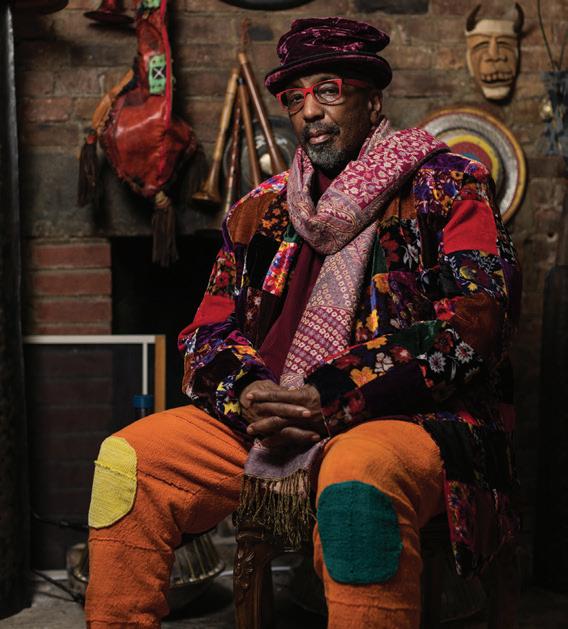
JD Allen
FRI 9/2, 5:25 PM, JAY PRITZKER
PAVILION
JD Allen’s voice on the tenor saxophone combines adroit phrasing with a full tone across all the instrument’s registers. During the pandemic, he moved from New York to Cincinnati, and he spent his lockdown time developing the material for his first unaccompanied solo album, Queen City (Savant). The record demonstrates his dogged commitment to tunefulness: he plays originals and Great American Songbook material (“Just a Gigolo,” “These Foolish Things”), and no matter where his improvising takes him, his pithy extrapolations always stay in touch with the
melody. As a bandleader, Allen often favors stripped-down settings, and at the Jazz Festival he’ll bring a trio with bassist Tyrone Allen and drummer Kayvon Gordon. Allen also plays Thursday, September 1, at Constellation.
Bill Frisell
William Parker turned 70 this year, and he can already look back on a lifetime of extraordinary accomplishments as a bassist, composer, improviser, sideman, bandleader, organizer, and author. But who’s looking back? Parker is still immensely productive. His releases in the past two years include a ten-disc collection of music that spotlights women’s voices, a mind-melting live set recorded at CBGB in 2002 with Peter Brötzman and Milford Graves, more than a dozen appearances as a sideman or coleader, and a pair of new trio recordings—one quietly ritualistic, the other a fearless dive into scorching jazz-rock. Parker often uses small groups to explore the continuum that connects mid-20th-century modern jazz and freer idioms; the quintet he’ll lead tonight features three of his enduring comrades—alto saxophonist Rob Brown, pianist Cooper-Moore, and drummer Hamid Drake— and one newer associate, soul-stirring tenor saxophonist James Brandon Lewis.
Geof Bradfield, Ben Goldberg, and Dana Hall
SUN 9/4, 1:50 PM, VON FREEMAN PAVILION
Atomic
SAT 9/3, 3 PM, VON FREEMAN
PAVILION
FRI 9/2, 7:45 PM, JAY
PRITZKER PAVILION
It takes about three seconds to recognize Bill Frisell. Countless guitarists have been influenced by his command of outboard e ects and his attunement to harmonic subtleties, but his warm, glassy tone and sinuous phrasing defy imitation. In a career that’s spanned more than four decades, he’s pursued an epically inclusive aesthetic, making deep dives into Beatles and surf-rock tunes, Buster Keaton movies, the sounds of Nashville and West Africa, the jump-cut methodology of John Zorn, and the cartoons of Jim Woodring. But no matter how far his pursuits have taken him from jazz convention, he’s stayed committed to drawing out the harmonic and emotional potential of every tune he tackles. Frisell is also a generous accompanist, even when he leads a band. He’ll play here with bassist Thomas Morgan and drummer Rudy Royston, the combo that he leads on his latest album, Valentine (Blue Note).
If the members of Atomic weren’t musicians, they might be high-wire artists—they’re that good at keeping their balance under pressure. The Scandinavian quintet expertly realize the nuanced, dynamic compositions of pianist Håvard Wiik and reeds player Fredrik Ljungkvist, which owe as much to contemporary classical music as they do to postbop jazz, but they also relish exhilarating, no-holds-barred improvisation. The group—rounded out by drummer Hans Hulbækmo, trumpeter Magnus Broo, and bassist Ingebrigt Håker Flaten—have carried on for 22 years, even though their members (originally from Norway and Sweden) are now dispersed as widely as Germany and the United States. But all good things come to an end, and Atomic will disband at the end of their current U.S. tour. They’re also playing at Constellation on Friday, September 2, which makes this festival set their final Chicago appearance.
William Parker Quintet
SAT 9/3, 7:45 PM, JAY PRITZKER
PAVILION
On the last day of any festival, it’s easy to sleep in and show up late. But if you do that this weekend, you’ll miss the simultaneously adventurous and ingratiating music of this marvelous cross-country trio. Drummer Dana Hall and reedist Geof Bradfield, who plays bass clarinet and tenor and soprano saxophones, are from Chicago; Ben Goldberg, who plays B-flat and contra-alto clarinets, is based in San Francisco. On their 2020 album General Semantics (Delmark), the absence of a bass or chordal instrument gives the music a wide-open quality—on the pithy original “345,” that airiness makes it easy to appreciate the trio’s precision maneuvers and tricky syncopation. Bradfield, Goldberg, and Hall fly easily through the music’s history, from the New Orleans-steeped polyphony of “Last Important Heartbreak of the Year” to a strikingly graceful interpretation of Cecil Taylor’s “Air.” Bradfield and Goldberg also play Saturday, September 3, at Constellation.
Kris Davis Diatom Ribbons
SUN 9/4, 6:25 PM, JAY PRITZKER
PAVILION
It’s hard to think of a more audacious reinvention than the one Kris Davis undertook on the 2019 album Diatom Ribbons (Pyroclastic). The
SEPTEMBER 1, 2022 - CHICAGO READER 31
MUSIC
William Parker ANNA YATSKEVICH
continued from 31
Canadian-born pianist, who’s been based in New York for two decades, had already established herself as a bracingly rigorous, exceptionally lucid instrumentalist and composer, both as a bandleader and as a collaborator with the likes of Craig Taborn, Rob Mazurek, and Hafez Modirzadeh. But over the ten tracks of Diatom Ribbons, she creates a vast new palette for herself by drawing on a wider range of musical communities than ever before. She incorporates Val Jeanty’s poetry-wise turntablism, Terri Lynne Carrington’s organically morphing drum grooves, the dueling guitars of Marc Ribot and Nels Cline, and the languorous vocals of Esperanza Spalding (among other things) into a celebration of limitless possibility. For this appearance she’ll perform in a stripped-down quartet with Jeanty, Carrington, and bassist Trevor Dunn, who also appears on Diatom Ribbons —a lineup I’d expect to drill down into the project’s rhythmic core. Davis also plays Saturday, September 3, at Constellation.


The best of the jazz outside the fest
For several years now, the heart of the Chicago Jazz Festival has been in Millennium Park. This year the four days of the fest also include programming at the Cultural Center on Thursday and a lunchtime show at the Maxwell Street Market on Sunday. Around the city, the Department of Cultural Affairs and Special Events (DCASE) and local music organizations have jointly booked more than a dozen neighborhood concerts.
Of course, the local venues that routinely host jazz aren’t about to stop during the jazziest weekend of the year—in fact, many of them put in extra e ort to attract concertgoers in a festival mood. Below I’ve listed the best of those shows. If you stick it out till the last note at Pritzker Pavilion, you’ll get to some of these pretty late—but not too late to enjoy some top-shelf music.
Matt Ulery and Quin Kirchner jam session; Matt Ulery, Mike Gamble, and Jeremy Cunningham; Matt Ulery & Mike Gamble Wed 8/31, 9 PM, the Whistler, 2421 N. Milwaukee, free, 21+
Jam session with Eric Schneider Thu 9/1-Sat 9/3, 8 and 10 PM; Sun 9/4, 8 PM, Jazz Showcase, 806 S. Plymouth Ct., $20-$40, 21+



JD Allen Thu 9/1, 9:30 PM, Constellation, 3111 N. Western, $20, 18+
Dave Rempis, Jason Adasiewicz, Joshua Abrams, and Tyler Damon Thu 9/1, 8:30 PM, Elastic Arts, 3429 W. Diversey #208, $15, all ages



Atomic Fri 9/2, 9:30 PM, Constellation, 3111 N. Western, $25, 18+

Abigail Riccards Quintet Fri 9/2-Sat 9/3, 8 PM, Green Mill, 4802 N. Broadway, $15, 21+
Isaiah Spencer Fri 9/2-Sat 9/3, 10:30 PM; Andy’s, 11 E. Hubbard, $15, 21+
Kris Davis solo, Ben Goldberg & Geof Bradfield Sat 9/3, 9:30 PM, Constellation, 3111 N. Western, $20, 18+
Soul Message Band Sun 9/4, 8 PM, Green Mill, 4802 N. Broadway, $10, 21+ v

32 CHICAGO READER - SEPTEMBER 1, 2022 ll
MUSIC LIVE MUSIC IN URBAN WINE COUNTRY 1200 RANDOLPH STREET, CHICAGO, IL 60607 | 312.733.WINE don’t miss... Coming Soon... Glenn Tilbrook (of Squeeze) 9.21 Al Di Meola 7 PM & 10 PM shows 9.9 Billy Cobham’s Crosswinds Project Sergio Mendes 5 PM & 8 PM Shows 10.2 9.29 9.10 J. HOWELL 9.12 DAVID BROMBERG QUINTET 9.13 JAZZ IS PHSH 9.15 JUDITH HILL 9.16 JOHN CRAIGIE WITH MAYA DE VITRY 9.18 MARY GAUTHIER WITH JAIMEE HARRIS 9.2 TORTURED SOUL 9.4 MIDNIGHT SUNMICHAEL JACKSON VS. PRINCE 9.5-6 INCOGNITO FEAT. MAYSA 9.7 DUANE BETTS 9.8 WILLIAM FITZSIMMONS WITH STUART SMITH 9.19 CHRIS GREENE QUARTET 9.22 SMOKIE NORFUL 9.23 CORNMEAL 9.25 FOX CROSSING STRINGBAND - 12 PM 9.27 THE SPILL CANVAS 9.28 J. BROWN 9.30 MAC MCANALLY WITH PETE MULLER & THE KINDRED SOULS 10.5 CEM ADRIAN 10.6 JIM BRICKMAN 10.9 ROBERT FRIPP & DAVID SINGLETON: THAT AWFUL MAN AND HIS MANAGER 10.10 AUGUSTANA 10.12 JENNIFER HARTSWICK BAND WITH HARTLISS 9.20
@Chicago_Reader
Kris Davis MICHAEL JACKSON





SEPTEMBER 1, 2022 - CHICAGO READER 33 Let’s Play! Make time to learn something new with music and dance classes at Old Town School! We offer flexible schedules for all skill levels both in-person and online. oldtownschool.org Sign up for classes today at MUSIC CLASSES FOR ADULTS & KIDS LINCOLN SQUARE LINCOLN PARK SOUTH LOOP & ONLINE OTS_1_2V_ClassAd_072921.indd 1 7/23/21 2:21 PM 3730 N CLARK ST METROCHICAGO.COM @METROCHICAGO SMARTBARCHICAGO.COM 3730 N CLARK ST | 21+ SATURDAY SEP 10 CHEZ DAMIER SNAD BODY RESPONSE FRIDAY SEP 09 Obscure presents D. TIFFANY SASSMOUTH CINNA FRIDAY SEP 16 SPECIAL REQUEST SEVRON LORELEI HARU NEMURI OLIVER SIM (OF THE XX) CALEXICO KMFDM TOADIES GIRLS AGAINST BOYS OCT 04 OCT 05 OCT 07 OCT 08 OCT 09 OCT 12 SAT SEP 10 A METRO 40TH ANN CELEBRATION THE AFGHAN WHIGS + Pink Mountaintops FRI SEP 23 COLD WAVES X FT. COLD CAVE + Kite / Empathy Test Spike Hellis / Ghostfeeder Rare DM FRI SEPT 09 TINARIWEN + Garcia Peoples Laid Back | Cold Beer | Live Music @GMANTAVERN GMANTAVERN.COM 3740 N CLARK ST 21+ SUN SEPT 11 BORIS + Nothing SATURDAY SEP 10 / 8PM / 18+ A METRO 40TH ANNIVERSARY CELEBRATION THE AFGHAN WHIGS + Pink Mountaintops THURSDAY SEP 22 / 7PM / 18+ COLD WAVES X FEATURING TR/ST + The KVB / Actors / Kontravoid Leathers / New Canyons FRIDAY SEP 09 / 9PM / 18+ TINARIWEN + Garcia Peoples SATURDAY SEP 24 / 7PM / 18+ COLD WAVES X FEATURING THE REVOLTING CORPSE + Stromkern / REIN / HAEX Cyanotic / Haloblack WEDNESDAY SEP 28 / 7PM / ALL AGES NOVO AMOR SATURDAY OCT 01 / 10:30PM / 18+ LATE SHOW ADDED DUE TO DEMAND! THE AVALANCHES TUESDAY SEP 27 / 8PM / 18+ TRENTEMØLLER + TOM & His Computer
MUSIC
The Reader’s Jazz Festival jukebox
New and upcoming records by Chicago acts booked at this weekend’s fest
By HANNAH EDGAR
Mike Allemana, Vonology (Ears & Eyes)

Like any music fest, the Chicago Jazz Festival is basically a Choose Your Own Adventure that you listen to. It’s even more multifarious than most—not only does it take over Millennium Park for four days, it also books events at the Cultural Center and Maxwell Street Market and a series of neighborhood concerts (copresented with local promoters) that begins the week before. There’s no best way through the fest, of course. My recommendation? Hit the homegrown acts. I’ve put together a sort of Jazz Festival jukebox featuring six records that dropped (or will drop) in 2022, all by Chicagobased artists appearing at the fest. My selections are hardly exhaustive, but they still convey the breadth and variety of this year’s bookings. Think of this as an appetizer for the ears.
In order of festival appearance:
It’s a tall order to sum up Von Freeman: a once-in-a-generation tenor saxophone talent, a mentor to countless musicians, a paradigm of Chicago-over-everything obstinacy. (He famously turned down an invitation to join Miles Davis’s band so he could stay in his hometown.) But guitarist Mike Allemana, who played with Freeman for nearly 15 years in his final quartet, is the right guy to give it a shot.
Allemana’s album-length suite Vonology goes beyond mere tribute, instead aiming to evoke something more essential about the late saxophonist. The music is influenced by Freeman’s abiding interest in astrology, and Allemana went so far as to analyze Freeman’s birth chart and assign musical modes to its elements. The way Freeman embodied his own sun sign inspired two movements: “The Mediator” derives its melodies and its lopsided groove from Allemana’s interpretation of Von’s chart, and “Libra Channeling” features a brambly and expansive tenor saxophone solo by Geof Bradfield. The piece closes as it opens, with a sunburst-like chorus of vocalists from Allemana’s Come Sunday gospel project. This August 11 was the tenth anniversary of Freeman’s death, but Vonology declares that his spirit has gone nowhere.
Mike Allemana and his ensemble perform Vonology on Thu 9/1 at 6:30 PM at Pritzker Pavilion.

Roya Naldi, This Madness (Rivermont)
The term “historically informed performance” (HIP for short) usually refers to Western classical musicians adopting defunct performance practices or instrumentation, determined by consulting primary sources. But why restrict it to that genre? Roya Naldi sings century-old jazz with the directness and sparing vibrato of a 1920s chanteuse—she and her band sound like an old 78 with the static cleaned up. The arrangements on Naldi’s new EP, This Madness, belong in a cramped speakeasy, not a large dance hall—her pocket-size acoustic ensemble has a muted, velvety sound, with a delightfully tinny upright piano and widewobbling winds. That “ensemble” is really just two members of the Chicago Cellar Boys, the swing-era specialists in residence at the Green Mill on Tuesdays: banjoist Jimmy Barrett and multi-instrumentalist Andy Schumm, who covers piano, tenor sax, clarinet, and cornet.
This Madness is a postscript to Naldi’s full-length debut, A Night in June (2020). Its four songs represent a delectable slice of her repertoire, including the foxtrotting “He’s the Hottest Man in Town” and the ballad “You Call It Madness (But I Call It Love),” first recorded in 1931 by its co-composer, baritone Russ Columbo. Naldi’s delivery on the latter sometimes out-suaves Columbo’s in its apparent effortlessness, more a nonchalant shrug than a wink.
Roya Naldi performs Fri 9/2 at noon on the Harris Theater rooftop (entrance at 205 E. Randolph).
LowDown Brass Band, LowDown Nights (selfreleased)

As a brass band with a genre-defying spin, LowDown are a close cousin of the Rebirth and Dirty Dozen brass bands from New Orleans. The distinctive second-line sound seeps into LowDown too, but in combination with local referents. LowDown’s sound calls back to the muscular horn sections of Earth, Wind & Fire and Chicago, and their ebullient stylings—not least the smoothly delivered bars of MC and front man Anthony “Billa Camp” Evora— evoke hip-hop projects such as the Social Experiment and Sidewalk Chalk. To quote the liner notes to LowDown’s self-titled 2008 debut, “It’s the New Orleans hump with a Chitown bump.”
LowDown Nights is one of two albums the band recorded during the pandemic shutdown, along with last year’s The Reel Sessions, and it’s fast-paced, high-energy fun from start to finish. That’s good news for fans who wear their dancing shoes to the Chicago Jazz Festival, since LowDown’s set will likely have something for everyone. The bilingual “Ranura de la Noche” rides on tango rhythms, “Be the One Tonight” announces itself with a groove reminiscent of early house music, and “We Dem Boys” is thick, syncopated funk held down by Lance Loiselle’s sousaphone.
The LowDown Brass Band perform Fri 9/2 at 3 PM on the Harris Theater rooftop (entrance at 205 E. Randolph).
34 CHICAGO READER - SEPTEMBER 1, 2022 ll
FESTIVAL
CHICAGO
JAZZ
Thu 9/1, 11 AM-9 PM, Chicago Cultural Center, 78 E. Washington, and Pritzker Pavilion, Millennium Park, 201 E. Randolph; Fri 9/2-Sat 9/3, 11:30 AM-9 PM, Millennium Park, 201 E. Randolph; Sun 9/4, 11 AM-9 PM, Maxwell Street Market, 800 S. Desplaines, and Millennium Park, 201 E. Randolph; free, all ages
Fumée, Good Morning Heartache: The Music of Irene Higginbotham (self-released)

Ethan Philion, Meditations on Mingus (Sunnyside)
Charles Mingus would’ve turned 100 this year, and tributes are pouring in around the globe. Chicago bassist Ethan Philion homes in on Mingus’s compositional legacy, focusing on material where Mingus spoke truth to power and confronted injustice. To execute his arrangements, Philion enlists a star-powered ten-piece that includes drummer Dana Hall, trumpeter Victor Garcia, pianist Alexis Lombre, and saxophonist Geof Bradfield. (Garcia and Bradfield also appear on Mike Allemana’s Vonology.)
For the most part, Philion faithfully follows each work’s blueprint, building it up with muscular vamps, lush textures, and virtuosic soloing from his large-format band. He also leans into Mingus’s o eat grit, which is plentiful in the mercurial “Once Upon a Time There Was a Holding Corporation Called Old America” and an increasingly frenetic version of “Meditations for a Pair of Wirecutters.” (The latter tune, the first of the set that Philion arranged, gave the project its name.) Mingus composed “Prayer for Passive Resistance” as a showcase for an alto saxophonist, and it assumes the same role in Philion’s version—Rajiv Halim stumps energetically throughout the track.

Meditations on Mingus perform Philion’s arrangements on Fri 9/2 at 4:15 PM at Pritzker Pavilion.
Irene Higginbotham (1918–1988) could keep up with Tin Pan Alley’s most prolific songwriters, and her tunes were performed and popu-
larized by the likes of Duke Ellington, Benny Goodman, and Nat King Cole. Her most famous song is “Good Morning Heartache,” one of several she composed for Billie Holiday. Holiday first recorded it in 1946, and it roared belatedly onto the charts after Diana Ross portrayed her in the 1972 film Lady Sings the Blues Higginbotham advocated extensively for the intellectual property rights of Black songwriters. However, despite many high-profile recordings of her songs, she posthumously fell victim to the broken system she organized against. To work around restrictive agreements with publishers and performing-rights agencies, Higginbotham published material under many names (most commonly “Glenn Gibson,” which sounded not just male but also white). This had the tragic side e ect of relegating her to the margins of jazz history.
Fumée bandleader and vocalist Christy Bennett searched the archives at the Library of Congress, whose copyright records document Higginbotham’s song submissions, and at Brigham Young University, which somehow ended up with a trove of her work. Due in October, Fumée’s Good Morning Heartache: The Music of Irene Higginbotham might be the first album-length tribute to the songwriter. It renders her work with Fumée’s distinctive instrumentation, drumless and inflected with Eastern European sounds: though the group’s personnel varies, mandolin (Don Stiernberg), accordion (Don Stille), and bass (Christian Dillingham or Ethan Philion) hold down the rhythms onstage and on the album.
Fumée performs Sat 9/3 at 11:30 AM at the Von Freeman Pavilion (North Promenade).
For a few fleeting minutes in 2019, children on opposite sides of the U.S.-Mexico border shared seesaws. Bubblegum pink and slim enough to fit through the slots in the border
fence separating El Paso and Juárez, they were designed by two California professors who later won an award for their design. That moment is captured, not without some cynicism, in the illustration on the cover of Kind Regards/Saludos Afectuosos , which drummer Gustavo Cortiñas releases this week as a follow-up to last year’s Desafío Candente The latter is the kind of once-in-a-lifetime achievement that an artist often needs years to complete, then years to recover from—it’s as lush as an untroubled forest yet just as searing as its inspiration, Eduardo Galeano’s 1971 anti-imperialist book Open Veins of Latin America: Five Centuries of the Pillage of a Continent
Miraculously, Saludos Afectuosos manages to be just as staggering. Cortiñas tries his hand at songwriting (in both English and Spanish) and proves himself just as savvy a lyricist as a

composer. It helps that he has a secret weapon in Meghan Stagl, doing double duty on piano and bilingual vocals and sounding weightless on both. “You rode the beast and migrated north,” she sings over desolate synths in “Emigraste”; that image, with everything it implies, is still darkening the air when the band picks up with a buoyant 6/8 groove. This technique is more or less a constant on Saludos Afectuosos: the tension between gutting lyrics and breezy delivery. It feels true to our twisted reality, just like those garish pink seesaws.
Gustavo Cortiñas celebrates the release of Kind Regards/Saludos Afectuosos on Sun 9/4 at 1:30 PM on the Harris Theater rooftop (entrance at 205 E. Randolph). v
SEPTEMBER 1, 2022 - CHICAGO READER 35
MUSIC
@2ndFiddle
Gustavo Cortiñas, Kind Regards/Saludos Afectuosos (Desafío Candente)
MUSIC
Jaimie
By BILL MEYER
“You know, even assholes need some love.”

So said Jaimie Branch in a 2019 interview with Aquarium Drunkard. She was explaining “Love Song,” one of the tunes on her 2019 album Fly or Die II: Bird Dogs of Paradise. And without necessarily trying, Branch was also cluing folks in to the kind of connection that she made with people. Everyone needs some love, true, but not everyone has what it takes to keep the love coming even after they have an asshole’s number. It takes a lot of heart, and Branch had a lot of that. That’s one of the reasons why people loved playing with her and loved listening to her play—and why they were absolutely gutted to find out that she’d died at age 39 in her apartment in the Red Hook neighborhood of Brooklyn at 9:21 PM on Monday, August 22. No cause of death has been announced.
Not everyone who plays free jazz projects that kind of big love—the music doesn’t necessarily require it. Total improvisation often trades in smaller-scale intimacies and epic energies, and Branch could deliver both of those too, with absolute technical and conceptual assurance. People noticed that right away when she began establishing herself in Chicago’s improvised-music community in 2006. But while Branch was particular about the music she embraced, she wasn’t exclusive. She grew up transcribing solos by Miles Davis and Chet Baker, and she fell hard for punk, ska, and hip-hop; she had a feel for abstract styles, and just as firm a grasp on music that commu-
nicated directly.
Branch also elicited care and loyalty from other musicians on a personal level. In a 2017 Reader profile, Peter Margasak reported that when Branch was entangled in addiction, they pulled for her and supported her. After she got clean and established herself in New York— she arrived there in 2015—she maintained her connections with Chicago. When she made her big break as a bandleader in 2017, it was with a group of fellow Chicagoans: Fly or Die began as Branch, bassist Jason Ajemian, drummer Chad Taylor, and cellist Tomeka Reid (later replaced by Lester St. Louis). The label that has released much of her music, International Anthem, is based in Chicago.

Fly or Die combined the sonics of free jazz with jubilant melodies, celebratory rhythms, and (beginning with their second album) Branch’s take-no-shit singing. When she sang, “This is a love song for assholes and clowns,” she was definitely calling people out. But she also made clear in her between-song banter
that she understood that people who think they’re good guys can be assholes, and that even assholes need love. She got people, and people got her. They recognized the human complications that were as much a part of her music as her combo’s practiced rapport and exhilarating spontaneity.
I first learned about Branch’s death on Facebook. Of course, her fellow musicians shared fond memories and stunned grief. But I also saw fans weighing in—I read comment after comment by people who’d found sustenance listening to Branch’s records during the lockdown months, or who’d been moved by a concert in Tennessee or Iowa or Canada. Branch reached people not because she transcended the various radical musics that she played— she didn’t want to transcend them. She pulled those sounds together into something big and loving enough for even the assholes and the clowns. v
36 CHICAGO READER - SEPTEMBER 1, 2022 ll
Jaimie Branch ABDESSLAM MIRDASS
@Chicago_Reader IN MEMORIAM
has flown away too soon The Chicago-rooted jazz trumpeter’s tragically early death has deprived the world of a generous, goodhumored soul and decades of her thrilling and powerful music.
Branch
9/7 Yehya Khalil 9/14 La Temática 9/19 Bnat Al-Hourayiat & Esraa Warda WORLD MUSIC WEDNESDAY SERIES FREE WEEKLY CONCERTS, LINCOLN SQUARE OLDTOWNSCHOOL.ORG 4544 N LINCOLN AVENUE, CHICAGO IL OLDTOWNSCHOOL.ORG • 773.728.6000 SATURDAY, SEPTEMBER 10 8PM Josh Rouse In Szold Hall SATURDAY, SEPTEMBER 17 8PM Big Bad Voodoo Daddy In Maurer Hall SATURDAY, SEPTEMBER 17 10AM Family Concert Groove Time feat. Mars Caulton In Szold Hall SUNDAY, SEPTEMBER 18 3 & 7PM Jake Shimabukuro In Maurer Hall FRIDAY, SEPTEMBER 23 8PM Joe Purdy In Maurer Hall SATURDAY, SEPTEMBER 24 8PM SUNDAY, SEPTEMBER 25 7PM Watkins Family Hour In Maurer Hall SUNDAY, OCTOBER 2 7PM Mississippi River Suite written & directed by Michael J. Miles featuring Zahra Glenda Baker with Lloyd Brodnax King & Jill Kaeding • In Maurer Hall FRIDAY, OCTOBER 7 8PM Dar Williams All Request Show • In Maurer Hall FRIDAY, OCTOBER 7 8PM Trace Bundy In Szold Hall SATURDAY, OCTOBER 8 7:30PM David Wilcox with special guest Jean Rohe • In Szold Hall UPCOMING CONCERTS AT NEW SHOWS ANNOUNCED • ON SALE NOW 9/17 Groove Time featuring Mars Caulton 10/8 The Okee Dokee Brothers 10/30 Spooky Singalong 12/4 Justin Roberts & The Not Ready For Naptime Players Family Concerts On Sale Now!









SEPTEMBER 1, 2022 - CHICAGO READER 37 ARTSANDPUBLICLIFE .ORG/ALL-THAT-LIGHT AT LOGAN CENTER EXHIBITIONS ANDARTS + PUBLIC LIFE A TEN YEAR RETROSPECTIVE OF THE ARTISTS-IN-RESIDENCE PROGRAM Friday September 9, 2022 • 7pm • Free Logan Center for the Arts, 915 E 60th St Join us early at 6pm for a tour of the Logan Center Gallery with All That Light curator GENESEE THE SPOTLIGHT IS CLOSER THAN YOU THINK THE 22_001749_Chicago_Reader_Afrique_en_Cirque_Ad_GEN_JT01Mod:July11,20223:54PMPrint:07/26/224:14:15PMpage1v7 203 NORTH GENESEE STREET, WAUKEGAN, IL BOX OFFICE HOURS: TUE – FRI 11 AM – 4 PM, SAT 10 AM – 2 PM GENESEETHEATRE.COM TICKETMASTER: 800-982-2787 YOU WON'T WANT TO MISS THIS SHOW! Daring Acrobats • Stunning Contortionists • Colorful Costumes THURSDAY, SEPTEMBER 29 7:30 PM Kalabanté Acrobats Presents We Couldn't Be Free Without You— Support Community Journalism chicagoreader.com/donate
Shifting priorities
How parenthood and the 2020 uprisings impacted Tiara Déshané’s approach to music
By ALEJANDRO HERNANDEZ
Becoming a new parent is an experience that can only be described as transformative. Especially for artists, parenthood can completely alter the trajectory of one’s career because it demands a reevaluation of priorities, goals, and even an entire artistic vision.
Tiara Déshané’s parents sacrificed their aspirations as musicians in order to raise her, making a choice that any parent, especially those from marginalized backgrounds, can relate to. Now, after becoming a mother in her own right two years ago, she intends to break that cycle by raising her daughter while blossoming more into herself as an artist.
“My transition into motherhood has been like dying and being reborn,” she says. “There’s a lot of fear that’s projected upon mothers, particularly about following your dream. Being a businesswoman and having children isn’t a role that we were always supposed to do, and I went through a dark time because I felt like no one’s listening to my music anymore because I’m a mom. And I’ve had to rewrite that internal dialogue.”
Déshané is a born-and-bred musician. Growing up, she was exposed to the worlds that music can create by her parents, aunts, uncles, and even next-door neighbors through regular jam sessions. She taught herself how to play guitar at 11 and was heavily involved in After School Matters’s Gallery 37 Program, which she describes as being the catalyst of her career.
Déshané started recording her music in 2015 and released the bulk of her projects prior to the COVID-19 pandemic. Specializing in neo-soul and R&B with subtle hip-hop influences, her music is warm and soothing as she gently guides the listener into a comfortable, relaxing state. She gained solid traction with her early releases, but after the George Floyd

uprisings in the midst of a pandemic her priorities shifted.
“There was a lot of Black businesses that were being trashed and as a result, a lot of our local grocery stores and pharmacies were being closed, and it was hard to get groceries. So I felt an internal need to try to do whatever I can, and one day I posted on Facebook my Cash App to help me get groceries to give out to the community,” she recalls. “What started out as
this spur-of-the-moment decision ended up in a humongous turnout! I raised about $6,000 within like two weeks just to give away food. I wholeheartedly believe in fighting for justice for Black and Brown communities, period. Though I’m not necessarily trying to be the forefront, I will be a part of the gears to help.”
She named the project Feed The People 100. For the rest of that June, Feed the People 100 continued to hold grocery giveaways, high-
lighted by a massive Juneteenth celebration that more than 400 people attended. Shortly after that, she became pregnant with her daughter and had to pause her music career, and she says she struggled with feelings of inadequacy.
“I had all of these goals, all these aspirations as far as my music. I had to relearn what my purpose is, and it’s not a selfish purpose anymore, for lack of better words,” she says. “I used to look at my purpose and my passions as the same thing. I learned that, as a mom, I cannot be willing to sacrifice my livelihood because my livelihood a ects my child. It’s been extremely humbling, transformative, painful, [and] beautiful.”
After rediscovering herself, she’s finally ready to unveil the music she’s been working on for the last few years. This time she’s not just doing it for herself, but for her daughter, and also to honor the legacy of loved ones who passed away in recent years.
She will be rereleasing her debut EP, -ISM, which was previously only available on SoundCloud, on all streaming platforms this upcoming month. She also intends to drop a two-part musical project before the year is over. The focus of the projects is centered around her transition into motherhood and becoming a full-time artist/parent. While the release dates haven’t yet been determined, the plan is to drop the first part in the fall and the latter closer toward the end of the year.
“I owe it to myself. I owe it to my daughter. I owe it to [Ridley] Victoria, I owe it to Squeak and John Walt,” she says, referencing Chicago artists who have died in recent years. “I owe it all to these young souls who are not here who couldn’t see those accolades. We can see that purpose being fulfilled, and I owe it to them to not give up on my dreams. So yes, this really is a big part of my transformative process.” v
38 CHICAGO READER - SEPTEMBER 1, 2022 ll
MUSIC
Tiara Déshané THOUGHTPOET
@drointhewind


























SEPTEMBER 1, 2022 - CHICAGO READER 39 Ernani Sep 9 - Oct 1 Fiddler on the Roof Sep 17 - Oct 7 Don Carlos Nov 9-25 Le Comte Ory Nov 13-26 Hansel and Gretel Jan 25 - Feb 5 The Factotum Feb 3-12 Carmen Mar 11 - Apr 7 Proximity Mar 24 - Apr 8 West Side Story June 2-25 2022 | 23 Season Experience the joy of live performance Tickets on sale now starting at $39 lyricopera.org Lyric Opera of Chicago thanks its O cial Airline, American Airlines, and acknowledges support from the Illinois Arts Council Agency Season Sponsor
Photo: Iko Freese/Komische Oper Berlin
Anna-Michal Paul, chalk artist extraordinaire
doing more portraits, and I’ve started doing a little more involved pieces, which has been a lot of fun. I was actually just talking to [16 on Center assistant talent buyer] Bobby Ramirez, and we found out that with an average of 200 shows a year I’ve done roughly 2,000 chalk murals. It’s wild to think about.
I grew up in a very artistic family. And [art making] has always been something that’s just kind of been around, and something that . . . I therefore probably took for granted. So I think hearing other people appreciate what I was doing kind of gave me a little boost. Like, “Oh, this is interesting. I can make this into something more.” And I love to challenge myself. I’m a very self-competitive person. I wanted to push it and see what I could do. I think maybe three or four years ago is when I started doing more portraits.
In second grade, I would draw caricatures of friends in Sunday school, or I would skip certain classes to get to art class early and finish up projects. It has definitely been something that has just been a part of my life. I will say, it was really hard as a young kid—I have five older siblings, two of which are older sisters, and both of them are incredibly talented artists. So I was definitely growing up in that shadow and always feeling like a little caboose trying to keep up with them. They were big shoes to fill. One of them got a full ride to the Art Institute, and the other is now teaching art full-time.
When they left my surroundings is when I started to really explore more and explore my own internal inspiration—expressing what is truly coming from me, and not necessarily trying to mimic or follow in someone’s footsteps.
still an expression of oneself. Even the way you present yourself—clothing is also a way that I creatively express myself. I’m really lucky to have been given the opportunity to have a canvas that’s given to me every single day, and being forced into that routine of exercising the artistic muscle of creating.
This was always a side hustle. I went from hosting to serving. I worked at a cocktail bar for a couple years. In 2015, I took the jump to go completely freelance—I took the jump to leave the industry and really just challenge myself to hustle. To really look for ways to support myself while still doing creative things: filmmaking, art.
It just worked! I was still doing graphic design, even when I went freelance. I was looking for any bar or restaurant that needed sidewalk chalkboards done or menu boards done. Thalia was a really nice liaison; people would come to shows and follow up with me and say, “Hey, I’ve got a restaurant and a chalkboard that needs help. Do you want to come make it pretty?” Establishing those kinds of relationships, and creating repeat customers through that, really helped me establish a career. Now, Thalia is basically my bread and butter—aside from, like, street fests in the summertime.
The night before, I’ll research the band— just a quick Google search of the band name, followed by a poster or album cover, and see what pops up. Scroll through and see what shape, what images, catch my eye—colors, patterns. I’ll download a bunch of those photos. When I get [to Thalia], the most satisfying part is erasing the night before’s [chalk art], believe it or not.
If you’ve ever been to a show at Thalia Hall, you’ve walked right past Anna-Michal Paul’s work. She creates the hand-drawn chalk art that greets concertgoers as they ascend the stairs to the second-floor venue. Her detailed, textured portraits and stylized lettering, which she catalogs on Instagram at latenightchalkshow, are as much a part of Thalia’s identity as the musicians who headline the hall every time they come to Chicago. In fact, because she’s created thousands of promotional chalk designs for Thalia, you could argue that she’s its most frequently booked artist.
Imoved to Chicago in 2012. Dusek’s, I think, was opening up shortly after that. I was hosting there and started doing their beer board, which was basically just writing up their rotating drafts. One of the bar managers one day was like, “You should try this one font— this beer company’s got a really cool font.”
So that developed. About a year later, when Thalia Hall opened, Pete Falknor, the manager, asked me to do the chalkboard—they’ve got this massive eight-by-ten chalkboard.
It was honestly just kind of a job for a while. It was just something to pay the bills with.
Over the years, it’s developed into, like, “What can I do next? What can I create?” I’ve started
My family joke is that I live a very haphazard life. And yeah, I do; life just kind of happens to me. I was invited to live up here with two of my sisters. One was leaving for the Peace Corps, and the other planned to stay in a little two-bedroom apartment in Pilsen—where I paid $650 a month for the whole place. And then seven months passed, and [my sister] Caroline decided to move back to North Carolina. And that was around the time that I got the job at Dusek’s. I most definitely was not focusing on creativity. I was, you know, processing being in the city by myself, being 20 years old, and working at a bar-restaurant—that leads to less creativity.
It was more of a fun time for me, which is
I’ll usually start with the graphic—the image itself. I tend to do the band name last. I’ll use the side of the chalk, and I’ll create this rough ghost-shadow of whatever image I’m putting up there. Then I’ll step back. I’ll envision where I want the words to go, and if it doesn’t fit, it’s a light sketch, so I’ll be able to move it around easily. Then I take it one little section at a time.
I will look at the colors in someone’s nose, and I’ll use purple and orange and white to fill in these little patches. It’s kind of like putting a puzzle together, now that I think about it. It’s like when you’re on an airplane and you look down at the ground, and you see all these di erent squares of di erent shades of green. It’s kind of like that. Just plotting out of faith.
The longest one I’ve done was Lucy Dacus laying down on a sofa, which took up the entire board; that took six hours. I would say, on average, I spend about three on portraits—the

40 CHICAGO READER - SEPTEMBER 1, 2022 ll
MUSIC JESSICA LEVIN
CHICAGOANS
OF NOTE
“It’s a huge privilege to be able to do this. Not a lot of people get to walk into work and look forward to fucking up the thing they did the night before so they can make something new.”
As told to LEOR GALIL
bigger ones. And then daily ones that are just copy and no graphic, it’s 30 minutes to an hour and a half.

It’s just really nice to hear an artist connect with me through something that I didn’t create, but maybe a friend of theirs created this poster for them, and I’m up here replicating work that someone close to them has created. It’s a full circle. It’s really nice. To be brought into that, and to be humbled in that I almost don’t feel like I’m as big of a catalyst in the creative process—but more of, like, a liaison to bringing out images that represent these bands. I’m prepping people for the experience of going upstairs, like anyone would with a band poster. Interacting with the bands is probably the coolest part, and that makes me feel part of the community the most.
Back in 2016, Angel Olsen came to play at the hall. Everyone knows that I’ve got beef with Angel Olsen, or I used to, but this was the first portrait I ever drew. I was like, “I’m going to the show tonight—picking out my outfit, drawing this picture for Angel Olsen.”
I get done, very satisfied; I’ve been doing this for three years. Looking back, it was nothing to write home about. But I get there later that night to go to the show, and it’s been erased. Her portrait is gone o the chalkboard. I have no idea what’s going on. And it turns out that Angel Olsen did not like it and made someone erase it—which I’ve since forgiven her about. Like, she probably has no idea that any of this went on.




















I was so embarrassed that I didn’t even go to the show that night. Like, I couldn’t even face her from a few feet away. That was probably the first memorable experience.
Ty Segall, I actually got to talk to him face-
to-face. And he’s got how many bands? Six? Too many. So doing my research the night before, I have to be really selective with the images that I choose. I know that now, with him, but at the time I put something up from the wrong Ty Segall band.
I love Ty, so I’m like, “I’m gonna put some good time into this. I’m gonna make this really fucking awesome.” Instead of just filling sections in, I’m filling it in with patterns and swirls. I’m like three hours in, and someone comes up behind me and says “excuse me.” I turn around, and it’s Ty Segall. He introduces himself—which he did not need to. He says, “I’m so sorry, but that is from a di erent band of mine.” [ Editor’s note: Anna-Michal was re-creating the album art for the Ty Segall Band’s 2012 album Slaughterhouse; the group performing that night was Fuzz.]
He just kept apologizing: “I’m so sorry, I’m so sorry.” “No problem, dude. I’ll change it into something else.” I ended up turning the face of—it was a skeleton or something—into the face of the fuzz creature, the blue creature on their [2013 self-titled] album. I got it on timelapse too. So I’ve got little clips of me blushing and talking to Ty Segall while he’s sitting there apologizing to me, and I’m like, “I’m sorry for fucking up your stu .” And he’s like, “I’m sorry for fucking up your stu .” That was a pleasant experience.
Not gonna lie—I absolutely take it for granted so often. I think a lot of that is due to the fact that it all kind of happened to me, and it kind of birthed itself. But that being said, I do reach moments of taking a step back and looking at this weird-ass life with this weird-ass job that I have, and things that I would never even have imagined for myself, and it’s really
fucking cool. What an opportunity, to get to come into contact with these people that are influencing music, and in one of the biggest music cities in the country. It’s an honor. I’m humbled. I’m all of these things. It’s just cool. And it’s a huge privilege to be able to do this. Not a lot of people get to walk into work and
look forward to fucking up the thing they did the night before so they can make something new. The people that work there are just incredible, and the people that come through . . . nothing but good vibes. v
SEPTEMBER 1, 2022 - CHICAGO READER 41
Three Anna-Michal Paul chalk portraits from Thalia Hall in 2022: Fletcher (July 29), Lucy Dacus (February 15), and Alok (June 6) COURTESY ANNA-MICHAL PAUL
MUSIC
@imLeor
Recommended and notable shows and releases with critics’ insights for the week of September
MUSIC
PICK OF THE WEEK
Sidi Wacho sing of a revolution that will be danced
SIDI WACHO
Fri 9/2, 9 PM, Martyrs’, 3855 N. Lincoln, $20, $15 for International Latino Cultural Center members. 21+
French
Spanish. Accordionist Jeo rey Arnone,
CONCERT PREVIEWS THURSDAY1
Scorched Tundra XII See also Fri 9/2 and Sat 9/3. Earthless headline; Eyehategod and Sweet Cobra open. 8:30 PM, Empty Bottle, 1035 N. Western, sold out. 21+
Promoter Alexi Front began his love affair with Scandinavian metal in the mid-2000s by publishing a zine and running a label. He started the Scorched Tundra festival in Gothenburg, Sweden, in 2011, and five years later he began throwing one in Chicago as well—spearheading a sort of underground-metal sister-cities program. Front is a curator by nature: “Each year I do my best to place all of the bands playing Scorched Tundra in a slot that will enhance their strengths,” he says on the festival’s website, “instead of placing them based in order of how much they are paid or what their stature may dictate.” For the past couple years, Scorched Tundra has been constrained in scope by the pandemic, but Front has continued to promote shows through his partnership with the Empty Bottle whenever possible—and this year the festival returns with the force of pent-up energy at last released.
Taking place over three nights, Scorched Tundra XII is great from start to finish. The festival includes well-known scene favorites such as California psych masters Earthless and New Orleans sludge lords Eyehategod, as well as rare magical moments such as Saturday night’s collaborative set by Portland one-man black-metal project Mizmor and Baton Rouge sludge-metal ensemble Thou. The two acts worked together on the album Myopia, which Gilead Media released earlier this year with very little fanfare, and they performed the record in its entirety this spring at the Roadburn Festival in the Netherlands; they’ll do that again here in Chicago. The show is also Mizmor’s Chicago debut, so make sure to arrive on time for the solo set by founder A.L.N. The lineup at Scorched Tundra also features plenty of local heavyweights. On Thursday, posthardcore band Sweet Cobra kick things off; on Friday, folky doom group Huntsmen open for rising stoner-psych monsters Rezn; and on Saturday, the entertainment includes a DJ set from Hide vocalist Heather Gabel and a performance by Ready for Death (a thrash supergroup featuring members of Pelican, Haggathorn, Racetraitor, and Swan King, as well as Reader contributor and former staffer Luca Cimarusti, of Annihilus and Luggage).
—MONICA KENDRICK
FRIDAY2
accompany the
heartfelt,
with dance rhythms from various parts of the world in percussive, driving tunes that fuse Balkan beats, raucous polkas, and banging cumbias. “Lejos de Casa” (“Far From Home”) from their 2022 album, Calle Sound System, is so irresistibly danceable it’ll get every body part you have shimmying and shaking (I dare you to listen and sit still!). But a closer listen to the lyrics reveals the heartbreak of immigrant journeys: “Lejos de casa, risa, tristeza, ¡aguante familia!” (“Far from home, laughter, sadness, hang in there, family!”). Saidou and Ayala’s social-justice anthems uplift with righteously powerful joy and loud, inyour-face badness, expressing their cultural identities with explosive calls to action—“Grita Justicia” (“Yell Justice”), for example, indicts police brutality and other abuses of power. But you don’t have to understand the words to pick up on the emotion behind them; Sidi Wacho are chanting that we refuse to go down quietly. This revolution may not be televised, but we’ll surely be dancing to it. —CATALINA MARIA JOHNSON

Sofia Kourtesis Cinthie headlines; Sofia Kourtesis and Vitigrrl open. 10 PM, Smart Bar, 3730 N. Clark, $25, $20 in advance. 21+
There was a time when Sofia Kourtesis was content to simply make party music. On her first two EPs, the Berlin-based Peruvian house producer cra ed shimmering tracks that could soundtrack the most humid of summer afternoons. She shifted gears, though, on her 2021 breakthrough, Fresia Magdalena (Technicolour), whose five tracks moved away
42 CHICAGO READER - SEPTEMBER 1, 2022 ll
FRONTED BY FRENCH-ALGERIAN RAPPER Saidou and Chilean rapper Juanito Ayala, Sidi Wacho unite rebelliousness on both sides of the Atlantic (specifically, Northern Africa and the global south) through activist rap in
and
trumpet player Manel Girard, and drummer Christophe Demazeux
group’s
powerful lyrics
1
b ALL AGES F
COURTESY THE ARTIST
from pure hedonism toward a thoughtful, vulnerable approach that helped Kourtesis grapple with difficult life circumstances. She also included her vocals for the first time, which gives the record a more insular feeling than her previous work. On “La Perla,” a song she made while her father was dying of leukemia, she plaintively reflects on that unfolding tragedy as manipulated vocal loops and a scurrying beat create a wistful pool of sound. “Nicolas” is named for her father, who taught her how to play piano, and the way she weaves his voice into a disco edit full of other sampled vocals feels like a loving tribute to the man who nurtured her early musical development. Despite the seriousness of its subject matter, Fresia Magdalena is also club friendly. “By Your Side” is all glistening bells and synth flourishes, and a swerving bass line buoys the track as horns elevate it into celebratory catharsis. Kourtesis keeps things even-keeled, however, and she seems to be trying to stay as grounded as her low-key house music: “I’m trying to be in a world of dreams but also reality,” she recently told Mixmag . Kourtesis has also grown more mindful of her role as an artist, and of the ways she can use her platform to bring awareness to social issues. You can hear that on her latest single, “Estación Esperanza” (Ninja Tune), which she created around samples from “Me Gustas Tu” by singer-songwriter Manu Chao. The track features chants she recorded at three protests in Lima over the past year—Indigenous people pushing back against mining and oil drilling in their territories, women demanding change in light of the country’s high femicide rate, and fearless youth rejecting political corruption following the ouster of now ex-President Martín Vizcarra in November 2020. You can hear Kourtesis’s voice in the mix too; more than ever, she wants to be a part of the change.
—JOSHUA MINSOO KIM
Scorched Tundra XII Day Two See Thu 9/1. Rezn headline; Thou, Friendship Commanders, and Huntsmen open. 10 PM, Empty
Bottle, 1035 N. Western, $25. 21+
Sidi Wacho See Pick of the Week at le . 9 PM, Martyrs’, 3855 N. Lincoln, $20, $15 for International Latino Cultural Center members. 21+
SATURDAY3
Scorched Tundra XII day three See Thu 9/1. Thou and Mizmor headline with a collaborative set; Mizmor, Ready for Death, and DJ Heather Gabel (Hide) open. 8:30 PM, Empty Bottle, 1035 N. Western, $30. 21+
FRIDAY9
Dreary North Fest See also Sat 9/10 and Sun 9/11. Today’s bill consists of Suppression, Sirius Blvck, Collapsing Scenery, Slutbomb, Hopeless Voyage, World Peace, Angry Blackmen, Sick/Tired, Spring Break, Scumbag Fred, Pig City, Magical Mind, Constituents, Choke, Utility, Breaking/Entering, Aseethe, Shitstormtrooper, and Meredith Haines. 2 PM, Subterranean, 2011 W. North, $40 single-day pass, $100 three-day pass. 17+
Brett Ray had proved his commitment to extreme music long before he launched the extreme-music blowout Dreary North Fest last year. He’s been booking shows for more than two decades, and he’s been releasing music through his label, Suspended Soul Tapes and Records, for close to ten years. He also regularly tests strangers’ capacity to endure high-decibel punishment in several bands—most notably as the front man of Midwestlust, whose knots of grindcore and harsh noise seethe like a rat king trying to untangle itself. That group performs
on night two of the second annual Dreary North, whose amazingly dense and somewhat unstable lineup includes 65 other musical projects at the time of this writing—I expect that even a few fanatics may see it as a bit much. (Most sets will run between ten and 20 minutes; otherwise the day just wouldn’t be long enough.) To outsiders, extreme music can sound undifferentiated in its nastiness, but Ray recognizes its spectrum, and Dreary North’s offerings are far from monochromatic; I’d be hard-pressed to think of another festival that spotlights longrunning Virgina grind group Suppression, sludgy Indiana punk outfit Shih Tzu, and experimental Chicago hip-hop duo Angry Blackmen. Dreary North’s scope is global, with acts from Mexico (Violencia), Japan (Crimes of Love), Brazil (Test), and Belgium (Psywarfare), among other locales, but of course the lineup also does great work spotlighting acts from Chicago and elsewhere in Illinois. Agitpropdriven posthardcore band the Ableist and postapocalyptic metal group Urine Hell help kick off the third and final day of the fest as part of a block of local acts that could play Subterranean on any other night—if you’re curious about extreme music, they’d make a great entry point. The lineup is likely to continue changing a er this is published, but updates should be available at the festival’s event page on Facebook: facebook.com/events/1374185389677029.
—LEOR GALIL
SATURDAY10
Dreary North Fest day two See Fri 9/9. Today’s bill consists of Psywarfare, Crowhurst, Wake, Violencia, Pain Chain, Wounded Touch, Canadian Rifle, Midwestlust, Nunn, Intercourse, Chip7, Snuffed, Backslider, Sarin, Spit Pile, Dug, Hallucination Realized, School Drugs, Heel Turn, Citizen 2-13, Blackwater Sniper, Subservient Dominance, Blunt, Janna Lee, and Stress Positions. 2 PM, Subterranean, 2011 W. North, $40 single-day pass, $100 three-day pass. 17+
Praise Mil-Spec, Instill, Subliminal Excess, and Absolute Truth open. 7 PM, Chitown Futbol, 2343 S. Throop, $15. b
Baltimore band Praise have been working within a classic melodic hardcore sound since their 2010 debut seven-inch, and they dig even deeper into that terrain on their newest album, All in a Dream their first for legendary hardcore label Revelation. While they started out in a more traditional moshheavy vein, Praise started diving hard into the emotional hardcore associated with D.C.’s Revolution Summer on the 2016 EP Leave It All Behind (which even included an Egg Hunt cover). That record proved to be just a peek into what they’re capable of, though. All in a Dream borrows Dag Nasty’s formula of creamy, ringing guitars, high-energy rhythms, and catchy yelled vocals, then builds it into a melodic masterpiece with heartfelt hooks, clever harmonies, and absolutely delicious guitar interplay. A highlight of the record is drummer Daniel Fang—hardcore fans might know him from a little band called Turnstile. Much as he does in that group, he brings an incredibly bouncy, lively feel to Praise, while essentially turning his drum fills and
phrases into hooks of their own. This sort of music has been made on the east coast since the 80s, and while Praise aren’t reinventing the wheel, they honor the style so expertly that All in a Dream feels like the freshest record you’ll hear all year—it’ll keep you coming back for more. Due to Fang’s obligations with Turnstile, Praise don’t get out and play— let alone tour—very o en, so this show is not to be missed. —LUCA
CIMARUSTI
SUNDAY11
Dreary North Fest day three See Fri 9/9. Today’s bill consists of Merc, KST.DEX, Test, Niku Daruma, Rush Falknor, Sissy Spacek, Crimes of Love, Everlasting Light, Dental Work, Fuck It . . . I Quit!, Swollen Organs, Nequient, Shih Tzu, Davis Ag, Dipt, DeathEnvy, Disperser, Canyons, Urine Hell, MWA, Shrivel Up, and the Ableist. 2 PM, Subterranean, 2011 W. North, $40 single-day pass, $100 three-day pass. 17+
TUESDAY13
Yola Jac Ross opens. 8 PM, Thalia Hall, 1807 S. Allport, $35. 17+
If you’ve ever fought to pursue your dreams despite pressure from family or society, Yola’s inspiring story will resonate with you. Raised by a single mother in Bristol, UK, the guitarist and singer-songwriter fell in love with music at a young age, but her mother discouraged her from pursuing it as a career because it was too risky and impractical. She got her feet wet in the industry while at university in London, but she eventually dropped out of school, got evicted for not paying rent, and spent several months homeless before scraping together enough money to get back to Bristol. Back in her hometown, she joined the rootsy alternative-rock band Phantom Limb in 2005 and worked with other artists in various capacities—she wrote for Katy Perry, collaborated on a track with Ginger Wildheart (“Petit Mort”), and toured as Massive Attack’s lead vocalist in 2008. A er her mother passed away in 2013, Yola finally focused on her own music and relocated to Nashville, where she could sink into her passion for country. In 2016, she released her stunning debut EP, Orphan Offering, which showcases her magnificent, soulful voice over emotionally rich country and folk arrangements. Soon she teamed up with Black Keys front man Dan Auerbach, who produced her breakout 2019 album, Walk Through Fire. Since then, Yola has crossed over with mainstream audiences while being embraced as an “artist’s artist”— songwriters such as Elton John and Brandi Carlile have sung her praises, and director Baz Luhrmann cast her as rock ’n’ roll originator Sister Rosetta Tharpe in the new Elvis. Yola’s most recent record, last year’s Stand for Myself, intertwines vintage soul and pop with her familiar Americana and country influences plus a hefty dose of rock—most notably on the hard-grooving title track. As beautiful as Yola’s songs are on her records, they feel subdued next to her live performances, and I expect she’ll blow some minds and shake the rafters at Thalia Hall.
 —JAMIE LUDWIG
—JAMIE LUDWIG
SEPTEMBER 1, 2022 - CHICAGO READER 43
MUSIC
Yola JOSEPH ROSS SMITH
MUSIC
ALBUM REVIEWS
Born Under a Rhyming Planet, Diagonals DDS boomkat.com/products/diagonals-d891aa0bc540-43d2-83b3-a8bb77affeab
A teenage Jamie Hodge enchanted the international underground-dance community in 1993 with his debut 12-inch as Born Under a Rhyming Planet, Analog: Heaven . Techno figurehead Richie Hawtin released Hodge’s music on his Plus 8 label a er the Chicago producer played him some original recordings—he dropped in on Hawtin in Ontario at the end of a tour he and his mom had taken to visit east-coast colleges he was thinking of attending. Hodge stopped releasing solo dance recordings a er a couple more singles for Plus 8, just as the larger music industry shi ed focus from alternative rock to electronic dance. As Peter Margasak detailed in a 2001 Reader profile of Hodge, the hype that swept the scene helped push him out of it—he feared it would corrode what he loved about the music. Hodge redirected his energy into crate digging and joined DJ crew Sheer Magic, whose soul and funk sounds helped make Danny’s Tavern in Bucktown a nightlife destination. He also launched Aestuarium Records in 2001 with a re issue of the 1967 soul-jazz masterpiece On the Beach by Philip Cohran & the Artistic Heritage Ensemble. Hodge didn’t stop making music completely, though, and in the late 1990s, he began exploring the intersection of down-tempo techno and jazz as part of Conjoint, a group that also included three German musicians. But nearly three decades have passed since the most recent 12-inch by Born Under a Rhyming Planet, which makes that solo project more appealing to the Hodges of the world—it’s become crate-digger bait itself.
Fortunately, UK underground duo Demdike Stare have made it a lot easier to hear Hodge’s solo work.
In late July, their DDS label issued the first-ever full-length under the Born Under a Rhyming Planet name. The archival compilation Diagonals spans more than a decade of Hodge’s tinkerings and collaborations, from the early 90s till the mid-2000s, and its cheeky irreverence creates a zone where all sorts of clashing aesthetics can rub elbows: lighter-than-air ambient jazz (“Menthol”), brooding down-tempo techno (“Hyperreal”), and noise that’ll test your patience even if you can dance to anything (“Interstate”). Diagonals captures what made Hodge a phenom in the first place. The firm, gentle pulse of “Avenue,” with its up-tempo, bell-like melody, massages you into a trance, while the tranquil “Siemansdamm” pours on layers of light percussion and synths like melted chocolate over nougat (Hodge wrote it with his collaborators in the group Studio Pankow, Kai Kroker and David “Move D” Moufang, the latter also of Conjoint). Diagonals can be a lot to swallow at once, even a er Born Under a Rhyming Planet’s long absence, but it’s a good reminder of how much richer music is with Jamie Hodge in it.
—LEOR GALIL
Dorothy carlos, Circuit Spectre
American Dreams dorothycarlos.bandcamp.com/album/circuitspectre
Cellist and sound artist Dorothy Carlos moved to Chicago last year to begin an MFA in sound at the School of the Art Institute, but she’s got a foot planted on the east coast. She studied cello performance and anthropology at New York University, and she recorded all of the new Circuit Spectre (American Dreams) in Brooklyn. She collaborated with instrument builder Brian Oakes, aka Untitled Sound Systems, whose synthesizers look like visual art that could hang in a gallery on South Halsted. In Carlos’s hands, his synths can sound like a hummingbird’s heartbeat wired through a PA system (“A New”) or the comforting buzz of a didgeridoo amplified until it blocks out the whole horizon (“And
Found”). She teases out resonant textures, prodding humming drones till they shriek (“I Started”) or making nuanced textural shi s that feel as rejuvenating as a hint of cool lakeside breeze on a hot July evening. Throughout Circuit Spectre , she sustains that subtle tug-of-war. —LEOR GALIL

VG” uses sparse notes and reluctantly deployed drumbeats to mold silence into exquisite shapes. Maybe one day we’ll find out why this music spent so long under wraps, but even without that answer it’s profoundly satisfying to hear Parker, Revis, and Waits reconcile accessibility and abstraction.
—BILL MEYER
Santigold, Spirituals
Little Jerk santigold.com
Why did it take six years for this album to be released? It didn’t take long to make: electric guitarist Jeff Parker, double bassist Eric Revis, and drummer Nasheet Waits spent just one day recording Eastside Romp in a Pasadena studio in late May 2016, and it’s been mixed since 2018. The music certainly hasn’t languished because of an issue with its quality—the session was basically a summit between the formerly Chicago-based string bender and the rhythm section from celebrated jazz ensemble Tarbaby, and all three players shine. The album wastes no time shi ing into high gear. A er stating the jubilant theme of Marion Brown’s “Similar Limits,” the musicians launch into a propulsive three-way slalom, then converge with a clash like an explosion in a Slinky factory—only to seamlessly snap into a restatement of the theme. For the rest of Eastside Romp , the trio play a variety of instrumentals composed by each member. Parker’s “Wait” is an importuning ballad whose melody practically demands to be delivered with one knee on the ground and one hand over the heart—except that it’d be tough for the guitarist to hold that pose, given that it sounds like he needs four limbs to play the shimmering, effects-laden solo that clinches his plea for pause. Revis’s ironically titled “Drunkard’s Lullaby” draws a zigzagging path that even a stonecold-sober gymnast might have a hard time walking without stumbling; the trio negotiate it handily, with a thrilling combination of rhythmic precision and electronic distortion. And Waits’s “A Room for

When Santigold emerged in the late 2000s, her hip alterna-pop seemed to waltz out of le field, incorporating elements of every genre she could put her hands on: punk, hip-hop, new wave, dub, and whatever else wasn’t nailed down. More than a decade later, it’s clear to see how her genre-smashing music paved the way toward a new generation of eclectic oddballs, including Charli XCX, Grimes, Lizzo, and even Lemonade-era Beyoncé. While Santigold has never broken through to mega-success herself, she keeps putting out fun records. Her most recent, Spirituals , released on her own Little Jerk label, is her first in four years. It’s smoother and more polished than some of her past work, but she’s still got an ear for a hip-shaking hook (most notably on “Shake”) and a sharp eye for how songs are put together. “My Horror” is a lilting, cheerfully uptempo love song to her own misery and mental distress. “I can’t feel, it’s like / I’m paralyzed” she sings, before a girl-group chorus kicks in—and then she throws in a tinkling broken-music-box section that recalls Syd Barrett’s insular, broken ditties. “Your time is up / You see we coming,” she says in “Ushers of the New World,” over a slow, churning beat that evokes dub and Billie Eilish—as if to let you know she can still look forward and back at the same time. While the album makes no direct reference to gospel, its exhilarating creativity in the face of sadness and hardship justifies the reference to freedom songs in the title. Santigold’s still here and still great. —NOAH
BERLATSKY v
44 CHICAGO READER - SEPTEMBER 1, 2022 ll
Eric Revis, Jeff Parker, and Nasheet Waits JEFF PARKER AND LUCIE SASSIAT
Find more music listings at chicagoreader.com/musicreviews
Jeff Parker, Eric Revis, and Nasheet Waits, Eastside romp RogueArt roguart.com/product/eastside-romp/205
continued
Santigold FRANK OCKENFELS
from 43

SEPTEMBER 1, 2022 - CHICAGO READER 45
EARLY WARNINGS
Smoakland 10/20, 8:30 PM, Bottom Lounge, 18+ Sodown, Jaenga, Bass Physics 9/30, 9 PM, Bottom Lounge, 18+
Omar Sosa 9/22-9/24, 8 and 10 PM; 9/25, 4 and 8 PM, Jazz Showcase b Spill Tab, Boyish 9/20, 8 PM, Schubas, 18+
b ALL AGES F
Never miss a show again. Sign up for the newsletter at chicagoreader. com/early
GOSSIP WOLF
NEW
Altopalo 10/11, 7:30 PM, Schubas, 18+ Autograf 9/23, 9 PM, Lincoln Hall, 18+
Beaches, Hotel Fiction 10/21, 9 PM, Schubas, 18+
Bijou, Marten Hørger 11/4, 10 PM, Prysm Nightclub Blunts & Blondes, Drinkurwater 1/14/2023, 10 PM, Concord Music Hall b Bollweevils, Ultraman, Raging Nathans 9/16, 7 PM, Liar’s Club
The Bronx, Chats, Drug Church, Scowl 10/18, 6 PM, Concord Music Hall, 18+
Vincent Bruckert & the Thin Cherries 9/16, 8 PM, Montrose Saloon Max & Iggor Cavalera 10/9, 7 PM, Concord Music Hall, 17+ Coast Contra 9/19, 7 PM, Subterranean b Collie Buddz, Shwayze 11/10, 8 PM, Bottom Lounge, 18+ Dave East 11/2, 8 PM, Avondale Music Hall, 17+
Jean Dawson, Junior Varsity 11/5, 7:30 PM, Lincoln Hall, 18+
Days Like Nights featuring Eelke Kleijn, Simon Doty, Portals & Parachutes, Ixto, Jeff Ozmits 9/24, 2 PM, Castaways Bar & Grill
D’Banj 9/24, 10 PM, the Promontory
The Deer, Otherpeace 10/13, 9:30 PM, Hideout
Ani DiFranco & the Righteous Babes Revue featuring Gracie & Rachel, Pieta Brown, Jocelyn MacKenzie 11/4, 8 PM, the Vic b
Disco Biscuits 12/29-12/31, 9 PM, Riviera Theatre, 18+
Dom Dolla 9/16, 10 PM, Radius Chicago, 18+
Fiji Blue 10/1, 8 PM, Beat Kitchen b
Four Year Strong 10/15, 6 PM, Concord Music Hall b
454 10/3, 8 PM, Schubas, 18+
Fortunate Youth, Arise Roots, Joe Samba 10/28, 9 PM, Metro, 18+
Franky Wah 9/23, 10 PM, Prysm Nightclub
Get Up Kids, Sparta (Riot Fest Late Night) 9/16, 10:30 PM, Chop Shop, 18+
Great Man Hiboo, Lowdown Brass Band, Dance Loud, DJ Esteban La Groue 9/16, 9:30 PM, Hideout
Harakiri for the Sky, Ghost Bath, Unreqvited, Vukari 11/20, 7 PM, Reggies Rock Club, 17+
Hate Dept, Bellhead, Won’t Stay Dead 11/4, 9 PM, Liar’s Club
Henhouse Prowlers, Old Shoe, Fox Crossing Stringband 11/25, 7:30 PM, Park West b Herencia de Patrones 11/20, 7:30 PM, Park West b
Dora Jar 11/14, 8 PM, Schubas, 18+
John Summit 11/4, 10 PM, Radius Chicago, 18+ Jungle Rot, Crusadist, Millions of Dead Angels, Gored Embrace 9/22, 8 PM, Reggies Rock Club, 17+
King Promise 10/5, 7 PM, the Promontory, 17+
Mac Saturn 10/19, 7:30 PM, Beat Kitchen, 18+ Mahalia, Ogi 9/20, 8 PM, Lincoln Hall, 18+
Manic Focus, Sponges, Jason Leech, Zoska 10/14, 8:30 PM, Park West, 18+
Meechy Darko 12/1, 8 PM, Metro, 18+
Minuit Machine, Syzygyx, Panterah 10/27, 8 PM, Burlington Bar
Elizabeth Moen, Free Range 12/9, 9:30 PM, Hideout
Moonrunners Music Festival
5/6/2023-5/7/2023, Reggies
Rock Club
Murphy’s Law, Fighting for Scraps, Choking Susan 9/17, 7 PM, Liar’s Club
Mustard Plug, Big D & the Kids Table, Green Room Rockers, John Bunkey & the Leaving Li ed, DJ Chuck Wren 9/30, 7 PM, Chop Shop, 18+
Necropolis featuring 1991, Culture Shock, Alison Wonderland, Adventure Club, Armnhmr, Blanke, Dimension, Diesel aka Shaq, Excision, Getter, Gramatik, Fairlane, Joyryde, Kayzo, Layz, Lucii, Reaper, Wreckno, and more 10/29-10/30, noon, Northerly Island, 18+ Nghtmre 10/1, 10 PM, Radius Chicago, 18+
Nitti 9/17, 10 PM, Prysm Nightclub
Eliy Orcko, Mohawk Johnson, Davis the Dorchester Bully 10/28, 7 PM, the Promontory, 18+
Beth Orton 11/10, 7:30 PM, Irish American Heritage Center b

The Warehouse Initiative: Peggy Gou 9/23, 11 PM, Cermak Hall at Radius Chicago, 18+
Phantoms 11/19, 9 PM, House of Blues, 17+
Protoje, Jesse Royal, Lila Iké 9/22, 7 PM, Concord Music Hall, 17+
Joe Russo’s Almost Dead 12/212/4, 8 PM, Riviera Theatre, 18+
Devon Sandridge 10/6-10/8, 8 and 10 PM; 10/9, 4 and 8 PM, Jazz Showcase b
India Shawn, Zya Belle & Remey Williams 10/1, 8 PM, Subterranean b Shiba San 10/22, 10 PM, Concord Music Hall, 18+ Skegss 11/27, 7:30 PM, Metro b
Johnny Stanec 9/22, 8 PM, Montrose Saloon State Champs, Hunny, Between You and Me, Young Culture 11/18, 5:30 PM, Concord Music Hall b Sudan Archives, Lulu Be 10/5, 8 PM, Lincoln Hall, 18+ Sunsquabi, Lespecial 12/2, 9 PM, Park West, 18+ Twiddle, Dogs in a Pile 11/10, 8 PM, Park West, 18+ Vista Kicks, Ax & the Hatchetmen, Hail Maries 9/16, 9 PM, Lincoln Hall, 18+ Kai Wachi 10/7, 10 PM, Concord Music Hall, 18+ Whomadewho, Bora Uzer, Kevin Watry 9/15, 8:30 PM, Chop Shop, 18+
UPDATED
Andrew Bird 12/8-12/9 and 12/12-12/16, 8 PM, Fourth Presbyterian Church, 12/8-12/9 added b
UPCOMING
Airbourne 9/26, 7 PM, Bottom Lounge, 17+ Altan 10/30, 7 PM, Maurer Hall, Old Town School of Folk Music b Anne-Marie 12/1, 8 PM, Park West b Band-Maid 11/1, 7 PM, House of Blues b
Blood Red Shoes 10/15, 8 PM, Cobra Lounge, 17+ Caustic, Richard 23, Shannon F (Cold Waves Festival) 9/24, 11 PM, Smart Bar Chet Faker 9/16, 7:30 PM, the Vic, 18+
Chicago House Music Experience 9/16, Millennium Park Fb
Barns Courtney 10/24, 7:30 PM, Park West b Covenant, Kite, Empathy Test, Spike Hellis, Ghostfeeder, Rare DM (Cold Waves Festival) 9/23, 7 PM, Metro, 18+
Death From Above 1979, OBGMs 11/9, 7:30 PM, Metro, 18+
Mac DeMarco 11/19, 7:30 PM, Riviera Theatre, 18+
Dinosaur Jr., Ryley Walker 9/30, 7:30 PM, the Vic, 18+ Front 242, Nitzer Ebb, Portion Control, Light Asylum, Foreign Resort, Hapax (Cold Waves Festival) 9/25, 7 PM, Riviera Theatre, 18+ Gaslight Anthem, Tigers Jaw
9/26, 8 PM, Riviera Theatre, 18+
Girls Against Boys, Facs, Poison Arrows 10/12, 8 PM, Metro, 18+
The Head and the Heart, Shakey Graves 10/1, 7:30 PM, Huntington Bank Pavilion b Heaven 17 9/22, 7:30 PM, Park West, 18+
Here Come the Mummies 9/23, 8 PM, House of Blues, 17+
Iron Maiden, Within Temptation 10/5, 7:30 PM, United Center b
Jason Isbell & the 400 Unit 9/23, 7 PM, Salt Shed b Killers, Johnny Marr 9/21, 7:30 PM, United Center b King Gizzard & the Lizard Wizard, Leah Senior 10/15, 7 PM, Radius Chicago, 17+
The Mission, Chameleons, Theatre of Hate 10/8, 8 PM, Thalia Hall, 17+ Moderat 9/30, 9 PM, Riviera Theatre, 18+ Kevin Morby, Coco 10/31, 8 PM, the Vic, 18+
Mother Mother, Sir Sly, Transviolet 10/7, 8 PM, Radius Chicago b
New Order, Pet Shop Boys, Paul Oakenfold 9/30, 6:45 PM, Huntington Bank Pavilion b
Orphx, Patrick C, Baby Magick (Cold Waves Festival) 9/23, 11 PM, Smart Bar
Pavement 9/22-9/23, 7:30 PM, Chicago Theatre b Plack Blague, Liebknecht & Andi Harriman (Cold Waves Festival) 9/22, 11 PM, Smart Bar
Porcupine Tree 9/20, 7:30 PM, Auditorium Theatre b Willy Porter Band 10/16, 8 PM, SPACE, Evanston b
Revolting Corpse, Stromkern, Rein, Haex, Cyanotic, Haloblack (Cold Waves Festival) 9/24, 7 PM, Metro, 18+
Riot Fest featuring My Chemical Romance, the Original Misfits, and more 9/16-9/18, Douglass Park b
Sabaton, Epica 10/15, 8 PM, Aragon Ballroom b Sebastián Yatra 9/15, 8 PM, Rosemont Theatre, Rosemont b
Southern Culture on the Skids 10/12, 8 PM, FitzGerald’s, Berwyn
Keith Urban, Ingrid Andress 9/24, 7 PM, Hollywood Casino Amphitheatre, Tinley Park b v

A furry ear to the ground of the local music scene
CHICAGO LATINE indie band Los Gold Fires have been quiet the past couple years, but guitarist Siul Reynoso has focused instead on a warmhearted, psych-tinged solo project called Gabacho Reynoso has released an EP and a few songs under that name, and last week he dropped the third Gabacho single of the year. The luxuriant “Sal de Mar” rides on an unhurried, inviting loop of cumbia percussion, to which Reynoso adds a walking bass line, radiant keys, wobbly guitars, and his understated singing. On Saturday, September 3, the live-band incarnation of Gabacho headlines a release party for “Sal de Mar” at Schubas. Tickets are $15, $13 in advance, and the show starts at 8 PM.
Every year Chicago’s Blues and Jazz Festivals seem to book a ton of artists who record for long-running local label Delmark Records —and this weekend’s Jazz Fest is no different. (Jazz Fest coverage is elsewhere in this issue.) Fans looking for a sampling of the label’s deep roster in a neighborhood setting are in luck too: on Saturday, September 3, from noon to 9 PM, Delmark and Earwig Records present the second annual Rockwell Street Stroll at Burning Bush Brewery (4014 N. Rockwell). Live music starts inside the brewery, then moves to the parking lot out back, and the lineup includes Bob Stroger & the Headcutters , Dee Alexander, Demetria Taylor, Willie Buck, and Jimmy Burns . For the closing set, the Delmark All-Star Band (Stroger, guitarist Dave Specter , keyboardist Roosevelt Purifoy, and drummer Willie “the Touch” Hayes) will back a long list of guests. The festival also includes vendors, food trucks, and live art, and there’s no cover charge!
Elena Buenrostro and Travis Newgren formed the ragged indie duo Soft and Dumb while students at the University of Illinois Urbana-Champaign in 2019, and they’ve since relocated to Chicago. On Friday, September 2, they headline Sleeping Village to celebrate a new self-titled album. —J.R. NELSON AND LEOR GALIL
Got a tip? Tweet @Gossip_Wolf or email gossipwolf@chicagoreader.com.
46 CHICAGO READER - SEPTEMBER 1, 2022 ll
Beth Orton ELIOT LEE HAZEL
CHICAGO SHOWS YOU SHOULD KNOW ABOUT IN THE WEEKS TO COME
WOLF BY KEITH HERZIK

















































































































































































































































SEPTEMBER 1, 2022 - CHICAGO READER 47 *O FFER EXPIRES ON 09/05 ALONG BROADWAY BELMONT TO HAWTHORNE 17th Annual Lea Alboher “SeaQueen ” Live music on two stages each day Main Stage 11:00 AM......Suenos 12:30 PM ......Barbara 2:00 PM Amanda Coppetelli 3:30 PM Dave Sills 5:00 PM Gerald Dowd 6:30 PM Expo ‘76 9:00 PM The Joel Paterson Band Garden Stage 11:00 AM Lakeside Pride Strayhorns 12:00 PM ...... Niko Twist Action (Who’s This Mary?) 1:15 PM Douglas and Tucker 2:30 PM Bill Dolan 4:00 PM Situation Davis 5:30 PM ........Mooner Main Stage 11:30 AM Elaine Dame 1:00 PM Wooden Rings 2:30 PM ........Outronaut 4:00 PM ........ Nelson Street Revival 6:00 PM Spare Parts Garden Stage 11:00 AM Steve Hashimoto Duo 12:15 PM Gerry Hundt 1:30 PM i.e. Kokoro 3:00 PM The Dig 3 4:30 PM ........Polkaholics 6:00PM......... The Great High SATURDAY, SEPTEMBER 10 SUNDAY, SEPTEMBER 11 Co-Sponsors Participating Sponsors lvefota.com
JOBS
STL Truckers Seeks Supply Chain Manager in Calumet City, IL to oversee daily wrkflw & schduls of department, Collaborate w othr departments, Develops/ maintains detailed invntries, Develops policies to increase efficiency, Ngotiate prices for material and delivery, prfrm other duties as directed. Experience in Prophesy softwre, 2 yrs experience as SUPVSR, be fluent in speak/read/writ Eng, Russian, & Uzbek, have BS in Mechanical Eng. & travel wthn IL. To Apply, E-mail resumes to iskandar@stltruckers. com.
Caregiver
Responsibilities:
Assisting with personal care, Following a prescribed healthcare plan, Ensuring my Mother home is organized according to her needs. Providing mobility assistance may be required, for example helping my Mother with her motorized wheelchair, appointments, grocery. Meal and watch over. Work Schedule is 5 days a week and 5 hours per day. Salary is $26/hr. Contact by email Daniel (dajcahh@gmail. com) for more details.
Pathfinder Software LLC (d/b/a Orthogonal) seeks Marketing Services and Analytics Lead, Healthcare and Life Sciences in Chicago, IL. Req. Bachelor’s in Life Science, Healthcare Analytics or rltd field. Must have 36 months experience in job offered or life science/healthcare marketing analytics related role. Duties: perform SEO/SEM analytics, working to improve and optimize SEO/SEM strategy, execute marketing campaign and collaborate with leadership team to develop analytics – driven Agile Sale and marketing team, research and edit content for social media and develop person-based analytics. Must have the following skills: (1) experience working in healthcare and life sciences industry;(2) working with Google Ads strategy, SEM strategy, and analytics dashboards; (3) Utilizing Google Analytics to analyze website data, website traffic, and best practices for SEO; (4) developing person-based analytics for clients; and (5) researching background and profile of potential leads on participants in initial sales calls. Send resume to careers@ orthogonal.io w/Job ID KYMSAL032022.
Dual Language (Spanish) Teacher
Provide Dual Language instructional program compatible with abilities, needs, learning characteristics w Dual Language model; implement curriculum, instructional methods, utilize materials within the parameters of the Dual Language program; create child-centered environment characterized by application of sound mental health and educational psychology practices; employ creative methods of instruction and utilize a variety of bilingual/ESL materials; formative and summative assessment for Dual Language, utilize data to improve instruction; provide building principal and Director of English Language Learner Programs with schedule of classroom activities; maintain lesson plans w all bilingual areas to be taught; use designated methods of reporting student progress. Reqd: bachelor’s degree (any field of study, per IL law); IL teaching certificate w bilingual (Spanish) endorsement or Educator License w Stipulations (ELS); and perm US work auth. Contact M Elisa Treviño, HR, Waukegan Community Unit School District #60, 1201 N. Sheridan Rd., Waukegan, IL 60085. Must apply online: www.wps60.org.
SENIOR LECTURER OF CHEMISTRY
The Illinois Institute of Technology, located in Chicago, Illinois, is hiring a Senior Lecturer of Chemistry who is responsible for teaching 9 credit hours per semester of general and organic chemistry classes for both for Chemistry majors and non-Chemistry majors including lecture and laboratory instruction in General Chemistry, Advanced Spectroscopic Methods in Identification and Analysis, Organic Chemistry, and Undergraduate Seminar. Additional responsibilities include advising undergraduate and Accelerated Master’s Program students; serving on university committees; and active participation in departmental activities. Requires Master’s Degree in Chemistry and two semesters of full-time teaching experience in higher education, or the equivalent in part-time experience as a graduate teaching assistant. To apply, send your CV and references to: hr@iit.edu.
TheMathCompany is seeking mltpl Engagement Manager’s for its Chicago, IL office. Expected to lead collaboration w/ sr biz stakeholders in designing analytics strat & mngng global analytics dlvry through the app of tech expertise in: Regression, Machine Learning, Classification, Time series & var analytics tools such as R, SAS, Python, SPSS. To apply, send your cover letter & CV to Yuvaraj.r@ themathcompany.com.
Fortune Brands Home & Security, Inc. is seeking a Sr. Manager, Digital in Deerfield, IL with the following requirements: Bachelor’s degree in Engineering, Information Technology, Information Systems or related field or foreign equivalent degree. 7 years of related experience. Required skills: Lead design, build, and complete testing phase of software application development by performing gap analysis on current and future state business processes and align to best practices in work areas related to Integrations, Ecommerce, Enterprise Resource Planning, Automation, Infrastructure, Cloud Computing, IOT, EDI, BI and Analytics (7 yrs); Design and develop Oracle ERP application by using PL/ SQL, SQL Plus, Forms, Reports, Workflow Builder, BI Publisher, and OA Framework, and SOA Gateway/Suite, along with configuration and setups for AOL module (7 yrs); Conduct research into new technologies, including tools, components, and frameworks by producing training and documentation in relation to Web development, Digital Tools, Integration tools, Ecommerce, Enterprise Resource Planning, Automation, Infrastructure, Cloud Computing, IOT, EDI, BI and Analytics (4 yrs); Support design, development and configuration in the following software application Account Receivables, General Ledger, Order Management, Inventory, Purchasing, Trading Community Architecture (TCA), Human Resources Management System (HRMS), Application Object Library (AOL), Electronic Data Interchange (EDI), E Commerce Gateway, Work In Progress(WIP) and Bill of Materials (5 yrs). Telecommuting allowed; can live anywhere in the US except CA, MT, OR. Company headquarters in Deerfield, IL. Eligibility for hire in any state except CA, MT, OR. Anyone interested in this position may apply at https:// www.fbhs.com/careers and search for job: Sr. Manager, Digital.
Software Engineer @ Stripe (Chicago, IL & various unanticipated locations across the US) Fully remote. Design, build and maintain APIs, services, and systems across Stripes engineering teams using Ruby, Scala, and Go. Job reqs Bachelor’s degree in Comp Sci or rltd & 3 yrs of software engineering exp. To be considered, applicants must send resume to ad-reply@ stripe.com ref job code 3694629
Midwest Foods Manufacturing, Inc. seeks Quality Control Systems Manager in Franklin Park, IL to mng qlty assrnce/san dpt and mst san schedl. Reqs BS in Fd Sfty & Tech or clsly rltd fld + Srvsf or Prmtrc Cert & HACCP or Harpc PCQI cert + 1 yr exp in rltd ocptn + 12 mnths exp in: Hygnc mp, Env Mntring; Reg, Cust, & 3-Prty Audts; HACCP pln drft, Gd Man Prctice; Comp Sklls (Gnsis R&D Sftwr, EXCL, SAP); Ln Manufac, Prcss Val. <5% dom trvl. Mails resumes to Bianca Lebron 11359 Franklin Ave, Franklin Park, IL 60131
TransUnion, LLC seeks Managers (Advisors) for various & unanticipated worksites throughout the US (HQ: Chicago, IL) to manage & coordinate IT staff, resources & processes to deliver & support infrastructure eng team. Master’s in Comp Sci/Comp Eng/Comp Apps or any Eng/related field+2yrs exp OR Bachelor’s in Comp Sci/Comp Eng/Comp Apps or any Eng/related field+5yrs exp req’d. Req’d skills: exp mentoring Syst Engs; driving tech priorities w/ business leadership, tech decision making; working w/sr. leadership to deliver goals; demonstrated end-end Syst thinking methodology (incl breaking down syst to understand the purpose, working w/stakeholders, peers & eng’s); hands on enterprise level sw dev exp; network admin/ config exp w/Websphere/ Weblogic, Siteminder, SSO, JBoss, HTTP, Apache, IIS, LDAP or protocols using TCP/ IP, Oracle DB, SQL DB, Linux & Windows Eng; demonstrated success presenting tech concepts to non-tech audiences. Telecommuting permitted. Send resume to: M. Carter, REF: SKS, 555 W Adams, Chicago, IL 60661
Cheetah Express, Inc. seeks an Logistics Analyst. Mail resume to 835 Greenleaf Ave, Elk Grove Village, IL.
Development Associate
The nonprofit Reader Institute for Community Journalism, publishers of the 51-year-old Chicago Reader, is seeking an organized, detail-oriented individual to support the Development Director in a variety of projects and programs. As part of the RICJ team, you’ll work in an exciting industry, and have the support of a knowledgeable and enthusiastic management team. The Development Associate is responsible for all administrative aspects of development and communication activities. This position reports to the Director of Development and plays an important role in providing administrative support to the Director of Development and contractors for Grants, Memberships, and Events. The Development Associate will participate in fundraising activities including donor relations, marketing, and communications, social media and direct mail appeals, events, and other activities. For full job description and application link, please visit chicagoreader.com/jobs.
Sales Associate
The nonprofit Reader Institute for Community Journalism, publisher of the Chicago Reader, the city’s 51-year-old free arts, culture, politics, and investigative journalism biweekly, is hiring an organized, detail-oriented individual to support the Vice President of Sales and Business Development in a variety of projects and programs.
As part of the Reader team, you’ll work in an exciting industry, and have the support of a knowledgeable and enthusiastic management team. This is a perfect role for an entry-level candidate who has familiarity with sales, marketing, and/or account management. For full job description and application link, please visit chicagoreader.com/jobs.
RESEARCH
Have you had an unwanted sexual experience since age 18? Did you tell someone in your life about it who is also willing to participate?
Women ages 18+ who have someone else in their life they told about their experience also willing to participate will be paid to complete a confidential online research survey for the Women’s Dyadic Support Study.
Contact Dr. Sarah Ullman of the University of Illinois at Chicago, Criminology, Law, & Justice Department at ForWomen@ uic.edu, 312-996-5508. Protocol #2021-0019.
LEGAL NOTICE
NOTICE OF PUBLIC SALE OF PERSONAL PROPERTY
Notice is hereby given that pursuant to Section 4 of the Self-Storage Facility Act, State of Illinois, that Chicago Northside Storage - Lakeview / Western Ave Storage LLC will conduct sale(s) at www.storagetreasures. com by competitive bidding starting on September 14th and ending on September 21st @ 12:00 pm on the premises where the property has been stored, which are located at Chicago Northside Storage 2946 N Western Ave. Chicago, IL 60618. 773-305-4000.
In the matter of the personal property for the individual listed below, Chicago Northside Storage - Lakeview. Richard O’Hern N25, Giovanni Garcia L02, Matt Hampton N12, C05, M10, Patricia Woods F05, Danny Diaz K29, Dean Powell P49. Purchases must be made with cash only and paid at the time of sale’s redemption. All goods are sold as is and must be removed at the time of purchase. Sale is subjected to adjournment.
PROFESSIONALS & SERVICES
CLEANING SERVICES
CHESTNUT ORGANIZING AND CLEANING SERVICES: especially for people who need an organizing service because of depression, elderly, physical or mental challenges or other causes for your home’s clutter, disorganization, dysfunction, etc. We can organize for the downsizing of your current possessions to more easily move into a smaller home. With your help, we can help to organize your move. We can organize and clean for the deceased in lieu of having the bereaved needing to do the preparation to sell or rent the deceased’s home. We are absolutely not judgmental; we’ve seen and done “worse” than your job assignment. With your help, can we please help you? Chestnut Cleaning Service: 312-332-5575. www. ChestnutCleaning.com
Danielle’s Lip Service, Erotic Phone Chat. 24/7. Must be 21+. Credit/ Debit Cards Accepted. All Fetishes and Fantasies Are Welcomed. Personal, Private and Discrete. 773-935-4995
48 CHICAGO READER - SEPTEMBER 1, 2022 ll
ADULT SERVICES
CLASSIFIEDS JOBS GENERAL REAL ESTATE RENTALS FOR SALE NON-RESIDENTIAL PROFESSIONALS & SERVICES CLEANING RESEARCH LEGAL NOTICE ADULT WANT TO ADD A LISTING TO OUR CLASSIFIEDS? Email details to classified-ads@chicagoreader.com
By DAN SAVAGE
Q : I’m a 29-year-old gay man just shy of five years sober. I’ve had to do a lot of work on myself in recovery to accept and love myself a er being dragged to conversion therapy when I was a teenager by my narcissistic evangelical parents. I met a guy in AA in May who at the time was nine months sober. His sobriety coincided with him coming out. He’s 27 years old and still unpacking a lot. He broke up with a girlfriend a few months before we met and I’m the first guy he’s ever dated. I was initially hesitant about getting involved with him, given these parameters, but I went for it anyway. The first two months were great. We had great chemistry and great sex, we went on dates, etc. A month ago he hit me with, “I don’t want to be in a relationship as I’m exploring my sexuality.” My initial reaction was to step back and assume this was the end. However, nothing changed. He continued to initiate affection and even threw me a birthday party at his home with decorations he bought. A week later he hits me with, “I’ve lost the romantic spark but I still want to hang out, have sex, and go on dates.” I’m mainly just thrown by the lack of alignment between his words and actions. Should I just accept this relationship for whatever it is and date other people?
















The sex is great, but I feel very romantically involved—four months in—and I’m not sure it’s wise to get more involved. —BEHAVES LIKE A BOYFRIEND BUT EXCLUDES ROMANTIC STAMP



A : Telling someone to disengage romantically is easy, BLABBERS. Actually disengaging romantically is hard. I’ve heard from so many people over the years who were struggling to smother romantic feelings for lovers who did them wrong. People pining away for exes who fucked their best friends, emptied their checking accounts, and refused to respond to their texts. So, while I could tell you to adjust your romantic expectations downward while
you keep fucking this boy, the odds of you being able to keep your romantic feelings in check—much less smother them—while he’s hosting birthday parties for you and sucking your dick are close to zero. If you keep seeing this guy, the emotional hits (“I don’t want a relationship,” “I feel no spark”) will keep coming.

So, what’s up with this guy? If he acts like a boyfriend and fucks like a boyfriend, why doesn’t he want to be a boyfriend?
Maybe he’s still exploring his sexuality— maybe it’s just what he told you—and he worries that labeling the relationship, e.g., becoming boyfriend official, is going to limit him. He is a recent refugee from Straightland, after all, and most residents of Straightland have no concept of romantic relationships that aren’t sexually exclusive. (Except for straight people who read my column and listen to the Lovecast!) Just because he’s out doesn’t mean he’s up to speed.


Or maybe he’s not gay.
You say he just came out, BLABBER, but you don’t say what he came out as. You also say the sex has been great, and I believe you. Guys sometimes discover they like having sex with men and then assume they must be gay; they see enjoying sex with other men as disqualifying where straightness is concerned. And so it is. But it’s not disqualifying where bisexuality is concerned. So, if this guy came out as gay because he thought he had to be gay because otherwise he wouldn’t enjoy your dick so much, his lack of romantic feelings for you—if coupled with ongoing romantic and/or sexual attractions to women—could mean he’s bisexual and heteroromantic (BAH). It’s a thing. BAH guys can confuse gay men; while some BAH guys don’t want anything to do with their male sex partners before or after sex, other BAH guys are open to being “buds.” These BAH guys—BAH guys who wanna hang out, go on dates, host your birthday party—not only confuse gay dudes, they sometimes break our hearts.
Or maybe this guy knows you could be boyfriends without being exclusive (maybe you explained that to him) or maybe he’s gay and not into you the same way you’re into him (also a thing, and a sad one). But whatever his issues might be, BLABBERS, you should see other people while he explores/sucks/fucks his way through those issues. And if hanging out with him right now is too painful—if seeing him hurts too much—don’t hang out with him, don’t socialize with him, don’t take turns sitting on dicks with him. He was honest and direct with you, BLABBERS, and you should be just as honest and direct with him. Getting


the boyfriend treatment from a guy who not only insists he isn’t your boyfriend but also doesn’t have any romantic feelings for you— the gap you perceive between his actions and his words—is going to make you miserable if you can’t disengage romantically, BLABBERS, which you most likely can’t. Tell him you’re not angry, you don’t hate him, and you still like him very much. And that’s the problem: you like him way more than he likes you. As much as you enjoy his company, as much as you enjoy his dick, continuing to date or fuck him means feeding your self-esteem into an emotional shredder.
P.S. Congrats on your sobriety—and while I hope your parents apologized to you at some point, I’m guessing they haven’t, seeing as they aren’t just evangelicals, but narcissists to boot. v
The full version of Savage Love is available on savage. love/ savagelove. Email questions@ savagelove.net. @fakedansavage
SEPTEMBER 1, 2022 - CHICAGO READER 49
You can’t always smother romantic feelings He’s hosting your birthday party and playing with your testicles, but he is not your boyfriend.
SAVAGE LOVE
SAVAGE LOVE Upcoming Issues: Find one near you: chicagoreader.com/map Download a free copy of any Reader issue here: chicagoreader.com/chicago/issuearchives Fall Theater/Arts Preview Cannabis Conversations The People Issue The Nonprofits Issue 2022 Year In Review Sept. 15, 2022 Sept. 29, 2022 Oct. 13, 2022 Oct. 27, 2022 Nov. 10, 2022 Nov. 24, 2022 Dec. 8, 2022 Dec. 22, 2022 REP THE READER! store.chicagoreader.com

















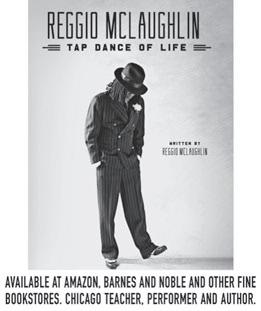

















50 CHICAGO READER - SEPTEMBER 1, 2022 ll Outside Noise Reduction Keeps Bugs & Spiders Out Reduce or Eliminate Fog & Water Noise from Outside? Visit stormsnaps.com or noisewindows.com sales@stormsnaps.com Alpina Manufacturing, Chicago, IL 1-800-915-2828 Soundproofing Window Inserts the platform The Chicago Reader Guide to Business and Professional Services To advertise, e-mail ads@chicagoreader.com home improvement legal books Fun, Clean, Picture Frame assembly JOB $18/hour Tired or bored of clicking away on a keyboard working at home? Keep your hands and mind busy with a fun, safe, clean assembly job. You’d have your own large assembly zone, at least 15-20 feet away from others, so we’re really safe here. Top rated rm Alpina Manufacturing LLC founded in 1992 Beautiful campus in Galewood, near Mars candy, 3 blocks north of Oak Park. We build and sell display framing systems to customers nationwide including Wal-Mart, Verizon, Circle K gas stations, Hospitals. Full time, Part time, Flex hours for working parents or students. We train, no travel, work in Galewood. Open to any backgrounds. Excellent pay, friendly caring management. Stop in anytime between 7am and 4pm M-F ask for Izzy to apply and check us out. Alpina Manufacturing 6460 W Cortland St., Chicago, IL 60707 Brigi e Schmidt Bell, P.C. 847-733-0933 lawyers@bsbpc.com Brigi eBell.com Brigi eSchmidtBellPC Considering Divorce? We Can Help. Collaborative | Prenuptual Divorce | Mediation mental health YOUR AD HERE dance What Greta said . . . 5301N.ClarkSt.Fl.2 CHICAGODANCESUPPLY.COM 773-728-5344 773-616-6969 1234/1250 S. Michigan Ave. In/out. Must call 8 am-9 pm. No annoying texts. European Relax Massage Licensed & Certified Cupping health & wellness shop local Customized Massage Therapy, Intuitive Energy Work, and Holistic Talk Therapy 2514 W Armitage Ave, Suite 211 Chicago, IL 60647 773-697-9278 www.intuithealing.com Open Thursday-Monday BY APPOINTMENT ONLY A Matter of Consequences by Michael W. Falls Available on Amazon and Booklocker A Classic Chicago Mystery
OF HAWAII























SEPTEMBER 1, 2022 - CHICAGO READER 51 the cannabis platform a Reader resource for the canna curious www.neuromedici.com 312-772-2313 Findouttoday ifmedical cannabisorinfusiontherapyis rightforyou.Telemedavailable! Yourpartnersinhealthandwellness. Serving medical cannabis patients since 2015. To advertise, email ads@chicagoreader.com CBD / cannabis recipes, psychedelic drawings to color, word puzzles to stimulate your brain, growing tips, and more! chicagoreader.com/420book The Budrista platform is a cannabis industry and lifestyle project. Its purpose is to support the healthy and balanced lifestyle of cannabis industry workers. Budrista functions through various outlets such as educational programming and recreational events. By signing up, you’ll have first access to our events and programming! CALL 1-855-927-2570 promo code N7017 TM * Prices are per person based on double occupancy plus up to $299 in taxes & fees. Single supplement and seasonal surcharges may apply. Add-on airfare available. Free date changes 100 days before departure for all land tours and cruise tours. Deposits and final payments are non-refundable. Onboard Credit requires purchase of Ocean View or Balcony Cabin. O ers apply to new bookings only, made by 9/30/22. Other terms & conditions may apply. Ask your Travel Consultant for details.
FOUR-ISLAND TOUR GRAND ALASKAN CRUISE & TOUR Oahu •
• Kauai • Maui — Enjoy a fully
with
Vancouver • Ketchikan • Juneau • Skagway • Glacier Bay • Denali Anchorage • and more — Visit
National
and Glacier Bay National Park on the same incredible trip! Cruise through the Gulf of Alaska and the Inside Passage as you discover the best of the Frontier State by land and by sea. 12 days, departs year-round 12 days, departs May - Sep 2023 FROM $2,549 * $2,299 * FROM $2,049 * $1,799 * FREE ONBOARD CREDIT PLAN YOUR DREAM VACATION Become a Published Author with Dorrance. We want to read your book! Trusted by authors for nearly 100 years, Dorrance has made countless authors’ dreams come true. Complete Book Publishing Services FIVE EASY STEPS TO PUBLICATION: 1. Consultation 2. Book Production 3. Promotion 4. Distribution 5. Merchandising and Fulfillment Our staff is made up of writers, just like you. We are dedicated to making publishing dreams come true. Call now to receive your FREE Author’s Guide 844-625-0186 or www.dorranceinfo.com/reader
BEST
Hawaii Island
guided 4-island Hawaiian vacation
centrally located lodging in Waikiki on Oahu, and beachfront lodging on the “Big Island” of Hawaii, Kauai, and Maui. Guided throughout by our friendly Tour Directors—your local experts. Includes 3 inter-island flights.
Denali
Park














































Find a wide range of personalized solutions for all your banking , home equity borrowing , and mortgage needs, all under one roof, from an award-winning team.
products
by Wintrust Financial Corp. banks. Mortgage Lending
provided
our
Wintrust Mortgage. Wintrust Mortgage
& Trust
N.A., a Wintrust Community Bank,
Banking
provided
is
through
affiliate
is a division of Barrington Bank
Company,
NMLS #449042.




SPECIAL QUARTERLY INSERT IN THE CHICAGO READER, PRODUCED BY WINDY CITY TIMES. SEE WINDYCITYTIMES.COM FOR MORE LGBTQ NEWS AND CULTURAL COVERAGE. PAGE 4 ‘THE FIRST HOMOSEXUALS’ New exhibit at Wrightwood 659 16 DR. CARLA ‘C.C.’ CARTER Back in Chicago at Beverly Arts Center 6 KOKUMO The queen of queer soul 8 WINDY CITY TIMES VOL 37, NO. 4 SEPT. 1, 2022 Talking with queer mayoral candidate J Saxon Signal BOOST
PUBLISHER Terri Klinsky
EXECUTIVE EDITOR Andrew Davis
MANAGING EDITOR Matt Simonette
DIGITAL DIRECTOR Jean Albright
ART DIRECTOR Kirk Williamson
BUSINESS MANAGER Ripley Caine
SENIOR ACCOUNT EXECUTIVES


Terri Klinsky, Amy Matheny CONTRIBUTORS



Joey Amato, Carrie Maxwell, Kayleigh Padar, Andrew Pirrotta
WEB HOSTING LoveYourWebsite.com (lead programmer: Martie Marro) (773) 871-7610 FAX (773) 871-7609
Editorial: andrew@windycitymediagroup.com Sales: terri@windycitymediagroup.com
Art/ad copy: kirk@windycitymediagroup.com
Copyright 2022 Lambda Publications Inc./Windy City Media Group; All rights reserved. Reprint by permission only. Back issues (if available) for $5 per issue (postage included). Return postage must accompany all manuscripts, drawings, and photographs submitted if they are to be returned, and no responsibility may be assumed for unsolicited materials. All rights to letters, art and photographs sent to Windy City Times will be treated as unconditionally assigned for publication purposes and as such, subject to editing and comment. The opinions expressed by the columnists, cartoonists, letter writers, and commentators are their own and do not necessarily reflect the position of Windy City Times. Publication of the name, photograph, or likeness of a person or organization in articles or advertising in Windy City Times is not to be construed as any indication of the sexual orientation of such person or organization. While we encourage readers to support the advertisers who make this newspaper possible, Windy City Times cannot accept responsibility for advertising claims.
WINDY CITY MEDIA GROUP, 5315 N. Clark St. #192, Chicago, IL, 60640 U.S.A (MAILING ADDRESS ONLY)


Sept. 1, 2022 2 WINDY CITY TIMES
VOL 37, NO. 3SEPT. 1, 2022 This fall, Howard Brown Health is upgrading your patient portal. The new system, MyChart, o ers personalized and secure on-line access to portions of your medical records. With MyChart, you can: • View all of health information in one place. • See medications, test results, appointments, medical bills, estimates, etc. • Quickly schedule appointments and find care. • Send a message to a doctor and care team. • Take care of children and other family members, all from one account. Learn more at howardbrown.org/mychart SPECIAL QUARTERLY INSERT IN THE CHICAGO READER, PRODUCED BY WINDY CITY TIMES. SEE WINDYCITYTIMES.COM FOR MORE LGBTQ NEWS AND CULTURAL COVERAGE. UPCOMING ISSUES: DECEMBER 8, 2022 • FEBRUARY 23, 2023 • JUNE 15, 2023 TO ADVERTISE: ADS@CHICAGOREADER.COM OR TERRI@WINDYCITYMEDIAGROUP.COM INDEX Talking with queer mayoral candidate J Saxon 4 Howard Brown pres./CEO reflects on COVID’s impact 5 Local LGBTQ+ icon Dr. C.C. Carter returns to Chicago 6 KOKUMO, The Queen of Queer Soul 8 Talking with ‘World’ traveler Annick Adelle 12 froSkate debuts new shoe collab with Nike 12 John D’Emilio on new book, ‘Memories of a Gay Catholic Boyhood’ 14 Chicago filmmaker releases documentary about Joseph Beam 15 TRAVEL: Orlando 17 TRAVEL: Provincetown 18 COVER CREDITS: MAIN STORY: Photo by Marisa KM KOKUMO: Courtesy of KOKUMO “The First Homosexuals” item “Retrato de un anticuario o Retrato de Chucho Reyes y autorretrato,” by Roberto Montenegro (1887-1968), Colección Pérez Simón, Mexico, © Arturo Piera. Dr. Carla “C.C.” Carter: Photo by Kat Fitzgerald





















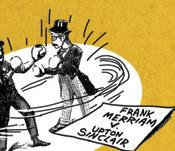














Sept. 1, 2022 3 WINDY CITY TIMES PRESENTS THE TRIBUTE CONCERT AT MILLENNIUM PARK 9.9.22 | 6:00PM | FREE PRITZKER PAVILLION | MILLENNIUM PARK KARLA PEREZ “THE SELENA SHOW” JENNIFER PEÑA MARIACHI PERLA DE MEXICO & TESSA LOPEZ PLUS ILANA’S ILLUSION, VENUS CARANGI, ANGELICIA DIAMOND, LUNA LA CATRINA, AND IVANNA RUBIO NOW PLAYING THROUGH SEPTEMBER 18 615 W. Wellington Avenue (at Broadway), Chicago 773.281.8463 timelinetheatre.com
POLITICS
Signal BOOST
With the 2023 mayoral election rapidly approaching, names such as Ald. Raymond Lopez, businessman Willie Wilson and, of course, incumbent Lori Lightfoot have proven to be some of the most recognizable so far.
However, J Saxon, a genderqueer Bolivia-American activist, hopes to put his name in the mix. Saxon talked about their new bid for the city’s big seat.
Note: This interview has been edited for brevity and clarity.
Windy City Times: You have been a critic of Lori Lightfoot since her original bid for mayor. Given the tumultuous last few years, how would you have handled things differently with regard to COVID and the civil unrest?
J Saxon: With COVID, the major difference would have been consistency. There were a lot of big media criticisms of the extremes we went through in order to keep Chicagoans indoors for the summer of 2020, but then a year later, with the advent of vaccines, we went from 0-60 with our regulations. Suddenly everyone was allowed
outside again, Lollapalooza even happened. … I would have kept the consistency that local, state and federal governments have dropped. There are currently 500 Americans dying each day of COVID, but we are not giving it nearly the attention it got in 2020 or 2021. In terms of civil unrest, I think that a major criticism I have is the time that the mayor shut down public transit and raised the bridges; this kept working Chicagoans from being able to get home, keeping thousands of people stranded in the financial district.
WCT: How did your journey for political office begin?
JS: It all started when I began having political conversations in different friend groups as early as December of last year, trying to figure out who we were going to submit 14 months in advance. I confronted a friend, and they suggested that I run given my online presence and personality. I later got a call informing me of the murder of a close friend in the queer community in Logan Square, and that spurred me to combat Lori from the left and from the queer community. … Winter is hard here but this winter, in particular, made
Talking with queer mayoral candidate

J Saxon
BY ANDREW PIRROTTA
in the South and West sides. That looks pretty good, but it kinda blindsided me that it came out in this 11th hour. Where was this two years ago? There could have been that effort the whole time. I don’t want to be critical of that effort now because it is important to redirect resources to those areas. But I would like to see the same numbers of support that the casino got. It’s great to have one project to have in line with the views of progressivism, but we have one plan like that and 10 others that are corporate-minded.
WCT: It is no small achievement that this city elected a cis lesbian woman. What sort of challenges do you face as someone who is gender non-conforming? Are there any advantages?
me re-evaluate what I care about and who I am. I put the idea on the backburner and went to the AIDS Memorial Garden. And I felt like the event was a glorified electioneering position for Pritzker and Lightfoot. I found the speeches to be offensive—that they were framing AIDS as something that was over. The refrain from both Lightfoot and Pritzker was that a lesson had been learned and that we were applying what we had learned to the present moment. In that moment, I was in the crowd and fuming. … I walked up to the podium, and I started screaming at Pritzker and Lightfoot. I said, “How dare you come here and tell us that AIDS was a lesson we’ve learned when there are still people dying every day from COVID? You’ve taken this out of your responsibility as leaders, but where is your leadership?”
WCT: In what ways do you think the city is headed in the right direction?
JS: It’s easy to be critical, but it’s interesting to see what is working well. I think that some of the newer initiatives that Lightfoot waited until this election year to pull out. The one Chicago plan where we’re working to address equity
JS: I’ve noticed that people who have followed my campaign are from gender-diverse backgrounds. They’re coming from younger demographics. The advantage to being gender-diverse is that it’s so inspiring for people to see someone like themselves in politics. I think that the challenge is that not many people read me as gender-diverse; people use “he/him” for me all the time. I have to consolidate the amount of energy that I have to spare to correct people about how they perceive me. I would rather have them not misinterpret what I stand for over who I am. It’s not fair for me to criticize Lori for running on identity politics while also doing the same. I can’t lie about who I am. And ultimately, the intersectional identities that I represent inform my values and how I interact with people from certain communities. But ultimately people shouldn’t vote for me because I check certain boxes.
WCT: How do you honestly assess your chances of becoming mayor in a packed race like this?
JS: The only advantage that I have is that I have totally different stances on these issues. The hardest part for me is currently fundraising to be able to meet the level of visibility other candidates [have]. What I can do is show up at places to fight for people who need to be heard. I go places I have never been to meet people I have never met. To me, it’s not about the fact that I have to win because if I am not doing this, how can I expect someone else from my community to stand up for what they believe in? So far, I have many people in my friend group that are inspired just because I am trying. It’s to bring people hope that someone who isn’t a political insider—who doesn’t have this clout—can try and do this and do it in a way that is authentic and sincere in the way that we connect with the communities that we care about.
Be sure to visit www.saxonformayor.com for more information regarding Saxon’s campaign.
Sept. 1, 2022 4 WINDY CITY TIMES
J Saxon. Photo by Marisa KM
Howard Brown president/CEO reflects on COVID’s impact


 BY MATT SIMONETTE
BY MATT SIMONETTE
According to Howard Brown Health President and CEO David Munar, the early days of the COVID-19 pandemic seemed eerily similar to the AIDS crisis of the ‘80s.


“We saw all the same patterns at the dawning of COVID—a lot of skepticism, mistrust, medical misinformation, confusion—and then poor response systems,” Munar said. “…There was a really strong recognition that mobilizing through public health was a core capacity, and a unique capacity, that we need to share.”
Now, well over two years after the pandemic took its hold both across the city and across the globe, Howard Brown Health has been transformed by it. Some of those changes, among them the extensive application of telehealth appointments, have been positive, Munar noted, while other changes, such as increased waits for in-person visits, less so. In recent months, the facility has taken part in efforts to control and treat for transmissions of the monkeypox virus (MPV) as well.
Another challenge has been the Great Resignation, which has also taken its toll on Howard Brown Health. Non-nursing Howard Brown employees, citing burnout, understaffing and what
employees told Block Club Chicago was a “toxic” work culture voted to unionize in August. Nursing employees already unionized in 2019. (In response, Munar said in a statement, “I’d like to extend a heartfelt congratulations to the organizers, everyone who voted, and all staff who push Howard Brown to be the best it can possibly be. As we take the next steps in the process, we will move forward together in support of our patients and clients, seeking at all times to improve the workplace experience for our valued employees.”)
Munar said that, at the height of the pandemic, turnover was about 2-5% a month, a figure he said was steep. A huge surge in demand for in-person appointments at Howard Brown further began in 2021.
“A lot of that [that demand] is great,” Munar said. “People weren’t going in 2020 and people thought that in 2021 it was safe. It all spiked last summer. We saw a lot of people having health complications, not from COVID but from chronic conditions that had not been managed the last few years. We see more viral-suppression [issues], substance abuse, depression and anxiety. There was a real spike in health care needs in that period.”
The federal government awarded relief funding to meet the surge in demand for medical services,
but those funds are tapped out, Munar said, adding, “We’re having to rework our new cost centers with our old cost structure—that’s a challenge that all health centers are facing.”
Telehealth capabilities provided some relief for capacity for patients with chronic health conditions such as HIV/AIDS. Patients generally got lab tests on-site and then discussed their results with providers via telehealth. That worked well for patients with online access and the means for privacy, but others who could not get online faced barriers staying on a continuum of care.
“We saw a whole lot of health issues got worse in the first two years,” Munar said. “In the hierarchy of needs, maintenance visits took a back seat—the crisis du jour takes precedence over everything else. We saw that.”
Telehealth is here to stay, he added, but Howard Brown is using it much less. “Some of the providers were wanting to do more comprehensive examination of patients. Some providers are doing a half-day of telehealth for their patients and it [takes the place of] visits where there
weren’t going to be labs or physical exams—to talk about treatments only. The model is physical visits supplemented by telehealth.”
Howard Brown has developed several plans should more insidious variants of COVID appear and require massive precautions, and rely on Centers for Disease Control and Prevention (CDC) guidelines. “Recommendations have changed and they probably will continue to.”
Munar admitted that the entire cost model of healthcare will “continue to be a big issue” going forward.
He added, “It’s become more complicated to deliver healthcare, and it’s slower. Then there’s the telehealth issue—what are the right uses and who pays for it? And the feds discontinued paying for COVID testing for people who are uninsured. Things like that sound like obscure, arcane issues, but over the next period of time, we’re going to see fewer of these pop-up COVID testing sites and less access for people who aren’t insured. Those are all big issues I’ve been hearing about.”
Sept. 1, 2022 5 WINDY CITY TIMES angelagreenman.com
Howard Brown Health President and CEO David Munar.
Photo by Matt Simonette
Local LGBTQ+ icon Dr. C.C. Carter returns to Chicago in a new position
BY ANDREW DAVIS
Dr. Carla “C.C.” Carter is back.
After being away for a few years and embarking on a few adventures (like graduating from seminary school), Carter—an acclaimed writer, poet, and performer—is back in Chicago as managing director of the Beverly Arts Center. The Chicago LGBT Hall of Fame honoree recently talked with Windy City Times about adjusting to her new role, being in the LGBT Hall of Fame, and noticing the differences between where she was and where she is now.
Windy City Times: You’ve been away for a few years—and you were in Arkansas, correct?
Dr. Carla “C.C.” Carter: Correct. So, a lot of people don’t know that I left [Chicago] specifically because my father has passed away, and my parents had retired there. My family had contacted me, saying my mother wasn’t doing well. So [partner] Ronnie [Fortenberry] and I went down there to visit and realized she wasn’t doing well. Then, Ronnie said, “You only get one mom if you’re lucky” so we dropped everything and [moved] there.
For the first year and a half, my [employer] here didn’t want to lose me so I’d spend two weeks in Chicago and two weeks back in Arkansas. After that, I became a consultant at Philander Smith College. From there, the president saw I had been a teacher so I became an instructor there. Then I co-wrote an application for a $900,000 grant and became department chair for visual and performing arts.
WCT: But you also went to seminary.
Carter: Yes. So I graduated from Jacksonville Theological Institute, but it was the Christian education part of teaching, not necessarily seminary.
WCT: Okay. I think different people have different ideas of what is involved with attending such a school. What did you learn?
Carter: So it was no-brainer, actually. I was
looking to get my doctorate in the arts, and I also wanted to be in a space that affirmed all of my intersections. And I’m also a PK [preacher’s kid]…
WCT: You and Grace Jones.
Carter: [Laughs] Yes—THAT kind of PK. Those who saw me on stage would say, “Wait-what?” [Both laugh.] But there’s something very spiritual in the erotic so, to me, they coincide.
But this school had one of the few programs that was hybrid even back then [in the 2010s] so I could do it online. I had to travel to defend my dissertation but it was a path I really liked because I could incorporate the counseling component with vocational discernment. I wanted to not bring a religious vibe to the classroom, but bring a practical and spiritual approach. My doctorate is in Christian education, with an emphasis in educational leadership. I recommend it to anyone who’s thinking about going.
WCT: Let’s talk about Beverly Arts Center and your role.
Carter: Growing up in Roseland and Chatman, Beverly was like Oak Park/River Forest for the South Side; it’s where Black upper- and middle-class folk lived—although there was the Great Migration to places like Beverly and Mt. Greenwood. The center was a place where you got your formal introduction to the fine arts: dance, theater and visual arts. It’s one of the few community art spaces that’s not specific to one genre; we specialize in all the major art forms.
Everybody here now is new. Our artistic director, Kevin Pease, is dynamic; he graduated from Northwestern. There is a full professional theatrical program, unlike what you’d find at a community theater. Our actors are getting paid and we’re focusing on Chicago stories, directors and artists.
And my job is managing director so we co-lead the organization. It’s working on fiscal management, grant writing and development, and marketing.
WCT: I didn’t realize—and I’m not sure you know—that it’s been exactly 20 years since
you were inducted into the Chicago LGBT Hall of Fame.
Carter: Oh, my goodness. I didn’t know!
WCT: What do you remember about that night in 2002?
Carter: I felt like Sally Field: “You like me. You really do like me!” [Both laugh.]
Honestly, I was just doing the work I loved— and to be recognized for doing spoken-word poetry and being part of A Real Read and for doing the work I was doing on the South Side for LGBTQ folk… We had the first all-lesbian and transgender Vagina Monologues and I had just written a book of poetry. To be recognized for doing that is something I will always cherish. I still have the award.

Twenty years—wow… I was 38 when I got that; I’m 58 now.
WCT: So my last question is something I’ve asked a lot of different people. Over the past two years, we’ve all had to deal with COVID and quarantining, we’ve seen the George Floyd murder and experienced the aftermath, and we’ve had a lot of time to think. What did you learn about yourself?
Carter: Hmmm… I’m back in Chicago so that should tell you something.
So Arkansas was interesting, and being in Little Rock was even more. In New York and Chicago, where I spent my formative years, and being able to hold my partner’s hand in public, I was able to be a vocal and unapologetic Black woman. Being
Sept. 1, 2022 6 WINDY CITY TIMES
Carla “C.C.” Carter performing The Vagina Monologues in 2008.
Photo by Kat Fitzgerald
in the pandemic exacerbated all the pressures I felt about the intersections that I felt before it. It was unsettling to see and feel the silencing of Black folk during the time of Black Lives Matter, George Floyd and Breonna Taylor. In Arkansas, very few people were vocal.
It was quite unsettling to see the proliferation of Trump ads. I had never been in a space like that. However, I’m grateful for that experience because I saw what real advocates had and have to deal with in spaces like that to make even the smallest impact.
I think about Chris Jones, a graduate of Morehouse, who is running for governor in [Arkansas] now. People think he doesn’t have a chance; maybe he doesn’t, but what we isn’t afraid to do is bring the issues of the people to the forefront. That is huge right now.
But I also think about the trigger states and Roe v. Wade. Arkansas [has] all three abortion bans—whether the mother’s life is in danger, or if incest or rape is involved. So some forward-thinking people, including myself, bought Plan B; I

was going to give it to the nurses in my school— but the nurse cannot accept it. So there are repercussions for Black, Brown and poor people; Arkansas is one of the few states in which there are more poor white people than people of color.



So you have all that—abortion, the pandemic, the NRA—was starting to build. In essence, I needed my later years to be my greater years. And when I needed it, this job came along on Indeed. Last year, I said, “God, for me to move back to Chicago, I need a job that wouldn’t have me go downtown every day. It has to be perfect arts-related job that’s financially sustainable because the snow in Chicago is no joke.” [Laughs] I pushed the “Send” button on Sunday and I got a call that Tuesday for an interview; [soon after,] I was offered the position. I have been ecstatic.



Some of the programs taking place at the Beverly Arts Center this season include The Fantastics, The Christmas Schooner and A Raisin in the Sun. More about Beverly Arts Center, 2407 W. 111th St., is at https://thebeverlyartscenter.com/.


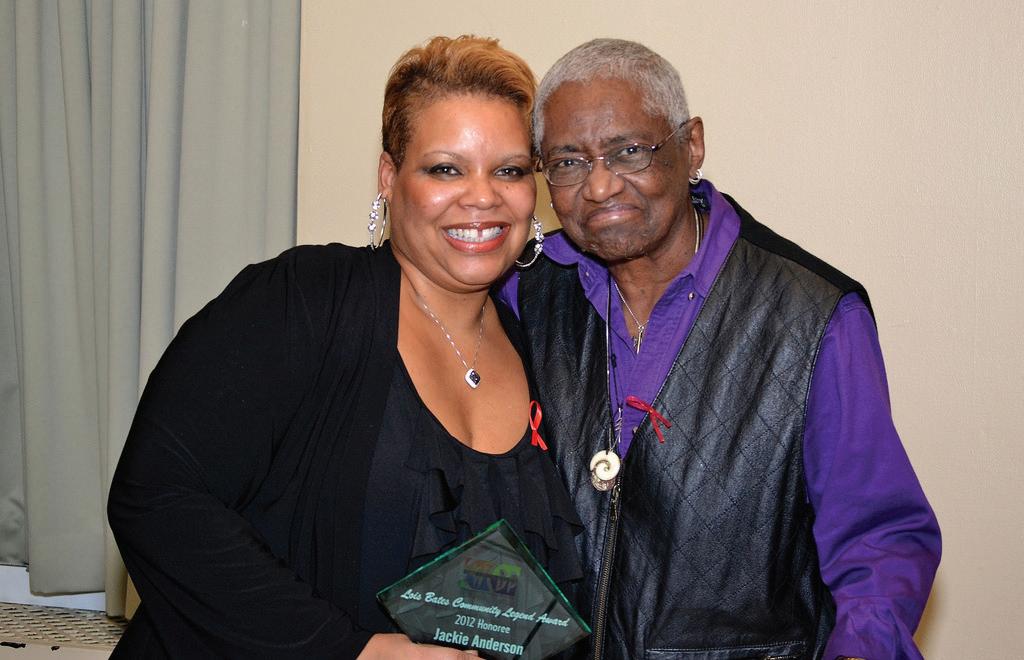


 BY LYNN NOTTAGE | DIRECTED BY KATE WHORISKEY
BY LYNN NOTTAGE | DIRECTED BY KATE WHORISKEY
Sept. 1, 2022 7 WINDY CITY TIMES GoodmanTheatre.org 312.443.3800 Groups 10+: Groups@GoodmanTheatre.org Lead Corporate Sponsor Major Corporate Sponsor Lead Funder of IDEAA Programming “Feisty comedy is on the menu” (Washington Post ) in two-time Pulitzer Prize winner Lynn Nottage’s latest Broadway triumph. Creating the perfect sandwich is the shared quest of the formerly incarcerated kitchen staff of Clyde’s, a truck stop cafe. Even as the shop’s mischievous owner tries to keep them under her thumb, the staffers are given purpose and permission to dream—finding that “sometimes a hero is more than a sandwich” (New York Times).
SEPTEMBER 10 – OCTOBER 9
SPECIAL OFFER: Get $30 main floor tickets with code READER *Not valid on premium seating, on previously purchased tickets or in combination with other offers. “A FLAVORBOMB OF A NEW COMEDY ” VARIETY
Illustration by Carolina Lopez Corominas
Carla “C.C.” Carter with late activist Jackie Anderson in 2012.
Photo by Ed Negron
Carla “C.C.” Carter with partner Kayron “Ronnie” Fortenberry in 2011.
Photo by Jerry Nunn
The Queen of queer soul
KOKUMO talks about moving to New York City, other endeavors
BY CARRIE MAXWELL
NOTE: This article contains references to rape and violence.
The multifaceted artist KOKUMO, The Queen of Queer Soul has recently released a new album, Wildflowa’: Da’ Prelude Ta’ Freedom Mixtape, featuring 16 tracks focusing on traumatology, Afro-Elysium and other topics.

KOKUMO’s journey features many accomplishments. She wrote a poetry book, Reacquainted With Life, in 2016 that went on to win the Lambda Literary Award in the transgender poetry category during the 29th annual awards ceremony in 2017. KOKUMO also won the Motha Art Award in the non-cis female musician category in 2013.
Locally, she was also the recipient of a Windy City Times 30 Under 30 Award in 2011. KOKUMO also founded what she said is the first multimedia production company run by a non-cis woman: KOKUMOMEDIA, Inc. With this company she founded Chicago’s first transgender pride event T.G.I.F. (Trans, GNC, Intersex Freedom) in 2012 under her KOKUMO Philanthropy subsidiary as well as KOKUMORECORDS and KOKUMO Magazine. Through her KOKUMORECORDS subsidiary, she launched the Underground Railroad music tour.
Windy City Times: You recently re-emerged after several years away from the public eye. Why did you step away and what made you reemerge now?
KOKUMO, The Queen of Queer Soul: I got gangraped at the afterparty for the Trans 100 in 2014 and after that I had to step away because I did not receive any support from the community. That threw me for a loop because—as a survivor of corrective rape, ritual abuse and family gang rape—I thought that when I was in my twenties that was over with, but here I was with my own LGBTQ community (people I thought were my sisters and brothers) getting gang-raped. After having all my innovations being stripped from me by the skinny, light-skinned girls; now my body was being taken from me in a setting I thought
was safe. I had enough. My heart was devastated because I grew up in a family that did not love me.
I spent the last years of my twenties in a string of mental breakdowns, including time spent in a psych ward, [because of what happened] at the Trans 100. My mind could not process that I would never be loved as a Black, dark skinned, plus-size non-cis woman. My mother, brothers, cousins, uncles and aunts did not love me and I understood that but when I came into the LGBTQ community, I thought I had finally found love which was not true. To me, “community” is just a word used to get funding—which drove me mad. What I had to do was take all that pain, pray for understanding and deliverance from the grief, and then put it into a project which is where my latest album came from.
I am a survivor of physical, sexual, emotional and ritual abuse. The contributions I have made are because I want to be seen, heard and loved just like anybody else.
WCT: Why did you name your YouTube channel Queer Soul? How would you describe your musical style?
KOKUMO: For so long we have had trap and alternative R&B music but neither of those genres had a place for me as a non-cis woman. That is why I had to come up with a genre that spoke to who I am and that is why I named my channel Queer Soul.
“Queer soul” gives me the ability to be my proud, deep-voiced, oceanic, instrumented, unabashedly Black, dark skinned, plus-sized, queer, non-cis female self. My music is a testament to myself, and my instrument is my battle cry.
WCT: Talk about the meaning of your album title, Wildflowa’: Da’ Prelude Ta’ Freedom Mixtape.
KOKUMO: This album is a part of a trilogy of albums that began in 2018 when I was living with my mother of origin at the time who would not talk about what happened to me as a child, so she kicked me out even though I was the one paying the bills, not her. That first album was
titled Wildflowa’.
These albums are about my desire to be seen as a Black, dark skinned, non-cis woman. We do not all have to be skinny, but we do deserve to be heard. This is an album for every survivor, whoever you are and wherever you are.
When I was doing my Underground Railroad tour, which was a tribute to Harriet Tubman, I went city to city singing to Black queer people about freedom and what it looks like. During that final stop in Baltimore, I had a psychotic break. This was after I was gang raped during the Trans 100 afterparty. I was in a shelter in Baltimore because I had to leave the place I was staying
at the time because it was not safe. I remember walking through West Baltimore barefoot after a verbal altercation with some cis women in the shelter and hearing someone say, “That woman is wild” and I thought to myself, that is the greatest compliment I have ever heard because if a woman is not wild, they will not make it. I have really had to learn to tap into my savagery, fierceness, the lioness within me and God. So, this trilogy is my exploration into what it means to be a wild woman.
I wrote a poem called “Wildflowa” that explains the meaning of my current album:
Sept. 1, 2022 8 WINDY CITY TIMES
KOKUMO, The Queen of Queer Soul. Photo courtesy of the artist
MUSIC
i have cried arms stretched to a god i don’t believe in but sumbody said i shud tears falling like niagra creating oceans where i leave them all in search of home i long for the untilled soil from whence i sprang both unannounced and unwelcomed waving my arms and sangin’ a song nobody wanted ta hear but happy cuz i was where the wildflowas grow on land most dare not tread where the monster in me could lie dormant so the child in me could run free cart-wheeling, and rolling down heels until riverbeds put me to sleep did i tell you that i have cried? because i belong where the wildflowas grow but have been plucked from nature where i was promised and thrown into cellophane and sold like a universe tricked into a pocket dimension like a pola’ bear wakin’ up in the Amazon my wings dun turnt ta cement n my smile a bagga bricks somebody take me where the wildflowas grow for that is my natural habitat where seed is promise dirt is the only religion and the wind is a high-five from God i ask you would you sell the sun or auction off the moon then why a flower especially one meant to be wild? wild meaning primitive unruly and uncontrollable flower the symbol of beauty grace and fragility wildflower a species of flower known to grow in the most unexpected and inhospitable of places i be’s a wildflowa primitive yet graceful unruly but fragile uncontrollable and all the more beautiful for it wildflowas bloom
and dance a jig of divine contradiction for I promise you are the most beautiful oxymoron there eva was and will be!
This album and the title is an ode to wild femmes and, quite frankly, an ode to scapegoats. Recently, I learned about the term “scapegoat
child,” [which] exists in every dysfunctional family. That scapegoat child is, for whatever oppressive reasons, is deemed as the problem for the whole family. I was the scapegoat child. I was always going to be vilified for all of my intersecting identities. I was blamed for all the mistakes my other family members made. I wanted to create an album for every scapegoat child, so they know they deserve more from the life that was handed to them. My message is to be wild and be free.
The final album in the trilogy will be called Wildflowa’: A Black Girl in Bloom, which will focus on what it means to heal.
WCT: What do you want to tease from your album, including using the words “traumatology” and “Afro-Elysium” for some of your song title choices?
KOKUMO: I use “traumatology” because it is the story and study of abuse. Where it stems from and how it matriculates through the body. What we know about traumatology, which is a science, is that it creates physical disease and mental illness as well as results in people’s deaths. After doing an emotional inventory of my lifelong trauma of having a mother who thought I was a demon, both parents being addicted to crack leading to me being trafficked so they could get a hit and my cis female cousins correctively raping me from my early childhood to my early twenties I was able to put that to music with these traumatology tracks. Whatever your story is you can listen to these songs and find out what your traumatology is and make peace with it so you can move forward. We make peace with our trauma, or our trauma will leave us in pieces.
“Afro-Elysium” is what propelled this album forward. I grew up in a demonic environment with a highly religious Christian Southern Baptist family where everything that is not cisgender and heterosexual is demonized. After all this suffering I experienced, they say that it builds character and brings reward so I asked myself when I leave this Earth will there be a heaven just for me and all the queer people so we do not have to explain or justify ourselves to anyone anymore. That is where the concept of Afro-Elysium comes from. [Elysium is the concept of the afterlife that some Ancient Greeks believed in].
The first of the three Afro-Elysium songs tell
the story of a dark skinned non-cis woman who died by suicide. The second song is where she goes to heaven and the first person she sees is Marsha P Johnson and all the beautiful non-cis women who have been murdered and they are voguing, singing, dancing and doing sex work in peace. The woman meets God who is also a noncis woman. God tells her that she should not have killed herself and sends her back to Earth with a mission to keep doing the work to make things safer for the next generations. The third song is about her being back on Earth living her truth and kicking the world’s fucking ass. That is what the whole album is about.
WCT: Talk about your new record company, Born Worthy Records, including the name choice.
KOKUMO: I chose the name because I was born worthy and we all were born worthy. This is especially true for non-cis women of color, and especially dark skinned plus sized non-cis Black women realizing they were born worthy.
WCT: Why did you upload all your songs to your Queer Soul YouTube and Spotify channels and essentially make them free to the public?
KOKUMO: That is where the colorism and sizeism comes into play. I do not have the machine and financial backing yet. I must tell my truth and pray that my KOKUMITES, which is what I call my fans, will receive me as a musician. At the end of the day as long as people are listening to my music we can heal together from our collective trauma.

In the future, I hope to be able to monetize my music, but for right now I want to get my story out and inspire other people to tell their stories as well.
WCT: Why did you leave Chicago and move to New York City?
KOKUMO: I had to leave in 2020 because my mother wrongfully called the police on me and got me arrested, which led to me being repeatedly attacked physically. I wanted to leave behind all the trauma my relatives inflicted on me. I thank God and her angels that I got out of Chicago.
Also, after all the advocacy work I had done in Chicago, I felt like I deserved better. I built up so much LGBTQ infrastructure in Chicago and
then I see that there are other people who are being inducted into Chicago’s LGBT Hall of Fame before me, which felt like a dismissal of all the work I had done. I got tired of what I call the social-justice industry in Chicago. For so many of these people, it is all about the virtue-signaling and getting a platform, not actually being in community with and helping other people. I felt unsafe in these spaces. I gave the city all that I had, and I did not want to be there anymore.
I moved to New York City because, outside of Chicago, I was partially raised there and North Carolina. I always said that I am down south, Midwest, east coast type of girl. I had to go where I could be free. The healthcare is better here. It is bigger and a better city. There is not as much trauma here. I did not have to stay in places that constantly challenged me to prove my worth. In New York City, I can walk the streets and be seen as the woman I am without any problems. I do not have to worry about running into enemies who could still hurt me.
WCT: What other projects are you working on?
KOKUMO: I am working on the follow-up album to Wildflowa’, which is titled Tethys (Goddess Of The Forgotten). I named it Tethys after the forgotten Tethys Ocean that existed on Earth about 200 million years ago. What if Tethys corporealized into a water goddess who said, “Do you remember me? I gave you your first breath, yet you forgot me.” This new album is a euphemism and allegory of what it means to be forgotten as a woman. If all those women came back in one form, the original water goddess Tethys.
WCT: What overarching message do you want to share with the readers?
KOKUMO: To my KOKUMITES a poem called Survivor’s Guide from my book Reacquainted With Life:
I am not what you did to me.
I am not what you did to me.
I am not what you did to me.
I am not what you did to me.
I am not what you did to me.
I am not what you did to me.
Also, no matter what the abuse, how frequent and/or how intimate the person is who did it to you we are not what is done to us. We are our ability to survive, overcome, persist and move on regardless of our circumstances. That is what Wildflowa’: Da’ Prelude Ta’ Freedom Mixtape is all about. I am telling my story and you should feel empowered to tell yours. I am not dying with anybody’s secret or from anybody’s secret.
See KOKUMO’s Queer Soul YouTube channel, KOKUMO’s Spotify channel, instagram.com/ bornworthyrecords/?hl=en and windycitytimes.com/lgbt/BOOKS-KOKUMO-becomes-Reacquainted-with-Life/57008.html to read more about her book.
If you are seeking resources to deal with sexual violence, contact www.ourresilience. org, www.rainn.org/resources or www.thetrevorproject.org
NOTE: This interview has been edited for length and clarity.
Sept. 1, 2022 9 WINDY CITY TIMES
KOKUMO, The Queen of Queer Soul’s album Wildflowa’. Image courtesy of the artist
IMPORTANT FACTS FOR BIKTARVY®
MOST IMPORTANT INFORMATION ABOUT BIKTARVY
BIKTARVY may cause serious side e ects, including: Worsening of hepatitis B (HBV) infection. Your healthcare provider will test you for HBV. If you have both HIV-1 and HBV, your HBV may suddenly get worse if you stop taking BIKTARVY. Do not stop taking BIKTARVY without first talking to your healthcare provider, as they will need to check your health regularly for several months, and may give you HBV medicine.
ABOUT BIKTARVY



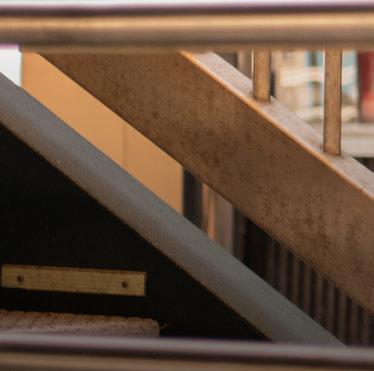





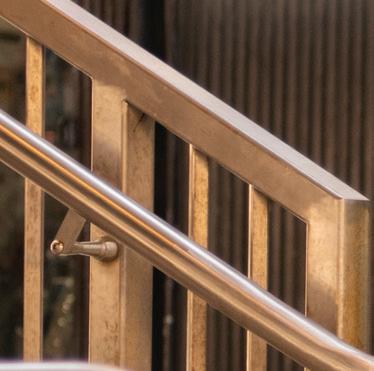
BIKTARVY is a complete, 1-pill, once-a-day prescription medicine used to treat HIV-1 in adults and children who weigh at least 55 pounds. It can either be used in people who have never taken HIV-1 medicines before, or people who are replacing their current HIV-1 medicines and whose healthcare provider determines they meet certain requirements.
BIKTARVY does not cure HIV-1 or AIDS. HIV-1 is the virus that causes AIDS.
Do NOT take BIKTARVY if you also take a medicine that contains: dofetilide rifampin any other medicines to treat HIV-1
BEFORE TAKING BIKTARVY
Tell your healthcare provider if you: Have or have had any kidney or liver problems, including hepatitis infection. Have any other health problems. Are pregnant or plan to become pregnant. It is not known if BIKTARVY can harm your unborn baby. Tell your healthcare provider if you become pregnant while taking BIKTARVY. Are breastfeeding (nursing) or plan to breastfeed. Do not breastfeed. HIV-1 can be passed to the baby in breast milk.
Tell your healthcare provider about all the medicines you take: Keep a list that includes all prescription and over-the-counter medicines, antacids, laxatives, vitamins, and herbal supplements, and show it to your healthcare provider and pharmacist.
BIKTARVY and other medicines may a ect each other. Ask your healthcare provider and pharmacist about medicines that interact with BIKTARVY, and ask if it is safe to take BIKTARVY with all your other medicines.


POSSIBLE SIDE EFFECTS OF BIKTARVY
BIKTARVY may cause serious side e ects, including:
Those in the “Most Important Information About BIKTARVY” section.

Changes in your immune system. Your immune system may get stronger and begin to fight infections that may have been hidden in your body. Tell your healthcare provider if you have any new symptoms after you start taking BIKTARVY.
Kidney problems, including kidney failure. Your healthcare provider should do blood and urine tests to check your kidneys. If you develop new or worse kidney problems, they may tell you to stop taking BIKTARVY.
Too much lactic acid in your blood (lactic acidosis), which is a serious but rare medical emergency that can lead to death. Tell your healthcare provider right away if you get these symptoms: weakness or being more tired than usual, unusual muscle pain, being short of breath or fast breathing, stomach pain with nausea and vomiting, cold or blue hands and feet, feel dizzy or lightheaded, or a fast or abnormal heartbeat.


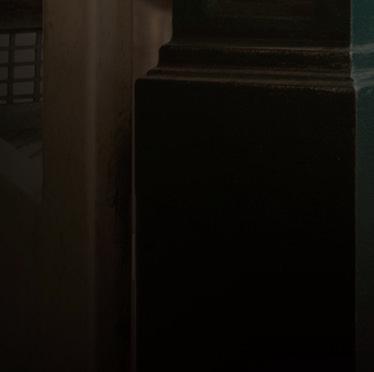
Severe liver problems, which in rare cases can lead to death. Tell your healthcare provider right away if you get these symptoms: skin or the white part of your eyes turns yellow, dark “tea-colored” urine, lightcolored stools, loss of appetite for several days or longer, nausea, or stomach-area pain.
The most common side e ects of BIKTARVY in clinical studies were diarrhea (6%), nausea (6%), and headache (5%).
These are not all the possible side e ects of BIKTARVY. Tell your healthcare provider right away if you have any new symptoms while taking BIKTARVY.
You are encouraged to report negative side e ects of prescription drugs to the FDA. Visit www.FDA.gov/medwatch or call 1-800-FDA-1088.
Your healthcare provider will need to do tests to monitor your health before and during treatment with BIKTARVY.
HOW TO TAKE BIKTARVY
GET MORE INFORMATION
Sept. 1, 2022 10 WINDY CITY TIMES
Take BIKTARVY 1 time each day with or without food.
This is only a brief summary of important information about BIKTARVY. Talk to your healthcare provider or pharmacist to learn more. Go to BIKTARVY.com or call 1-800-GILEAD-5 If you need help paying for your medicine, visit BIKTARVY.com for program information.
is only a brief summary of important information about BIKTARVY and does not replace talking to your healthcare provider about your condition and your treatment. (bik-TAR-vee) BIKTARVY, the BIKTARVY Logo, GILEAD, the GILEAD Logo, GSI, and KEEP ASPIRING are trademarks of Gilead Sciences, Inc., or its related companies. Version date: February 2021 © 2022 Gilead Sciences, Inc. All rights reserved. US-BVYC-0085 02/22 US_BVYC_0085_BIKTARVY_B_9-75x9-875_WindyCityTimes-Dimitri_r1v1jl.indd All Pages
This









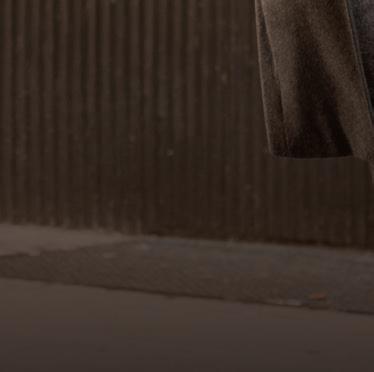





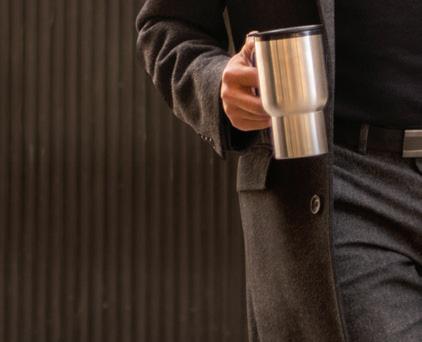








Sept. 1, 2022 11 WINDY CITY TIMES KEEP ASPIRING. , 04/19/2019 through 05/28/2021. IQVIA NPA Weekly #1 PRESCRIBED HIV TREATMENT * BIKTARVY® is a complete, 1-pill, once-a-day prescription medicine used to treat HIV-1 in certain adults. BIKTARVY does not cure HIV-1 or AIDS. Ask your healthcare provider if BIKTARVY is right for you. Because HIV doesn’t change who you are. ONE SMALL PILL, ONCE A DAY Pill shown not actual size (15 mm x 8 mm) | Featured patient compensated by Gilead. Please see Important Facts about BIKTARVY, including important warnings, on the previous page and visit BIKTARVY.com. Scan to see Dimitri’s story. DIMITRI LIVING WITH HIV SINCE 2018 REAL BIKTARVY PATIENT 5/26/22 11:45 AM
COMEDY
A life in ‘Between’
Talking with ‘World’ traveler Annick Adelle
BY ANDREW PIRROTTA
Bay Area attorney Annick Adelle (they/them) has decided to face one of her biggest fears: stand-up comedy. After starting in 2016, she is releasing her own album and touring throughout the United States. In Between Two Worlds, Adelle (who lives between gender norms, but who also uses she/her pronouns) talks about living between worlds—between genders, between corporate America and a career in the arts, and between NYC and Germany.
Windy City Times: What were you doing in San Francisco, originally?
Annick Adelle: I was a licensed attorney by trade, and because the tech company was headquartered in San Francisco, they invited me to work at headquarters. Then I had six weeks off because I was with them for five years, so I said, “Perfect. I’m going to do something that scares the hell out of me”—and that was stand-up comedy. Ever since then, I was hooked.
WCT: As a kid, were you the funny one in your family?
AA: Yeah, I mean without knowing. But in hindsight that was all I was doing at parties, with girls; I was trying to be the funniest person.
WCT: What does your family think about this new career change?
AA: I was on the trajectory to be general counsel of Airbnb or something. It’s kind of like coming out. You have to choose happiness. You can’t be what everyone else wants you to be. In the beginning they questioned what I was doing, but now they’re supportive. They recognize you’re a person, so they’re now going around and rooting for me.
WCT: Have they been to one of your shows yet?
AA: Oh, yeah, and my mom doesn’t even speak English. She was just sitting there, laughing. I was even talking about her, telling people that she was my mom and she didn’t understand a thing I was saying.
WCT: Having done standup in both Europe and the United States, what is Europe like? What’s the difference between the crowds?

AA: They’re all good spirited. No one shows up to be an asshole. Everybody gives you kudos for doing this because it takes guts. They all recognize that. I will say that European crowds are very attentive and have maybe a longer attention span. You can tell a story and they won’t get bored or anxious. I’m not judging this is just what I dealt with. Europeans will be a little bit less forgiving if the joke isn’t clever. I think in America people are more open to silliness and risk taking. There are a lot of differences and it is very interesting. ... In America if people clap that’s like whoa, a big deal. In Germany they clap because they appreciate it.
WCT: What did you listen to growing up? Who did you watch?
AA: Well, that’s the interesting part. I was raised in Germany. I wasn’t born there. There wasn’t a standup culture when I was growing up there. Open mics didn’t exist. What existed was satire and political commentary, obviously funny, but stand-up comedy did not exist. So I didn’t have anyone to look up to. So my comedic inspiration was just me. But then when I got to the states I realized this was a job, this was a career. I don’t have anyone that I look up to. I’m trying
to be my own.
WCT: Was doing standup a dare to yourself?
AA: Absolutely. It was a challenge to myself. It had been on my mind for years, but I never had the guts to do it. To do it was two things. Hey, maybe you’ll actually keep doing it. And secondly, let’s see if I’ve got the balls. I came off the stage like that’s exactly what I want to do. I mean, it was terrible—everyone’s first time is—but I knew what I wanted to do.
WCT: What advice do you have to LGBTQ+ youth wanting to get started in stand-up comedy?
AA: I struggle with this topic because it is both who I am, an LGBTQ member, and I love the community and the cause. I’m always going to route for minorities. At the same time, I want to talk about it on stage, but I don’t want to talk about it just on stage. ... I love it, but I want to keep a good balance. Do I have any advice? I guess, just be yourself and go for it.
WCT: Where do you see your career going? Do you want big standup specials every year, or do you want to carve out a piece for yourself and tour where and when you want?
AA: I will say this: My priority will be that I get to stand-up comedy where I want with the location I want, with a following of people that love to see me in bigger and bigger venues. That would be my dream, just to be on stage and doing standup. That’s what we do. We enjoy the moment, but we also want to open minds and eyes and have fun. If I can do that? Uh, perfect!
Be sure to check out Annick’s new album, Between Two Worlds, out via Blonde Medicine.
Kickin’ it
Skaters
from Chicago BIPOC queer collective froSkate release Nike SB shoe
 BY KAYLEIGH PADAR
BY KAYLEIGH PADAR
Sept. 1, 2022 12 WINDY CITY TIMES
Annick Adelle.
Photo by Virginia Schultheis
Nike and froSkate’s “All Love No Hate” Dunk High shoes.
Photo courtesy of froSkate
Members of froSkate—an organization dedicated to creating safe spaces for BIPOC queer skateboarders—recently became the first Black women to design a colorful sneaker with Nike SB, and the shoe was recently released.

Two of froSkate’s leaders, Karlie Thornton and L Brew, worked with Nike SB (which offers skateboarding shoes) for more than a year and a half to create a shoe that’s a “celebration of those who haven’t always felt seen.”
“We are changing the narrative of what it means to be a ‘real skater,’ amplifying those of all skill levels to broaden visibility beyond the pros we typically see,” said Brew, froSkate’s vice president. “And this Dunk is another example of how we’re changing the status quo.”
Thornton founded froSkate in 2019 in order to provide a much-needed space for skaters who don’t fit into the traditional skate-community.
Since then, froSkate has grown from a crowd of friends who enjoyed skating together into an organization that’s hosted more than 80 events and brought hundreds of people together.

Everyone is welcome at the froSkate meetups, but the group centers BIPOC, queer and gender-non-conforming femmes while encouraging skaters of all skill levels.
“It was just that the community really needed this kind of space,” Thornton said. “I started to skate in 2019 and really just wanted friends and people who looked like me to skate with, so that I didn’t feel alone or uncomfortable being the only girl.”
Thornton said she enjoyed working with Nike SB to make the shoe a reality and that it was exciting to see froSkate’s vision for the shoe mesh
with the expertise of the seasoned designers at Nike SB.
“The design team did a really great job helping us hone in on what the shoe would look like,” said Thornton, froSkate’s president. “We worked together to merge our mission with the look of the shoe. They really helped us figure out how to do this because it’s not like any of us designed a shoe before but they’ve designed hundreds.”
Nike SB released froSkate’s “All Love. No Hate” Dunk High shoe Aug. 13; it can be purchased in stores and online.
“It feels incredibly surreal,” Thornton said. “It’s just awesome to see folks rocking our shoes. They look so good on feet, and when you’re skating, they really pop and give an outfit so much personality.”
The advertisements for the shoe feature skaters of all different abilities and identities. When designing the shoe and its surrounding campaign, Thornton and Brew tried to “be as gender-inclusive as possible while still putting that call out to get more women involved in skateboarding,” Thornton said.
“We tried to speak to all of that through our shoe, through the colors, through the ‘all love, no hate’ motto,” Thornton said. “It’s just what skate boarding’s about, the love you have for it and the community you find through it. It’s not a place for hate.”


To learn more about froSkate, visit www. froskate.com .
To locate a store where you can buy the “All Love. No Hate” Dunk High, visit www.nikesb. com/shops and www.nikesb.com/the-vault/ striped-box-era/froskate.
Sept. 1, 2022 13 WINDY CITY TIMES
GENESEE THE SPOTLIGHT IS CLOSER THAN YOU THINK THE 22_002287_GEN_Chicago_Reader_Randy_Rainbow_Ad_AUG_SEP_JT01Mod:August8,202211:12AMPrint:08/08/221:24:46PMpage1v7 203 NORTH GENESEE STREET, WAUKEGAN, IL BOX OFFICE HOURS: TUE – FRI 11 AM – 4 PM, SAT 10 AM – 2 PM TICKETMASTER: 800-982-2787 • PH: 847-263-6300 WE'RE SERVING UP THE LAUGH S! GENESEETHEATRE .COM froSkate member skateboarding with the new Nike SB shoe.
froSkate WINDY CITY TIMES CHICAGO’S LGBTQ+ NEWS SOURCE .COM
Photo By
ters: A History of Sexuality in America, was cited in Supreme Court Justice Anthony Kennedy’s 2003 majority opinion in Lawrence v. Texas that overturned every state’s sodomy laws.
Memories of a Gay Catholic Boyhood chronicles D’Emilio’s childhood in a working-class Bronx neighborhood to his time at the elite Jesuit Regis High School in Manhattan and finally his college years at Columbia University and first forays as a working adult. He writes about the political and social upheavals of the ’60s that changed his whole outlook on life, including turning away from his family’s conservative political ideology and becoming a lapsed Catholic.
When asked why he decided to write his memoir in this moment, D’Emilio said this was a long time coming. He added that it all started when he had heart surgery about 20 years ago; while recuperating, he would reminisce about his past and start writing it down.
D’Emilio told Windy City Times he was able to provide such a detailed accounting of his early life because he started writing these things down
era of protest and social change for multiple civil rights issues and the anti-war movement that emerged due to the Vietnam War. He added that this was the perfect era to write about “rather than the next 40 or 50 years” of his own life.
The overarching thing that became clear to D’Emilio while writing this book was his realization that he came of age at a time when it was “the worst time to be queer because it was a period in United States history when persecution of LGBTQ people was at its height and most intense due to the overwhelming oppression of the community that existed everywhere in America. The world I grew up in there was no mention or discussion of LGBTQ people. I had no idea initially how to describe or name what I was feeling as a young gay person. It was just something I was dealing with all by myself.”
Writing about his time living in the Bronx apartment complex Parkchester, D’Emilio told this publication that it was designed to be a model housing project for working families in New York City and was built by a big corporation at the
The power of memory
“Coming from my conservative, working class Italian, no one ever reads a book environment I had no idea who James Baldwin was, but I read the book,” said D’Emilio. “It opens up with a Black gay character sitting in a movie theater where he is cruised by other men. There are gay characters and bad things happen. It is not a utopian novel. I thought, my God, there is a name for what I am feeling. There are people who are like this. There are places where they meet. And all of this is happening in New York City. I was not going to mention this to anybody, but suddenly I feel that I have a little window that is open into a world that might speak to what I am feeling. I still thought that this was sinful, but I could not help myself. I started searching out places where, according to James Baldwin, men who had sex with men would meet. It was tremendously influential.
“Then four years later in college, I was talking to one of the men that I met when I was cruising. He had a sense of the struggles I was going through so he said I should read Oscar Wilde’s De Profundis. That book changed my life completely.
John D’Emilio talks new book, ‘Memories of a Gay Catholic Boyhood’
 BY CARRIE MAXWELL
BY CARRIE MAXWELL

In acclaimed author, LGBTQ+ historian and University of Illinois-Chicago (UIC) Gender and Women’s Studies Professor Emeritus John D’Emilio’s new memoir, Memories of a Gay Catholic Boyhood, he writes about coming of age in the 1950s and ‘60s in New York City. This memoir—which will be released in October—is the most personal and candid of the dozen books D’Emilio has written.
D’Emilio previously taught at the University of North Carolina at Greensboro before his stint at UIC. He was also the National LGBTQ Task Force Policy Institute Director during 1995-97, a National Endowment for the Humanities fellow in 1997 and Guggenheim fellow in 1998, among other professional endeavors.
Among D’Emilio’s numerous literary accolades are the 1984 American Library Association Stonewall Book Award in non-fiction for his book Sexual Politics, Sexual Communities: The Making of a Homosexual Minority in the United States, 1940–1970; the 2004 Randy Shilts Award and Stonewall Book Award for Lost Prophet: The Life and Times of Bayard Rustin; the 2005 Yale University Brudner Prize and in 2013 the Publishing Triangle Bill Whitehead Award for Lifetime Achievement.
Additionally, D’Emilio and his best friend and co-author Estelle Freedman’s book, Intimate Mat-
closer to when they occurred. Another reason was his family spent lots of time reminiscing about the past every weekend when they would gather at what they called “Big Grandma’s house.”
D’Emilio would hear the adults telling these stories which he soaked up like a sponge.
As for his high school and college years, D’Emilio said the letters he saved from his friends, and the stories they told each other repeatedly helped him immensely. D’Emilio spoke about the research he did including reading the Columbia University campus newspaper from his time there to get a full picture of what happened while he was at college, not just his personal experiences as a student.
“At a certain point four or five years ago, I realized I had enough of these pages to put together and create a memoir of that time in my life,” said D’Emilio. “What motivated me to take the next step and get it published was my experience as a teacher. My students love memoirs. That was their favorite kind of reading in the history courses I taught because it allowed them to identify with events in a way that reading a history textbook did not.”
D’Emilio said his memoir focused on this period because his early life dovetailed with the
end of the Great Depression. He said his parents really wanted to live there and the only way to make that happen was for his mother to get a job there which allowed them to jump ahead on the waiting list.
“It was really like a model community,” said D’Emilio. “It was private housing, but it was rent controlled which helped my family afford to live there. There were playgrounds and it was a very safe place. As a child, you thought you were in heaven growing up there.”
D’Emilio wrote about going from the very insular world of Parkchester and the adjacent strict, and rigid in thought, Catholic elementary school to riding the subway to Regis High School where the Jesuit male teachers opened up his world to a more intellectual and liberal way of thinking.
“We were actually being taught to think for ourselves,” said D’Emilio. “There were endless school activities. I was recruited into the Speech and Debate Society which allowed me to travel the country to places like Miami, Denver and Albuquerque for our tournaments.”
While in high school, D’Emilio said his English teacher suggested that he read James Baldwin’s new novel, Another Country, for a writing assignment.
It made me realize that this is who I am and I had to admit it to myself and accept it which I did and never looked back.”
D’Emilio said the hardest things to write about were the “conflicts that developed with my family, specifically while I was in college [from 196670] over my changing political stances, relationship to the Vietnam War and religion.”
“The easiest thing to write about was the family that I grew up in when I was a kid,” he added. “Especially about Big Grandma and the family being together every Sunday and every day during the summer. It was amazing to recreate that world, because as a child, it seemed so wonderful to me. I felt like I was the luckiest kid in the world to have a family like this.”
When asked what he would tell his younger self if he was able to go back in time, D’Emilio said “Trust yourself and your judgment. Do not be dependent on what other people are demanding of you.”
In terms of the overall message he wants to convey with his memoir, D’Emilio said, “I hope it helps reveal to them what a transformative and important time the 1960s [were] for so many people of that generation—that so much was daring and innovative and just powerful.”
Sept. 1, 2022 14 WINDY CITY TIMES
Author John D’Emilio.
Photo courtesy of D’Emilio
Chicago filmmaker releases documentary about activist/ writer Joseph Beam
BY KAYLEIGH PADAR
A Chicago filmmaker’s desire to learn more about the quote “Black men loving Black men is a revolutionary act” led him to a community of writers and activists who helped tell the story of the man who wrote it: Joseph Beam.
Beam is best known for releasing the first anthology of stories from the perspectives of queer Black men in 1986—and it helped people to better understand their own experiences and connect with each other.
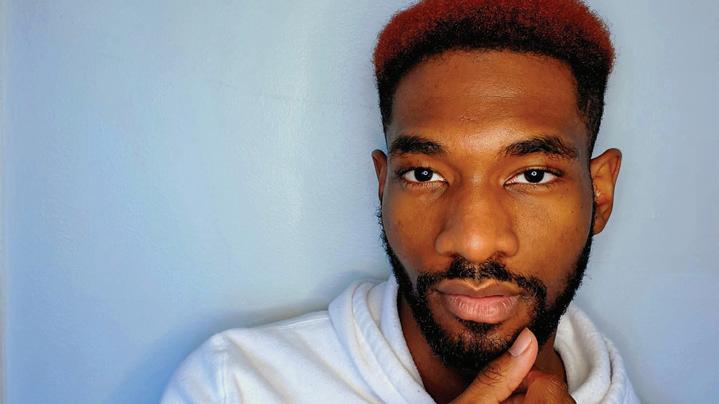
“The anthology revolutionized the way that stories were told and the things that we could
talk about,” said Joshua Miller, the 27-year-old filmmaker who released a short documentary about Beam in June. “It revolutionized how Black gay men identified and resonated with each other.”
Miller’s short film explored Beam’s life through interviews with his friends and excerpts of his writing. He’s currently working on expanding it into a longer piece that will delve deeper into who Beam is and where he was from.
“Joe’s friends continually challenged me to think of this project as the beginning of something,” Miller said. “I think it’s the beginning of the rest of my life creating these films, but also I hope it inspires a new movement for bringing these lost stories back.”
Miller decided to try his hand at uncovering Beam’s story when he realized there wasn’t much information about him online.

“I feel like it’s my duty as a member of the LBGTQ+ community to tell these stories,” Miller said. “For so long, I told myself that I’m not the right person to tell this story, something a college professor told me that’s resonated ever since was, ‘if you don’t tell it, who will?’”
Miller learned more about Beam by interviewing his close friends and colleagues, who were “so open, giving and passionate about sharing his story and continuing his legacy,” he said. Miller said the documentary “wouldn’t have happened without” Guy Weston and John Cunningham, friends of Beam who connected Miller with others who knew him.
“Anytime I doubted or felt like I was at a dead end, they were all there to support me and push
me forward,” Miller said. “That’s what Joe stood for. He stood for a community, and I want people who watch the documentary to understand community is what keeps his legacy alive.”
As Miller got to know the people who made up Beam’s community, he said they each “became like brothers” to him.
Learning about Beam gave Miller a better vocabulary for understanding his experiences as a Black queer man and “the tools to take control of the story and tell it,” he said.
“Joe was all about telling stories, creating community, but he was also all about being an active part of the revolution and doing the work you want to see done,” Miller said. “This project, and Joe himself, has taught me that I can do that too. I have the ability to create films about experiences people might be curious about. I have the ability to reach out to these people I don’t know to ask for help and can create community as well.”
Miller hopes his documentary inspires others to tell the stories of other forgotten historical figures so that people can draw strength from the fact “there have been revolutionaries in the past and there will continue to be revolutionaries,” he said.
“I want people to begin to wonder about those whose stories have been lost with time, because I think if we’re able to tell these stories, we’re able to create visibility,” Miller said. “When we’re able to create visibility, that’s the first step to changing people’s hearts and minds.”
To see Miller’s documentary, visit: jxreative. wixsite.com/formybrother/home.
PRESENTED BY
Sept. 1, 2022 15 WINDY CITY TIMES
Chicago filmmaker Joshua Miller.
Photo courtesy of Miller
Latonya Maley named executive director of A nity

The board of directors of Affinity Community Services—a Black- and queer-led organization on Chicago’s South Side dedicated to social justice in Black LGBTQ+ communities—has named Latonya Maley (she/they) as the organization’s newest executive director.

Maley follows in the footsteps of such individuals as Kim Hunt (now with AIDS Foundation Chicago’s Pride Action Tank) and Imani Rupert-Gordon (who now heads the National Center for Lesbian Rights).
Maley had been Affinity’s interim executive director for the past six month, and her duties were primarily administrative. However, she has also taken on an activist role, including participating in a June march through Lake View that aimed to call attention to social-justice issues affecting LGBTQ+ people while centering the Black trans community.
Previously, Maley was involved for several years with Howard Brown Health, including being the director of Howard Brown’s Broadway Youth Center.

Wrightwood 659




to show ‘The First Homosexuals,’ ‘Michiko Itatani’











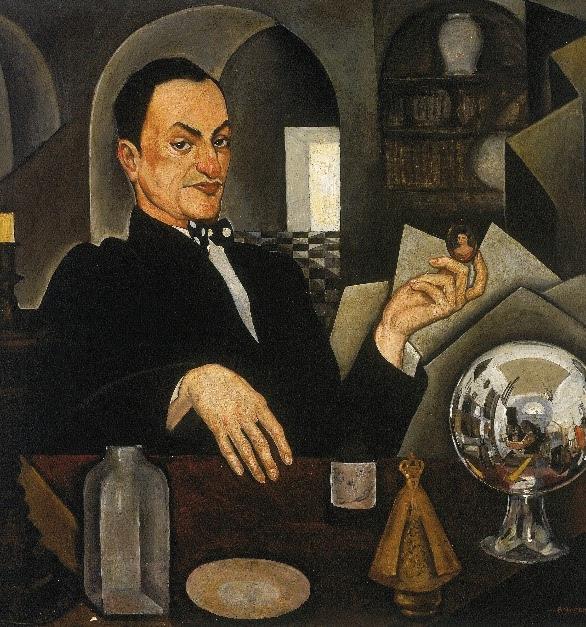
The Lincoln Park space Wrightwood 659, 659 W. Wrightwood Ave., will show two exhibits—”The First Homosexuals: Global Depictions of a New Identity, 1869-1930” and “Michiko Itatani: Celestial Stage”—on Fridays and Saturdays during Oct. 1-Dec. 17.


“The First Homosexuals” takes 1869 as its starting point; this was when the word “homosexual” was first coined in Europe, inaugurating the idea of same-sex desire as the basis for a new identity category.
On view will be more than 100 paintings, drawings, prints, photographs and film clips—drawn from public and private collections around the globe and including a number of national treasures which have never before been allowed to travel outside their countries. This groundbreaking exhibition offers the first multi-medium survey of the very first self-consciously queer art, exploring what the “first homosexuals” understood themselves to be, how dominant culture, in turn, understood them, and how the codes of representation they employed offer us previously unknown glimpses into the social and cultural meanings of same-sex desire.
“The First Homosexuals” is being organized in two parts, due to COVID-related delays, with part one opening Oct. 1 with approximately 100 works, and on view only at Wrightwood 659. Three years from now, in 2025, 250 masterworks will be gathered at Wrightwood 659 for part two of “The First Homosexuals” in an exhibition that will travel internationally and be accompanied by a comprehensive catalog.
The exhibition is being developed by a team of 23 international scholars led by art historian and University of Pennsylvania Professor of Practice in the History of Art and Gender, Sexuality and Women’s Studies Jonathan D. Katz, with associate curator Johnny Willis.


“Michiko Itatani” celebrates the work of Chicago-based U.S. artist Michiko Itatani (b. 1948, in Osaka, Japan) who has grappled with the mysteries of the universe in her work throughout her prolific career.
Professor emeritus at the School of the Art
Institute of Chicago, where she taught for 40 years, Itatani is represented in the permanent collections of public museums around the world, including the Art Institute of Chicago, Illinois; Barcelona Museum of Contemporary Art (MACBA), Spain; National Museum of Modern and Contemporary Art, Seoul, Korea; Olympic Museum, Lausanne, Switzerland; and the U.S. Embassy Brasilia, Brazil, among many others.

Wrightwood 659 is open Fridays at 12-7 p.m. and Saturdays at 10 a.m.-5 p.m.
NOTE: Visitors will be required to show proof of vaccination and booster prior to admission to Wrightwood 659. Masks will continue to be required throughout the gallery; see wrightwood659.org/terms-and-conditions/health-safety/ .
Tickets for the exhibition will be $15 and available online only, beginning September 8, at tickets.wrightwood659.org/events. Please note that admission is by advance ticket only. Walk-ups are not permitted.
‘The First Homosexuals” item “Retrato de un anticuario o Retrato de Chucho Reyes y autorretrato,” by Roberto Montenegro (1887-1968), Colección Pérez Simón, Mexico, © Arturo Piera.
Sept. 1, 2022 16 WINDY CITY TIMES
Affinity Executive Director Latonya Maley. Photo courtesy of Affinity
SOMETHING READER FOR EVERYONE! store.chicagoreader.com Architecturally stunning home in beautiful Ravenswood Manor. A wonderful combination of modern updates and vintage features. Relax in the steam shower or Jacuzzi or cook a gourmet meal in the updated kitchen. Huge home for entertaining and parties. Look at more pictures on Realtor.com for 2954 W. Sunnyside. Asking $1.2M Jurgen Frank, Kale Realty
773-771-3547 jfrank@kalerealty.com
Pride Journey: Orlando
BY JOEY AMATO
Orlando has always been a place close to my heart. Back in 2002, I attended graduate school there as well as worked in the music industry for a company that launched the careers of Backstreet Boys, *NSYNC, O-Town and other stars. I even managed a boy band of my own around that time. Needless to say, I really enjoyed living in Orlando. It was also the place where I finally admitted to myself that I was gay, although I didn’t officially come out to my family until a few years later.
When I heard U.S. Travel’s IPW convention was going to take place in Orlando this year, I knew I had to go.
I stayed at the Hyatt Regency Grand Cypress, which is perfectly situated within minutes of Walt Disney World parks and just a short drive from Universal Studios. The property is massive and contains a separate fitness building, resort-style pool with bar and live music as well as a convention area.
Epcot was always my favorite park to visit as a child, so I was excited to learn that one of the main events for the conference would take place there. We got to experience the park without the crowds, which was quite pleasant, especially

when it came to the newer rides Frozen Ever After and Guardians of the Galaxy: Cosmic Rewind. Seeing the iconic globe lit up at night is as magical now as it was when I was a younger.
Ironically, the conference coincided with One Magical Weekend, so I also had the opportunity to visit two LGBTQ parties while there, the first being the annual Red party at House of Blues and the second being OMW’s Therapy pool party at Sheraton Lake Buena Vista Resort. People from around the country travel to Orlando for this event, so I ran into many friends during that weekend, some of which I hadn’t seen in years.
My visit wasn’t all fun and games though. I think we all remember where we were when we heard the news of the Pulse massacre back on June 12, 2016. A few years ago, the owner of the club opened an interim memorial with a goal of raising the funds to open a permanent space which would pay homage to the forty-nine beautiful souls lost that day. Located at the site of the original club, the current memorial contains an offering wall where visitors can leave flowers or mementos.
There are three viewing areas of the building. Visitors will be able to see the waterfall at the entrance of the club, a wall of the building where the forty-nine names are inscribed, as well as the
area where people were rescued by from the restrooms by first responders.
The memorial also has a Ribbon Wall of Photographs, filled with pictures of the community and the world’s response of love and support and artifacts collected from the Orange County History Center. It’s a very emotional experience but one you need to do if you’re ever in the area.
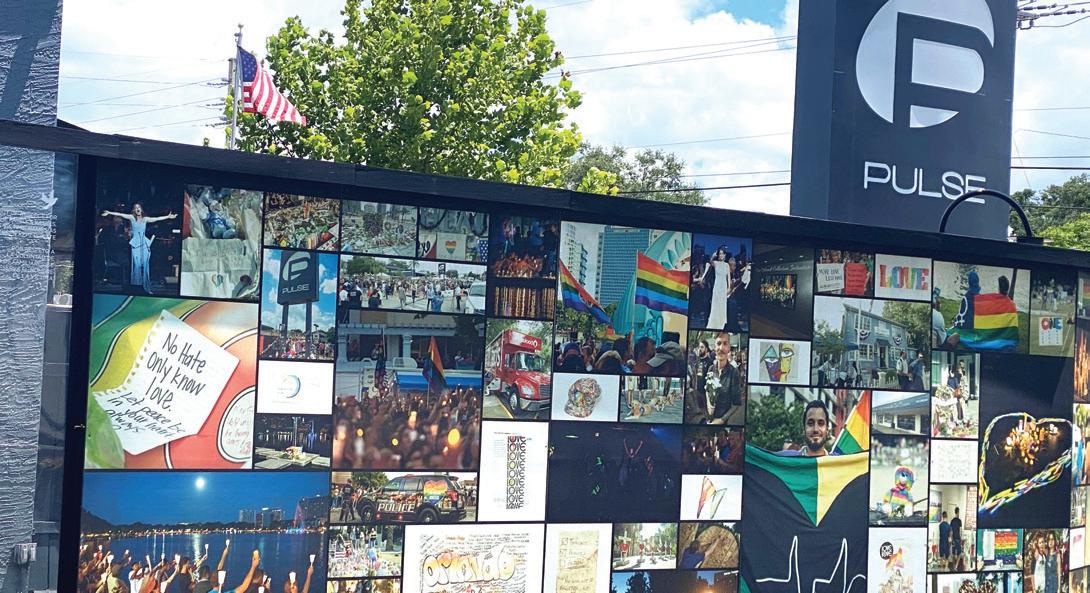
A few miles away is the new Hall at the Yard development, an upscale food hall venue. One of the highlights is a restaurant called The Chef & I, which is owned by my friends Erica and Chris Rains from Nashville. Every time I visited their restaurant, I knew I was about to experience something special. The Chef & I is one of my favorite restaurants in Nashville and I’m sure it will be a hit with the Orlando community. The restaurant throws a delicious brunch, featuring menu items like Duck and Waffles, Brined and Smoked Salmon Benedict as well as their Hot Salt Chicken.
People often forget that Orlando isn’t just theme parks. There are many beautiful towns in the metro area that are worth visiting. Antique collectors will really enjoy the charm of Mount Dora, while Dr. Phillips has emerged as a culinary epicenter boasting a variety of fine dining restaurants.
However, my favorite neighborhood to visit is Winter Park and more specifically, Park Avenue. The cobblestone street is lined with wonderful boutiques, outdoor cafes and is adjacent to Rollins College, my alma matter. Located in Winter Park, The Charles Hosmer Morse Museum of American Art is home to the world’s most comprehensive collection of works by Louis Comfort Tiffany. The Museum’s Tiffany collection includes jewelry, pottery, paintings, art glass, leaded-glass windows and lamps, and the chapel interior the artist designed for the 1893 World’s Columbian Exposition in Chicago.
Orlando is known for having a wonderful LGBTQ scene. One of my preferred low-key places to enjoy a cocktail is Savoy, located just north of downtown. Every time I visit, I usually end up there with friends. Some other popular spots include Stonewall Bar Orlando and Southern Nights.
Orlando Pride is also one of the largest pride events in the state. This October, Coming Out With Pride will take place on Saturday, October 15 at Lake Eola Park in downtown, and will be surrounded by a host of other events throughout the week leading up to the festival. While downtown, try to catch a show at the Dr. Phillips Center for the Performing Arts. The sparkly new building hosts a variety of touring Broadway shows as well as performances from major artists in addition to Orlando’s many local performing arts organizations.
The next time you visit Orlando, I would encourage you to venture outside of the amusement park areas to get to experience the city. I met so many wonderful people when I lived there, so I would love for you to get to know the locals the way I did.
Enjoy the Journey!
Sept. 1, 2022 17 WINDY CITY TIMES
TRAVEL
Joey (center) with some fancy friends at Epcot.. Photo courtesy of Joey Amato
Pride Journey: Provincetown
now in its 76th year in business, brings guests through the rolling dunes to various picturesque vantage points.

Spend the afternoon strolling around the town and exploring the dozens of boutiques and art galleries along Commercial Street. A bit further away is the Provincetown Art Association & Museum, a space housing a collection of works by artists from the Cape. The organization was originally established in 1914 so it’s a great place to learn about the cultural history of this destination.
If you are in the mood for some exercise, journey to the top of The Pilgrim Monument, a 252foot structure built to commemorate the Pilgrims’ first landing. Since many of the properties in the town don’t offer fitness centers on property, visitors can purchase a day pass and workout with the locals at Mussel Beach Health Club or Provincetown Gym.
P-Town is home to under 4,000 full-time residents, however this number swells to over 60,000 during the peak summer months. If you aren’t a fan of huge crowds, I would recommend visiting during the shoulder season. This may also be a more budget-friendly time to travel as daily room prices tend to decrease.
BY JOEY AMATO
I think it’s safe to say that I found my new happy place. I had visited Provincetown, Massachusetts once before during the winter season and even then, I enjoyed my time there. Of course, P-Town is much slower during the colder months than it was during my most recent visit, but I still enjoyed the small-town charm of this iconic coastal destination.
Provincetown is one of the most LGBTQ-friendly destinations in the country, if not the world. From the moment you arrive by ferry or by car, you are quickly transported into a rainbow oasis which makes it seems as if you are on an island where you are free to express yourself in any way you please.
As soon as I stepped foot off the Bay State Cruise Company ferry from Boston, I checked in to the Foxberry Inn, a beautiful property located less than a mile from the heart of P-Town. Most of the destination is walkable, but biking is also common if you prefer. The staff at Foxberry Inn was lovely and quite attractive, which is always an added bonus. My corner room came complete with a water view as well as a separate seating area and balcony to enjoy some morning coffee. Each morning the staff prepared a delicious hot breakfast, which is included in the price of
the room. The breakfast burrito was definitely my favorite and possibly one of the best I’ve ever had in recent memory. Every afternoon, guests are welcome to enjoy freshly baked cookies and a hot beverage if they desire in the common area.
One of Provincetown’s most famous attractions is not a physical attraction; it’s a dance. More specifically, a tea-dance. The concept of a tea-dance began in New York in the 1960s. Gay men would meet at off-the-beaten path locations around New York City on a Sunday afternoon and enjoy tea, as it was illegal to serve alcohol to people known to be gay. How times have changed!
These tea-dances quickly spread around the country and today, the weekly tea-dances held at Boatslip Resort have become legendary. The waterfront property features a large outdoor deck plus an indoor section with multiple bars and plenty of room for dancing. The drinks are a bit more expensive than I am used to coming from the Midwest, but the pours were heavy, so it balanced out. My guest Michael and I sipped our cocktails while grooving to the sounds of Sylvester, Donna Summer, and Chic. The people watching alone was worth the visit.

After the dance, walk over to Liz’s Café, just a few blocks away. The quaint restaurant gives off an island resort vibe and the food didn’t dis-
appoint either. We both began our meal with the ceviche containing a variety of fresh fish served with homemade tortilla chips and followed that up with the pan seared cod prepared in a mouthwatering broth.
If you are in the mood for some after dinner drinks and entertainment, head to Provincetown Brewery Co. or the Post Office Café & Cabaret for the Anita Cocktail Variety Hour. Hosted of course by non-other than Anita Cocktail, the hour-long show also features performances by cast members Jona Williams, Abby Cummings, and Raquel Blake. My favorite part of the show was when Anita Cocktail sang live, something I rarely see drag performers do.
Keep the party going at Atlantic House, or A-House as the locals call it. This is the only dance club which operates for the entire year as some establishments shut down during the winter months. The complex consists of different rooms including Little Bar, The Macho Bar, Provincetown’s original leather bar as well as the Big Room where people go to dance.
Wake up early the next morning and head to Boy Beach, which is located close to the Foxberry Inn or jump on Art’s Dune Tours to explore the Cape Cod National Seashore. Access to this area is seasonal and only authorized vehicles are allowed to operate in the park. The company,
For your final dinner in Provincetown, go to Café Heaven and begin your meal with their delicious Lobstertini made with lobster salad served atop an avocado and tomato salad tossed in a citrus vinaigrette. This was one of my favorite culinary treats of this vacation as the vinaigrette complimented the sweetness of the lobster perfectly. Michael and I decided to share the Provincetown Bouillabaisse for our main entrée. It tasted similar to a classic bouillabaisse, with the exception of linguica which is a nod to P-Town’s Portuguese heritage.
Provincetown is an all-in-one destination, meaning there is something for everyone. Whether you choose to party or just relax on the beach, you will find your tribe in P-Town.
Enjoy the Journey!
Sept. 1, 2022 18 WINDY CITY TIMES
TRAVEL
Provincetown Bouillabaisse at Café Heaven.
Photo by Joey Amato
Provincetown’s Foxberry Inn.
Photo by Joey Amato















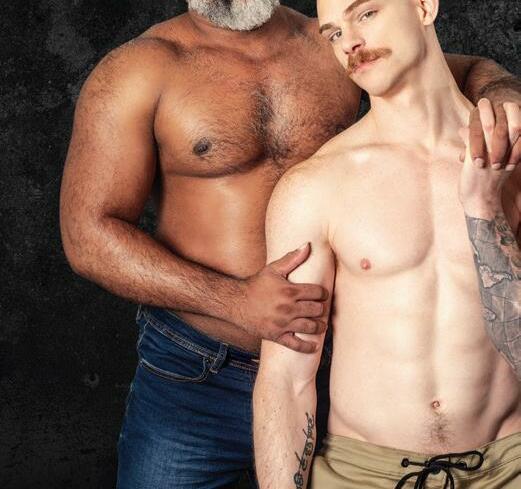













Sept. 1, 2022 19 WINDY CITY TIMES 10 DAYS FREE FUN FOR EVERY NEW GUY Hosting. We’re Come Over to Squirt.org and Join the Action.
A revealing look at same-sex desire. The word “homosexual” was coined in Europe in 1869—unleashing stunning depictions of same-sex desire in the visual arts world. Discover how artists across five continents expressed queer identity in this pioneering survey of paintings, drawings, prints, photographs, film clips, and many national treasures—from public and private collections around the globe.

20 WINDY CITY TIMES ONLY AT WRIGHTWOOD 659 OCT 1 – DEC 17, 2022 wrightwood659.org
SUPPORT FOR THIS EXHIBITION IS PROVIDED BY ALPHAWOOD FOUNDATION CHICAGO PLEASE NOTE: This exhibition contains sexually explicit content. For mature audiences only. IMAGE CREDIT: Owe Zerge (1894 — 1983, Sweden), Model Act 1919, Oil on canvas, 135 x 50 cm. Private Collection. (Detail) THE FIRST 1869-1930 GLOBAL DEPICTIONS OF A NEW IDENTITY











 CPD officer and mayoral candidate Frederick Collins has over 40 misconduct complaints in his record.
CPD officer and mayoral candidate Frederick Collins has over 40 misconduct complaints in his record.














 By ISA GIALLORENZO
By ISA GIALLORENZO











 By MIKE SULA
By MIKE SULA





 By Jacob Saenz
By Jacob Saenz



























 By KELLY GARCIA
By KELLY GARCIA


 By AARON COHEN
By AARON COHEN








 @aaroncohenwords
@aaroncohenwords





 ByNature’sGraceandWellness’AliaReichert
ByNature’sGraceandWellness’AliaReichert


































































































































 By BILL MEYER
By BILL MEYER











































































 —JAMIE LUDWIG
—JAMIE LUDWIG



































































































































































 BY MATT SIMONETTE
BY MATT SIMONETTE















 BY LYNN NOTTAGE | DIRECTED BY KATE WHORISKEY
BY LYNN NOTTAGE | DIRECTED BY KATE WHORISKEY





































 BY KAYLEIGH PADAR
BY KAYLEIGH PADAR




 BY CARRIE MAXWELL
BY CARRIE MAXWELL



















































